Médecins Sans Frontières Australia


Médecins Sans Frontières Australia

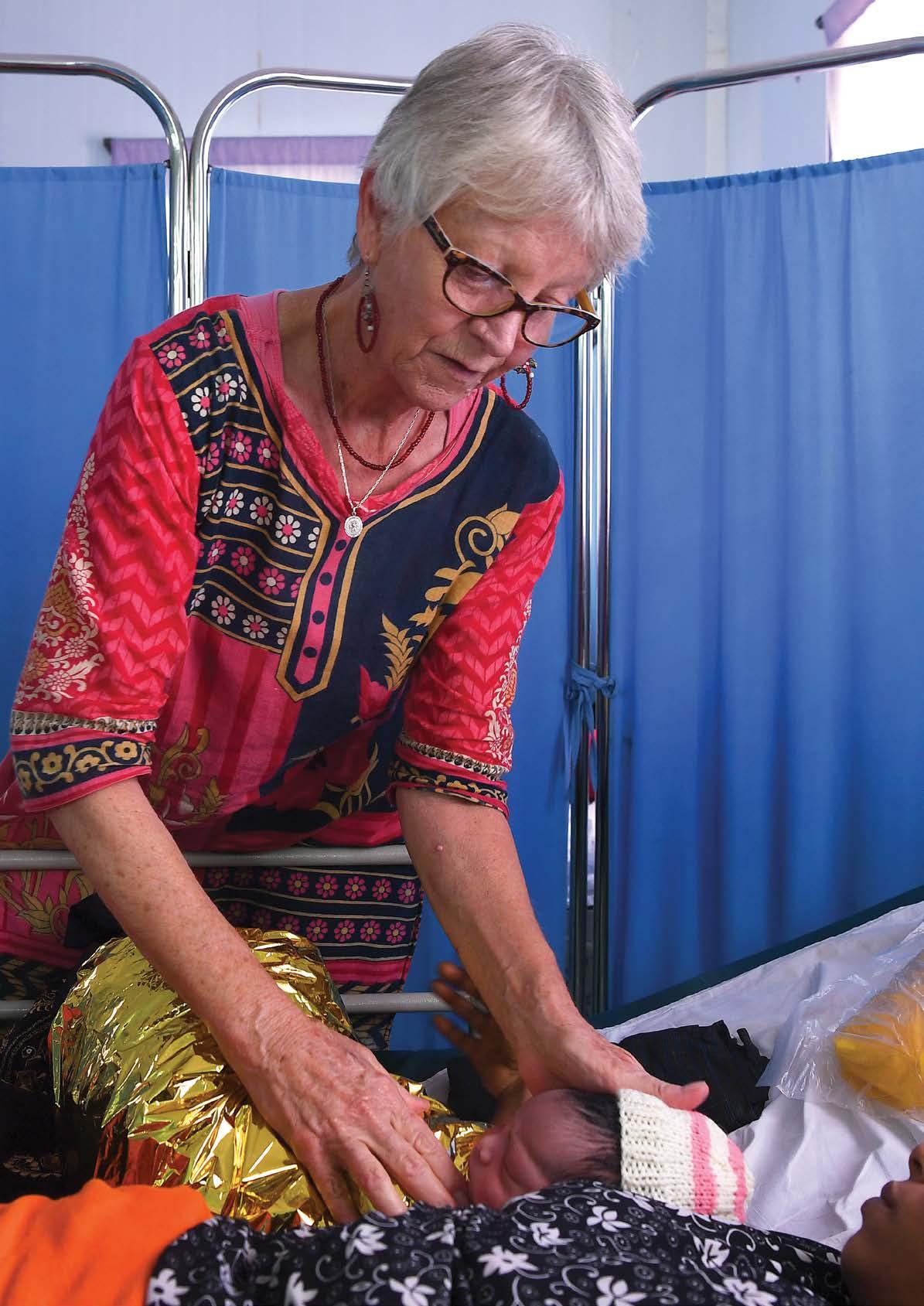
Médecins Sans Frontières is a private international association. The association is made up mainly of doctors and health sector workers and is also open to all other professions which might help in achieving its aims. All of its members agree to honour the following principles:
Médecins Sans Frontières provides assistance to populations in distress, to victims of natural or man-made disasters and to victims of armed conflict. They do so irrespective of race, religion, creed or political convictions.
Médecins Sans Frontières observes neutrality and impartiality in the name of universal medical ethics and the right to humanitarian assistance and demands full and unhindered freedom in the exercise of its functions.
Members undertake to respect their professional code of ethics and to maintain complete independence from all political, economic or religious powers.
As volunteers, members understand the risks and dangers of the missions they carry out and make no claim for themselves or their assigns for any form of compensation other than that which the association might be able to afford them.
At the beginning of 2019, I travelled to Cox’s Bazar, Bangladesh, where hundreds of thousands of Rohingya people remain in limbo in dense and cramped living conditions, with little available clean drinking water and the constant threat of disease outbreaks.
When moving through the refugee camps, it is hard to imagine the extreme violence that these people fled in Myanmar. Expertly-built shelters now spread out as far as the eye can see, and the paths between the settlements are full of people going about their daily business: mothers and fathers finding necessities for their families; kids going to school or kicking a ball around.
But my visit was 18 months after the first wave of refugees sought safety in these settlements, and the trauma of the Rohingya’s displacement continues to this day. These are people who can’t go back. They remain stuck in emergency-like conditions – and extremely vulnerable to serious health risks.
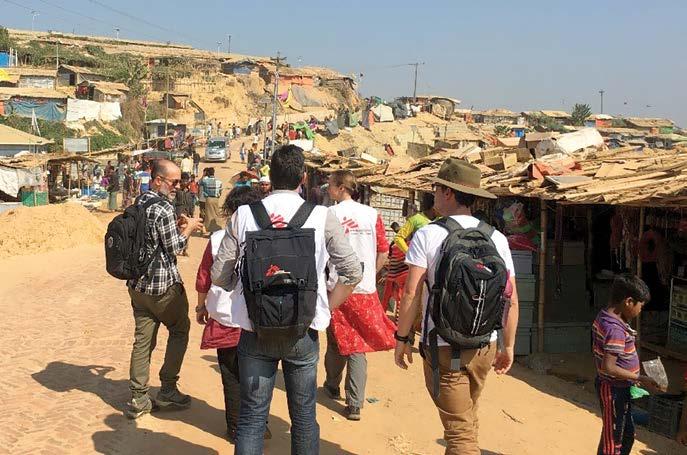
In 2018, as media attention on the continued plight of Rohingya people subsided, providing medical aid to
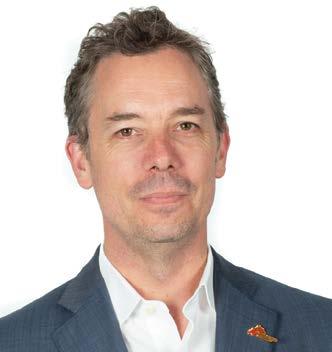
this population remained a priority for Médecins Sans Frontières. Our teams on the ground in Cox’s Bazar continued to witness a high number of cases of vaccine-preventable diseases like diphtheria and measles. Even chickenpox, which in Australia and New Zealand is easily treated, can cause life-threatening complications for people living in the environment of the camps – especially children. Our teams also saw many patients with respiratory conditions like chronic obstructive pulmonary disease, aggravated by the dusty conditions in the camps during the dry season.
We ran three outpatient clinics and a 40-bed hospital to provide urgent medical aid for the Rohingya throughout the year, with an average of more than 14,000 general consultations each month, and ongoing treatment for mental health and non-communicable diseases as well as emergency care. We cannot operate in isolation, and so a key focus of our presence in Cox’s Bazar has been fostering trust with the local community. In 2018, our local Bangladeshi and Rohingya staff were instrumental in delivering care to their communities; and our staff worked sideby-side with traditional birth attendants to encourage Rohingya women to give birth in the hospital and not at home.
A team including Médecins Sans Frontières Australia President Dr Stewart Condon visit a section of the refugee camps in Cox’s Bazar, Bangladesh, where around one million Rohingya people have sought safety. © Sean Brokenshire/MSF Dr Stewart Condon President Médecins Sans Frontières Australia © MSFIn Bangladesh, as in the many emergency contexts of displacement, epidemics and natural disaster around the world highlighted in this Annual Impact Report, our operations in the field received critical support from the Médecins Sans Frontières Australia Board in 2018.
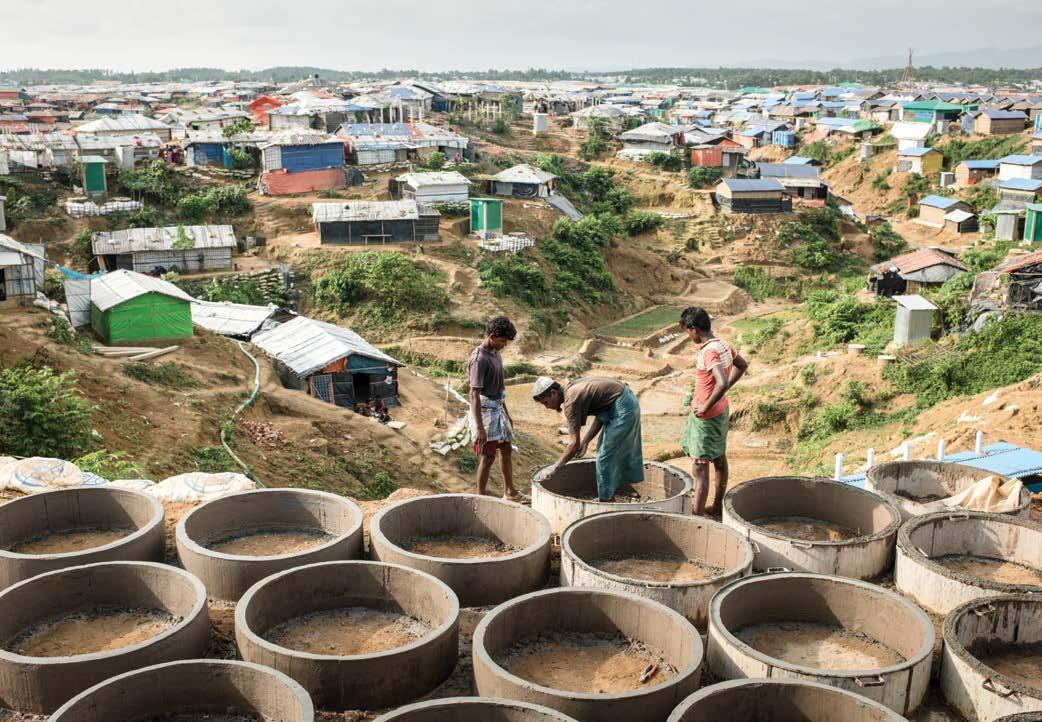
Our Médecins Sans Frontières Australia Board of Directors share extensive field experience between them, with nearly all being returned field workers. Our Board brings other expertise too: in health, governance, management, law, business and work in the public and private sectors. And each year, the Board is supported by our committees in finance and risk, branding and marketing, operations and governance, and associative matters, to aid us in prioritising our duty of care to both our patients and field workers.
In 2018, we worked closely with the Executive Team to build a long-term vision for the next decade of Médecins Sans Frontières Australia and Médecins Sans
Frontières New Zealand. How can we bring operational decision makers closer to the field? How can we act more effectively in the Asia-Pacific region? And, how can we encourage Médecins Sans Frontières to evolve so that it can continue to deliver quality medical care for our patients? This vision will guide the Executive in development of Médecins Sans Frontières Australia’s next strategic plan.
Also in 2018, the Board established a fully functioning New Zealand Trust structure, actioned through our three New Zealand Trustees who are appointed by the Board and steward our successful fundraising efforts in New Zealand on behalf of the movement. The establishment of the Trust reflects the strong support in New Zealand for our work and offers our New Zealand supporters tax-deductible donations and more personalised communication.
Another focus for the Board was ensuring that we support and develop the skills of our staff and volunteers, whether they are working in the field or in our office in Sydney. Throughout the year, the Board
worked to provide a safe and inclusive work environment for our staff, and to ensure that the Médecins Sans Frontières movement is best equipped to rise to the continuing challenges of delivering high quality medical humanitarian aid to people in need, wherever they may be.
While the Rohingya community in Bangladesh continues to face an uncertain future, I am encouraged by the impressive work of our teams to support these people – to both save and improve the lives of those who are suffering. To you, our supporters, I express a sincere thank you for your unwavering generosity. With your confidence, our delivery of the best quality care for our patients continues to be made possible.
Dr Stewart Condon President Médecins Sans Frontières Australia A view over the refugee settlements in Cox’s Bazar, Bangladesh. © Robin Hammond/MSFThrough the exceptional generosity of our supporters, including our field partners and major donors, our fundraising activities generated a total of $86.6 million in 2018. I would again like to thank our valued supporters for the immense trust you place in Médecins Sans Frontières each year. As you know, we face extreme challenges in securing access to our patients, which we make every effort to overcome. Sometimes we are blocked by political agendas, as we have seen in our efforts to reach refugees fleeing from violence; or must overcome warfare that is directed at our patients, healthcare workers and hospitals. But, thanks to the financial independence you give us, we can act quickly and with purpose. Your support means we can evolve and adapt our tactics to find ways to provide emergency medicine to those most in need.
I would like to share some highlights of what we have been able to achieve in 2018.
In 2018, our Field Human Resources department supported Australian and New Zealand field workers to fill a total of 212 field positions in 39 countries, including in some of the world’s most severe humanitarian crises. Most of our field staff worked in Iraq, Bangladesh, Syria, South Sudan, Afghanistan and Nigeria.
The experts in the Sydney Medical Unit (see message, page 8) worked in close partnership with staff in the field and colleagues from the Operational Centre Paris group to support high quality and innovative treatment for our patients across women’s health, paediatric and neonatal care and sexual violence care projects. In 2018, our medical experts conducted 27 field visits to provide
technical expertise in Bangladesh, the Central African Republic, Chad, Iraq, Ivory Coast, Kenya, Lebanon, Liberia, Mali, Malawi, Niger, Nigeria, Uganda and Yemen.
In 2018, our Communications department supported 107 speaking engagements, facilitated 161 external media interviews and produced approximately 90 original stories highlighting our field workers and patients. We had more than 839,000 visits to our website. On International Women’s Day, we highlighted Médecins Sans Frontières’ work to provide urgent care for displaced women and girls who, having been forced to flee their homes, face significant health challenges. In October, following the Nauruan government’s decision to cease our provision of mental healthcare on Nauru, we held a widelyreported press conference calling for the immediate evacuation of refugees and asylum seekers from the island.
In 2018, the focus of the Advocacy and Public Affairs team remained on supporting Médecins Sans Frontières operations on Nauru, and more broadly, on the global forced migration crisis. Our Nauru report Indefinite Despair, published in December 2018, described how suicide attempts are an expected consequence of indefinite processing, detailing that 30 per cent of our patients had attempted suicide. We began engagement with the Australian government on the impact of snakebite, and oversaw management of the international Speaking Out Case Studies project, which documents historical humanitarian emergencies where Médecins Sans Frontières spoke out on behalf of our patients.
Finance continued to drive efficiencies and in particular, made improvements to our New Zealand processes. The Information Technology team expanded to better support the growth and increasing complexity of our business and continued to improve and update our service
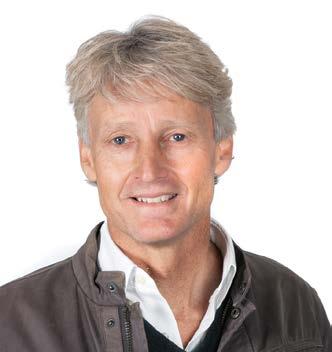 Paul McPhun Executive Director
Médecins Sans Frontières Australia Médecins Sans Frontières New Zealand © MSF
Paul McPhun Executive Director
Médecins Sans Frontières Australia Médecins Sans Frontières New Zealand © MSF
offering. As our supporter base continued to grow, including through our second year of fundraising activities in New Zealand, our Supporter Relations team focused on improving the field partner and supporter experience. This included enhanced support for donors reporting concerns of scams or fraud.
In 2018, Domestic Human Resources focused on the development of the Organisational Leadership Strategy, with the aim of building leadership capacity across the organisation. This was further supported by the decision to complete a Diversity and Inclusion audit to identify our strengths and weaknesses and enable us to create and retain a working environment that not only welcomes
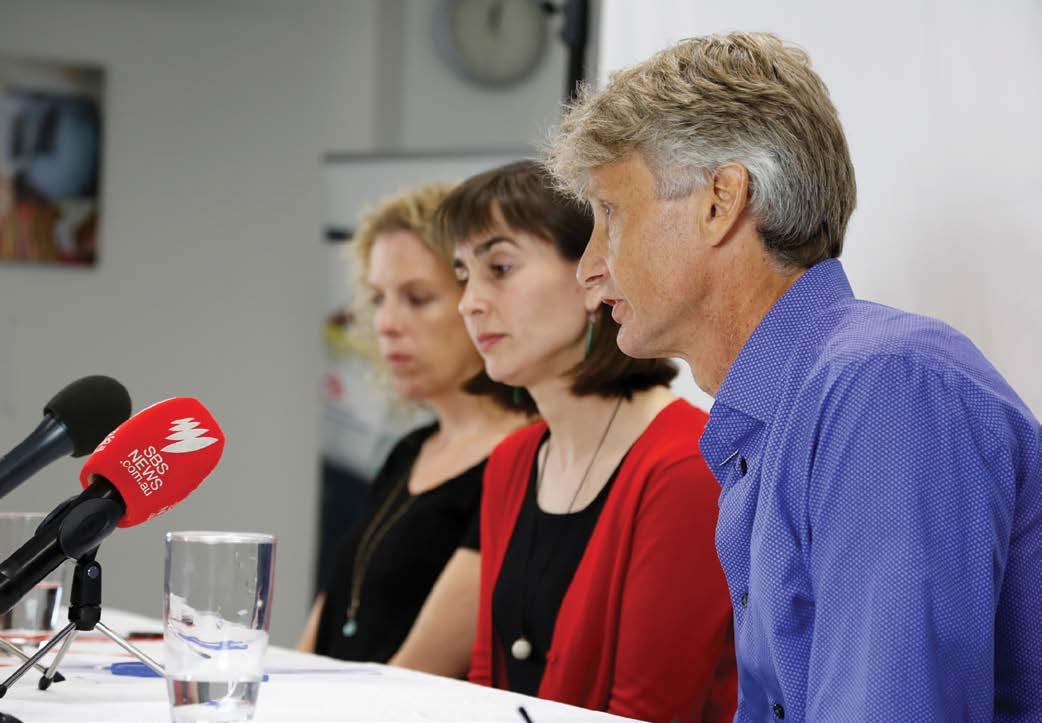
diversity, but also breaks down barriers to inclusion at all levels.
Médecins Sans Frontières Australia is a strong contributor across the Médecins Sans Frontières movement. In partnership with our offices in Tokyo and Hong Kong, in 2018 we completed assessments in Thailand, the Philippines, Indonesia and Malaysia. A related fundraising, recruitment and operations support plan was also completed and will be rolled out in 2019 to build on our presence within the South East and East Asia Pacific region.
I feel extremely privileged to have worked with Médecins Sans Frontières in this role since 2010. I have come to know so many
of you over the years, and as I step down in December 2019, I will deeply miss the opportunities to discuss and debate our humanitarian action together. On behalf of Médecins Sans Frontières, I remain deeply grateful for your commitment and support. I am confident that my successor will continue this wonderful partnership on behalf of our patients. I sincerely hope this partnership will continue for many years to come.
Paul McPhun Executive Director Médecins Sans Frontières Australia Médecins Sans Frontières New ZealandIn 2018, the Médecins Sans Frontières Australia Medical Unit focused on supporting sustainable improvements in patient care across women’s health, paediatrics, neonatal care and sexual violence care.
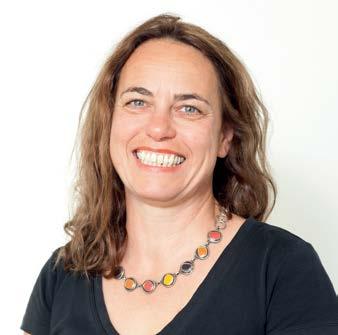
High quality of care means providing medical care to patients in a way that is safe, effective and patient-centred; using the right medication and adhering to guidelines and protocols. It is not only about reducing deaths – but crucially, respect for the human being.
In 2018, the Sydney-based Medical Unit supported sustainable improvements in care for women in Jahun, Nigeria, and Dasht-e-Barchi, Afghanistan. In our maternity ward in Jahun, where we see a high number of women with birthing complications, we developed a checklist system in collaboration with the field team to improve continuity of care for patients from the delivery room to post-delivery care, including counselling and education.
In Dasht-e-Barchi, we supported staff in the field to assess the appropriateness of caesarean sections by using the World Health Organization’s Robson classification tool to improve outcomes for both women and babies. Through enabling
47,783 BIRTHS assisted
1,172 WOMEN provided with safe abortions
75,358 CHILDREN
8,537 SURVIVORS of sexual violence treated
10,929 NEWBORNS received hospital care
teams to take ownership of these systems, and supporting women to make informed decisions about delivery, we are working towards providing treatment that is truly patient-centred.
With a significant focus on safe abortion care to prevent maternal mortality and suffering from unsafe abortion, we also achieved major improvements in access to termination of pregnancy and contraception for women in our projects.
As a major global public health challenge, cancer demands the development of new medical solutions, including in the regions where Médecins Sans Frontières works. In 2018 we opened two oncology projects in Malawi and Mali, focusing on prevention, early detection and treatment. In Chiradzulu and Blantyre in Malawi, we began screening for cervical cancer by visual inspection with acetic acid (VIA) and treatment by thermo-ablation of pre-cancerous lesions.
42,911 CHILDREN treated for malnourishment
233 MEDICAL STAFF TRAINED in paediatric emergency and neonatal care
In projects supported by the Médecins Sans Frontières Australia Medical Unit Dr Myrto Schaefer Head of Medical Unit Médecins Sans Frontières Australia © Meredith SchofieldIn Bamako, Mali, we provided palliative and support care for women with cancer – primarily breast and cervical cancer – and in 2019, we will continue to focus on improving palliative care protocols in collaboration with other organisations present in Bamako.
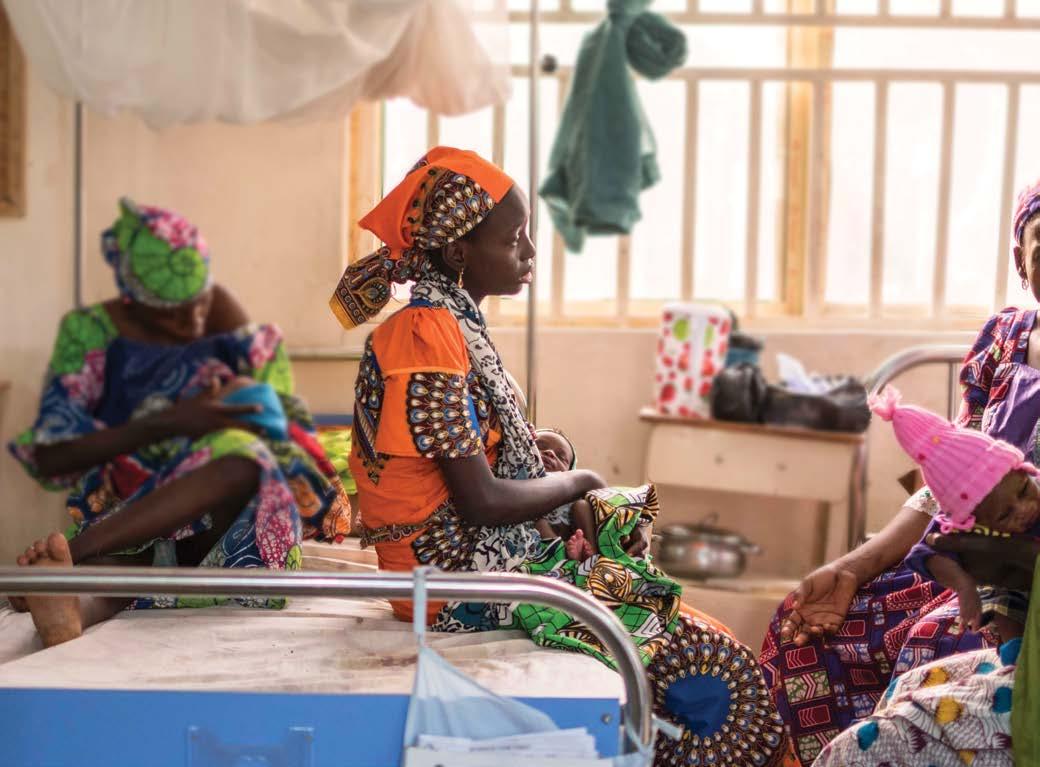
In 2018, the Medical Unit guided innovative improvements to child and newborn care. In Chad, we introduced ‘E-care’, a tablet-based system used in paediatric primary health consultations for children under five years old. The tool provides health workers with feedback to inform ongoing training and improvement of quality of care.
In Liberia, we used ‘Bubble Continuous Positive Airway Pressure’ (a non-invasive ventilation tool usually used in neonatal care) for children with severe respiratory
infections, achieving a reduction in the fatality rate from this condition.
We also developed our provision of care for critically sick children in Zahle, Lebanon, providing 58 patients with high-quality clinical care and psychosocial care for thalassemia, a hereditary blood disease.
In 2018, we initiated an early response to sexual violence in two emergency projects, in Kwanglai, Uganda, and for Rohingya refugees in Cox’s Bazar, Bangladesh. We also achieved improved integration of care for survivors, into other general and women’s health projects. Care given to survivors in any context involves both a medical and psychological component. Going forward, it is clear that more proactive community engagement is needed to encourage people to seek our care.
We continued to develop neonatal and paediatric-specific tools to improve the standard of care in our hospitals, alongside the opening of a new position of Paediatric Nursing Advisor. While we continue to work to reduce neonatal mortality, in 2018 there was increased recognition of the need to develop palliative and comfort care to improve quality of life for newborns with poor prognoses, such as babies with severe perinatal asphyxia or severe congenital anomalies.
Dr Myrto Schaefer Head of Medical Unit Médecins Sans Frontières AustraliaAFGHANISTAN
Rachael Auty nurse
Prue Coakley head of mission
Janet Coleman midwife
Jeffrey Fischer logistician - construction
Megan Graham administration-finance coordinator
Anne Hoddle paediatrician
Siry Ibrahim head of mission
Vivegan Jayaretnam logistician - general
Rodney Miller field coordinator
Carmel Morsi nurse
Allen Murphy field coordinator
Carol Nagy medical coordinator
Amanda Patterson logistics coordinator
Shannon Price medical doctor
Miho Saito midwife
Geeta Sales obstetrician-gynaecologist
Helmut Schoengen anaesthetist
Loren Shirley pharmacist
Louise Timbs nurse
Jeanne Vidal logistics team leader
Sofie Yelavich medical doctor
BANGLADESH
Rob Baker logistician - construction
Rodolphe Brauner logistics team leader
Susie Broughton medical doctor
Kerryn Chatham medical doctor
Jody Clouten logistics team leader
Prue Coakley field coordinator
Ben Collard logistics team leader
Tanya Coombes human resources officerregional
Liam Correy nurse
Lindsay Croghan logistician - general
Stephanie Davies human resources officerregional
Andrew Dimitri medical doctor
Mee Moi Edgar administration-finance coordinator
Kate Edmonds midwife
Megan Graham administration-finance coordinator
Toby Gwynne nurse
Jane Hancock nurse
Freya Hogarth nurse
Shelah Johnston mental health coordinator
Jacqui Jones midwife
Angela Keating human resources officerregional
Emer McCarthy nurse
Linda Pearson head of mission
Steven Purbrick field coordinator
Kerrie-Lee Robertson administration-finance coordinator
Rosanna Sanderson logistics team leader
Hema Shankar medical doctor
Peter Sheridan logistician - construction
Sam Templeman medical coordinator
Jessie Watson human resources officerregional
Nicholas Watt logistics team leader
CAMBODIA
Jennifer Craig logistician - general, field coordinator
Daniel O’Keefe field administrator
Helen Tindall nurse
Rachel Sun pharmacist
Ivan Thompson surgeon
CENTRAL AFRICAN REPUBLIC
Rob Baker logistician - construction
Rodolphe Brauner logistics team leader
Hugo De Vries logistician - general
Christopher Lack anaesthetist
Stephanie Sarta logistics team leader
DEMOCRATIC REPUBLIC OF CONGO
Patrick Brown logistcian - water and sanitation
Rose Burns medical doctor
Louisa Cormack logistics team leader
Jezra Goeldi logistics team leader
Marina Guertin medical doctor
Lisa Searle medical doctor
Saschveen Singh medical doctor
Paras Valeh epidemiologist
EGYPT
Alexandra Rodwell psychologist
ETHIOPIA
Anne Gilmour medical doctor
Matthew Gosney human resources officerregional
Malcolm Hugo mental health coordinator
Rodney Miller field coordinator
Linda Pearson field coordinator
Steven Purbrick field coordinator
Prudence Wheelwright midwife
GEORGIA
Vino Ramasamy administration-finance coordinator
HAITI
Victoria White surgeon
INDIA
Stobdan Kalon medical coordinator
Parul Kashyap human resources officer
IRAQ
Graham Baker logistics team leader
Kelly Banz medical doctor
Kirsten Bond medical doctor
Susan Bucknell logistics team leader
Jennifer Duncombe field coordinator
Geraldine Dyer psychiatrist
Katherine Franklin paediatrician
Debra Hall midwife
Anna Haskovec logistics team leader
Shanti Hegde obstetrician-gynaecologist
Kimberley Hikaka logistics team leader
Penelope Isherwood obstetrician-gynaecologist
Field workers from Australia and New Zealand filled 212 field roles in 2018, contributing to an international workforce of more than 47,000 people.
Anna Jenkins
mental health coordinator
William Johnson logistician - electrician
Neville Kelly logistics team leader
Farida Khawaja medical doctor
Claire Manera head of mission
Alison Moebus nurse
Sacha Myers communications officer
Amy Neilson medical doctor
Emma Parker medical doctor
Irina Petrova mental health coordinator
Vino Ramasamy human resources officerregional
Simon Roberts anaesthetist
Kiera Sargeant medical doctor
Amelia Shanahan midwife
Ben Shearman logistics team leader
Erica Spry
mental health coordinator
Elisha Swift midwife
David Whitehead logistics team leader
Grace Yoo pharmacist
Mathew Zacharias anaesthetist
IVORY COAST
Jenny Cross administration-finance coordinator
JORDAN
Nilza Angmo medical coordinator
Nicholas Evans paediatrician
Gregory Keane medical coordinator
KENYA
Rose Burns medical doctor
Reinhard Hohl logistician - construction
KYRGYZSTAN
Nicholas Coulson logistics team leader
Vivegan Jayaretnam logistics team leader
LIBERIA
Frederick Cutts logistician - water and sanitation
Andrew Dimitri medical doctor
Siry Ibrahim logistics team leader
William Johnson logistician - electrician
Simon Roberts anaesthetist
Kyla Ulmer field coordinator
Michael Ward Jones anaesthetist
LIBYA
Kerry Atkins human resources officerregional
Jai Defranciscis nurse
Matthew Gosney human resources officerregional
Trudy Rosenwald mental health coordinator
Siry Ibrahim field coordinator
Christopher Lee logistics team leader
Lisa Trigger-Hay medical doctor
MALAWI
David Danby logistician - electrician
Susan Dong human resources officerregional
Simone Silberberg mental health coordinator
MALAYSIA
Corrinne Kong administration-finance coordinator
ITALY
Shaun Cornelius logistician - general
Catherine Flanigan nurse
Lauren King communications officer
Suzel Wiegert nurse
MYANMAR
Linda Pearson field coordinator
Hannah Rice midwife
NAURU
Sukumary Chandri Nambiar cultural mediator
Beth O’Connor mental health coordinator
NIGERIA
Brigid Buick health promotion
Keith Cavalli logistics team leader
Rachael Cossens human resources officerregional
Lindsay Croghan logistics team leader
Frederick Cutts logistician - electrician
Tien Dinh pharmacist
Jennifer Duncombe head of mission assistant
Cindy Gibb medical doctor
Eileen Goersdorf
nurse
Luke Morris logistician - electrician
Allen Murphy field coordinator
Josiah Park logistics team leader
Jessica Paterson administration-finance coordinator
Kerrie-Lee Robertson administration-finance coordinator
Stella Smith field coordinator
Adelle Springer epidemiologist
Erica Spry mental health coordinator
David Whitehead logistician - electrician
Kerryn Whittaker logistician - supply
Evelyn Wilcox field coordinator
PAKISTAN
Sarah Dina mental health coordinator
Catherine Moody head of mission
Lisa Yu paediatrician
PALESTINE
Yvette Aiello psychologist
Damien Archbold anaesthetist
Jessica Chua anaesthetist
Andrew Dimitri medical doctor
Judith Forbes anaesthetist
Freya Hogarth nurse
Luke Maes nurse
Carol Nagy field coordinator
Josiah Park logistics team leader
Natalie Park nurse
Helle Poulsen-Dobbyns field coordinator
Mauricia Anne Taylor head of mission
Raewyn Turner nurse
Michael Ward Jones anaesthetist
PAPUA NEW GUINEA
Adam Childs head of mission
Jeffrey Fischer logistician - general
Anna Haskovec logistics team leader
Melissa Hozjan nurse
Heidi Spillane medical coordinator
PHILIPPINES
Kaye Bentley administration-finance coordinator
Jai Defranciscis nurse
William Johnson logistics coordinator
Penny O’Connor medical coordinator
SERBIA
Simone Silberberg mental health coordinator
SIERRA LEONE
Stella Smith field coordinator
SOUTH AFRICA
Ellen Kamara field coordinator
SOUTH SUDAN
Eric Boon logistics team leader
Roslyn Brooks medical doctor
Susan Bucknell logistics team leader
Keith Cavalli logistics team leader
Connie Chong medical doctor
Prue Coakley field coordinator
Terry Coffey logistics team leader
Janet Coleman midwife
Susan Crabtree midwife
Stephanie Davies administration-finance coordinator
Kyle D’Netto medical doctor
Tara Douglas medical doctor
Catherine Flanigan nurse
Jezra Goeldi logistics coordinator
Nicolette Jackson project coordinator
Jairam Kamala
Ramakrishnan psychiatrist
Neville Kelly logistician - general
Bethany Lansom nurse
Alison Moebus nurse
Stefanie Pender medical doctor
Hannah Rice midwife
Tria Rooney medical doctor
Rachna Shankar anaesthetist
Martin Sosa medical coordinator
Elisha Swift midwife
Evan Tanner logistician - general
Noni Winkler nurse
Médecins Sans Frontières Australia Annual Report 2018 – 11
This list of field workers comprises only those recruited by Médecins Sans Frontières Australia. We also wish to recognise other Australians and New Zealanders who have contributed to Médecins Sans Frontières programs worldwide but are not listed here because they joined the organisation directly overseas.SWITZERLAND
Ben Collard head of mission assistant
TAJIKISTAN
Amanda Patterson logistics coordinator
TANZANIA
Morne Ferreira logistician - electrician
Kristi Payten medical coordinator
UGANDA
Khang Hoong Foong pharmacist
Shelley Harris-Studdart midwife
Hannah Hassell midwife
Janine Issa midwife
Grant Kitto logistics team leader
Virginia Lee mental health coordinator
Heather Moody logistician - general, logistics team leader
Janthimala Price field coordinator
Rosanna Sanderson logistician - water and sanitation
Stephanie Sarta logistician - general
Sarah Touzeau nurse
UKRAINE
Zen Patel administration-finance coordinator
UZBEKISTAN
Elspeth Kendall-Carpenter nurse
Birgit Krickl mental health coordinator
Yi Dan Lin medical doctor
Jemma Taylor medical doctor
Gearly Umayam administration-finance coordinator
YEMEN
Daniel Baschiera logistics team leader
Eric Boon logistics team leader
Katja Boyd-Osmond nurse - theatre
Janine Evans nurse
Eileen Goersdorf nurse
Arunn Jegatheeswaran field coordinator
Steven Purbrick field coordinator
Ranya Samaan logistician - construction
Caterina Schneider-King human resources officerregional
Sally Thomas field coordinator
Michael Ward Jones anaesthetist
Annie Whybourne medical doctor
VARIOUS/OTHER
Kevin Baker anaesthetist
Tiffany Button nurse
Jessica Chua anaesthetist
Tanya Coombes human resources officerregional
John Cooper logistician - general
Shaun Cornelius logistician - general
Louisa Cormack field coordinator
Vanessa Cramond medical coordinator
David Danby logistician - electrician
Jane Davies nurse
Herwig Drobetz surgeon
Kylie Gaudin logistics team leader
Toby Gwynne nurse
Shanti Hegde obstetrician-gynaecologist
Kamal Heer surgeon
Kimberley Hikaka field coordinator
Malcolm Hugo mental health coordinator
David Humphreys medical doctor
Arunn Jegatheeswaran field coordinator
Claire Manera head of mission
Brian Moller head of mission
Robert Onus field coordinator, head of mission
Declan Overton logistics coordinator
Susan Petrie mental health coordinator
Helle Poulsen-Dobbyns medical coordinator
Miho Saito midwife
Kiera Sargeant medical coordinator
Caterina Schneider-King administration-finance coordinator
Edward Sixsmith medical doctor
Rose Stephens nurse
Sam Templeman medical coordinator
Edith Torricke-Barton nurse
Kyla Ulmer field coordinator
Jessica Vanderwal nurse
Jared Watts obstetrician-gynaecologist
Diana Wellby obstetrician-gynaecologist
Melissa Werry field legal support
Noni Winkler nurse
Right: New Zealand nurse Catherine Flanigan embraces a patient as a group of people rescued by the Médecins Sans Frontières search and rescue vessel, the Aquarius, disembark in Malta. © Maud Veith/SOS Méditerranée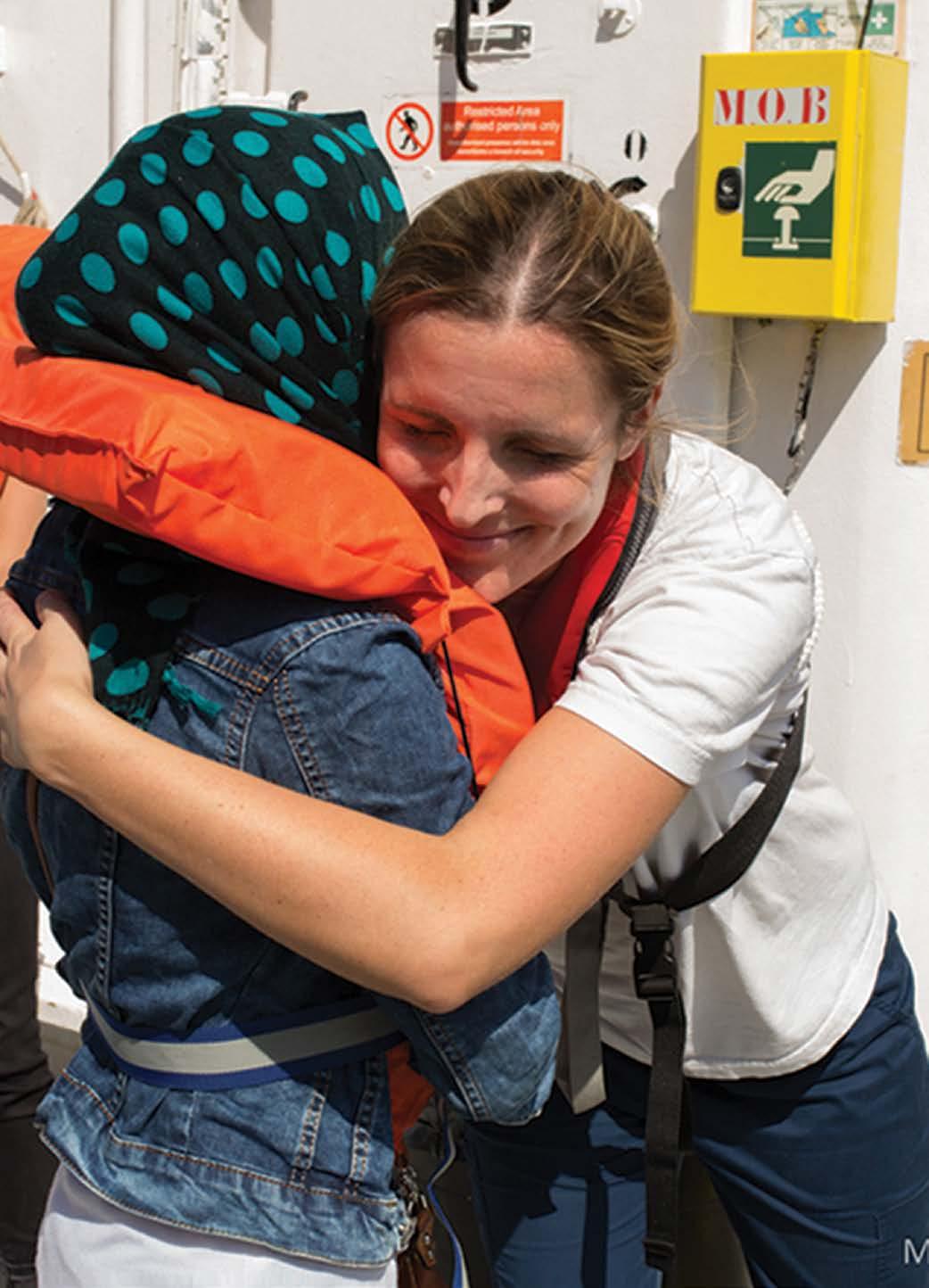
* ‘Paramedical’ includes all health professionals who are not doctors.
In 2018, Australians and New Zealanders filled 212 field positions in 39 countries.
The 2018 income of Médecins Sans Frontières Australia and Médecins Sans Frontières New Zealand totalled AU$93.6 million. Of this, AU$86.6 million was generated from fundraising activities. This is largely consistent with the 2017 level of fundraising income and represents continuing support from the Australian and New Zealand public. Approximately 108,840 Australians and New Zealanders participated in the field partner program in 2018, contributing on a monthly basis to Médecins Sans Frontières Australia and Médecins Sans Frontières New Zealand, and another 36,250 provided occasional gifts.
Spending on our social mission was 79 per cent of total expenditure, which is in line with 2017 spending. Consistent with previous years, this was split between Operational Centre Paris and Operational Centre Geneva.
Our investment policy within Australia remains consistent with previous years. Short term deposits are used to maximise interest, minimise risk and ensure flexibility and accessibility of funds when required.
Médecins Sans Frontières continues to rely on the support of volunteers both in the field and in the office. The estimated total of salaries forgone by field staff for 2018 was $5,204,070 (compared with $4,886,479 in 2017) and by office volunteers, $138,673 (compared with $158,800 in 2017).
Médecins Sans Frontières field projects are run by five operational centres (Amsterdam, Barcelona, Brussels, Geneva and Paris). The Australian section is an official partner of the Paris operational centre, and Australian and New Zealand donors contribute to funding projects run by both the Paris and Geneva operational centres. Australians and New Zealanders also fill field roles run by all operational centres.
“Thanks to the financial independence you give us, we can act quickly and with purpose.”
– Paul McPhun, Executive Director, Médecins Sans Frontières Australia and Médecins Sans Frontières New Zealand
This section describes those projects supported by the generous donations made to Médecins Sans Frontières Australia and Médecins Sans Frontières New Zealand in 2018. It also includes stories from people treated in these projects, and stories from field workers recruited by Médecins Sans Frontières Australia.
For a complete record of Médecins Sans Frontières’ work in 2018, including projects funded through other Médecins Sans Frontières sections, please go to www.msf.org/resource-centre.
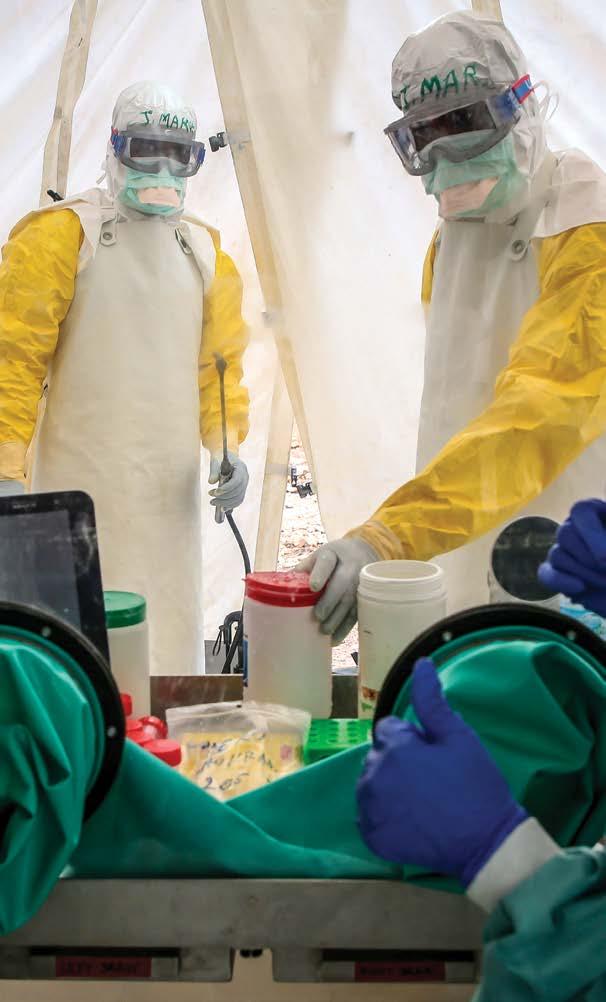
refers to the types of care provided by Médecins Sans Frontières teams in the country in 2018.
TOTAL FUNDING
refers to the total cost of the projects described in the country description for 2018 (projects run by Operational Centre Paris and/ or Operational Centre Geneva). All amounts are in Australian dollars.
MSFA FUNDING
refers to Médecins Sans Frontières Australia supporters’ contribution to the country’s projects in 2018. All amounts are in Australian dollars.
MSFNZ FUNDING
refers to Médecins Sans Frontières New Zealand supporters’ contribution to the country’s projects in 2018. All amounts are in Australian dollars.
refers to the number of field staff in projects run by Operational Centre Paris and Operational Centre Geneva in 2018.
highlights the primary achievement of Médecins Sans Frontières teams in the country in 2018.
A team communicates across the high-risk zone of the laboratory in an Ebola treatment centre, Democratic Republic of Congo. © Carl Theunis/MSFAs the conflict in Afghanistan intensified in 2018, Afghans continued to contend with insecurity, a dysfunctional healthcare system and internal displacement. This resulted from violence or natural disaster such as drought.
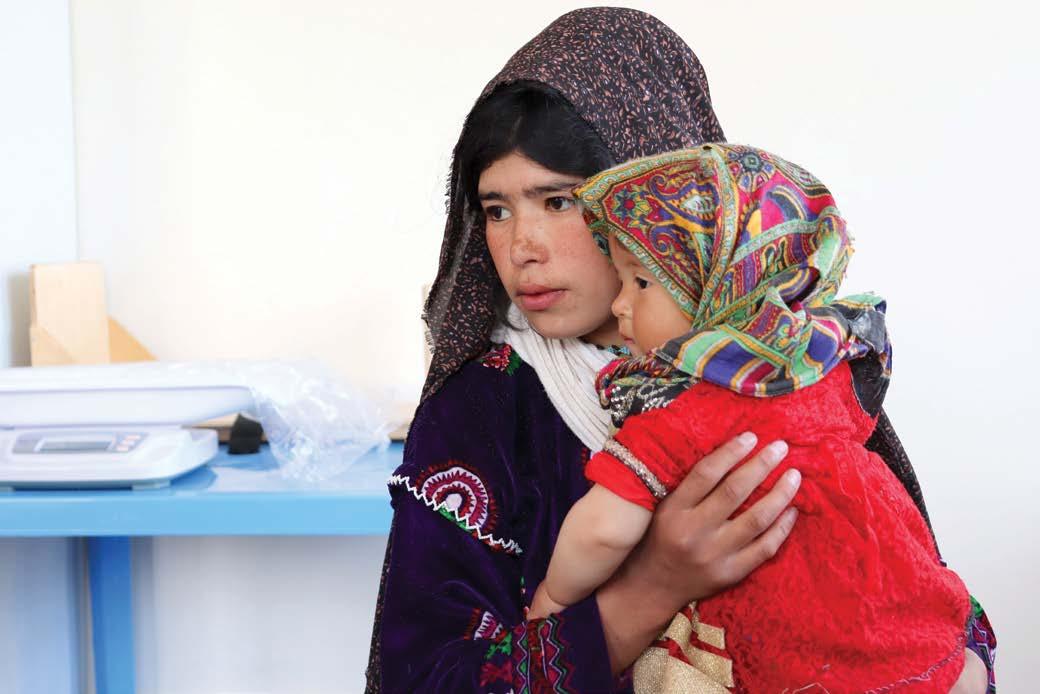
Maternal healthcare in Kabul
KEY ACTIVITIES: Maternal healthcare, neonatal care, primary healthcare
FUNDING: TOTAL MSFA $6,565,241 $1,000,000
FIELD STAFF: 290
IMPACT: 15,000 births assisted
At the Dasht-e-Barchi hospital, we continued to support the Ministry of Public Health to provide 24-hour maternal healthcare. The hospital is the only facility for emergency and complicated deliveries in an area with a population of over one million. We ran the labour and delivery rooms, an operating theatre, a recovery room, a 30-bed maternity unit and a 20 - bed neonatal unit. In 2018, our teams assisted over 15,000 births; and more than 1,300 newborns in a serious condition were hospitalised in the neonatal unit. We supported maternity care in another hospital in the area with staff, training and essential drugs.
In April, we started working in the emergency department of Herat Regional Hospital, one of the largest health facilities in western Afghanistan, and gave staff training on improving patient flow in the hospital, triage and managing mass casualty situations. It is estimated that around 150,000 internally displaced people arrived in the city during the year, from conflict- and drought-affected areas of Herat, Badghis and Ghor provinces. In December, we set up a winter clinic for internally displaced people on the outskirts of the city, with a focus on care for women and children under five.
KEY ACTIVITIES:
Chronic disease care, epidemic surveillance, mental healthcare, primary healthcare, secondary healthcare, sexual and reproductive healthcare
FUNDING: TOTAL MSFA
$11,747,825 $3,500,000
FIELD STAFF: 320
IMPACT:
168,231 general medical consultations
In 2018, Médecins Sans Frontières continued to respond to the medical and humanitarian needs of Rohingya refugees and vulnerable Bangladeshi communities in Cox’s Bazar.
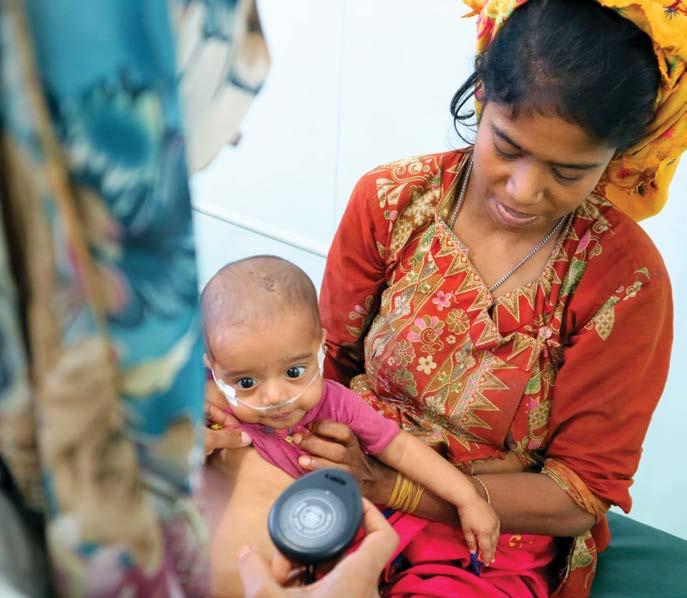
Following a renewed wave of targeted violence by the Myanmar military that started in August 2017, we rapidly scaled up our operations in response to the massive influx of Rohingya in the second half of 2017 and the first three months of 2018. At the end of 2018, we remained one of the main providers of humanitarian assistance to stateless Rohingya, approximately one million of whom have sought refuge in Bangladesh. Most Rohingya live in precarious shelters in overcrowded settlements prone to mudslides and flooding, where the quality of hygiene and sanitation services is dire, and there is a shortage of clean drinking water. The main diseases we treated throughout the year, such as upper and lower respiratory tract infections and skin diseases, were directly related to the poor living conditions.
In 2018, Médecins Sans Frontières ran three outpatient clinics, providing
primary healthcare including general medical consultations, sexual and reproductive healthcare (including care for sexual violence), mental health support and treatment of chronic diseases. Teams conducted more than 14,000 general consultations per month over the course of the year. By the end of 2018, we retained a patient cohort of more than 200 mental health cases and 600 non-communicable disease cases – with no other actors providing these specific services. We also ran a 40-bed hospital providing emergency care, treatment for malnutrition, obstetric and newborn care, intensive care and laboratory testing.
In addition, Médecins Sans Frontières set up a surveillance system, through which a team of Rohingya volunteers collected population and health-related data in the camps, and an outreach team investigated and responded to potential outbreaks of disease.
KEY ACTIVITIES: Hepatitis C care, malaria care
FUNDING: TOTAL MSFA $6,177,461 $500,000
FIELD STAFF: 72
IMPACT: 6,986 patients started on treatment for hepatitis C. Screening to treatment period now 15 times faster
Médecins Sans Frontières continued to develop more effective diagnosis and treatment strategies for hepatitis C in Cambodia in 2018.
A viral infection that attacks the liver, hepatitis C is endemic in Cambodia and access to diagnosis and treatment is virtually non-existent. Once considered a lifelong and deadly disease, hepatitis C can now be cured using direct-acting antivirals (DAAs) – new drugs that are both simpler to take and better tolerated than previous options, but also more expensive.
The goal of our project in Preah Kossamak Hospital in Phnom Penh is to simplify the diagnosis and treatment of hepatitis C, to prove its cost- effectiveness, and to make it replicable in other countries. During 2018, the time between screening and the start of treatment was reduced from 140 to nine days. Thanks to a simplified diagnostic process, and the use of the new DAAs, the number of appointments each patient needed while on treatment was cut from 16 to five, including just one with a medical doctor.
In March, we launched a project in Mong Russey district, Battambang province, to adapt this simplified model of care to a rural context. In addition to screening at nurse-led health centres, we actively sought people who needed treatment for hepatitis C in villages in the district from October. The team tested more than 12,700 villagers in the last three months of the year.
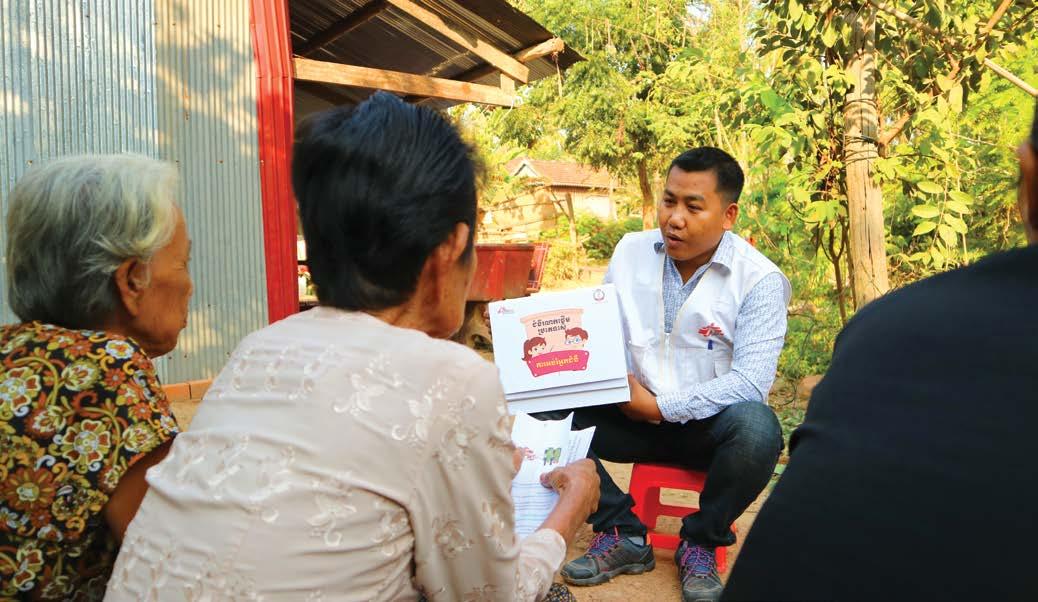
In addition to screening at nurse-led health centres, we actively sought people who needed treatment for hepatitis C in villages in the district from October.Sans Frontières
KEY ACTIVITIES: Mental healthcare, primary healthcare, surgery, water provision
FUNDING: TOTAL MSFA
$8,158,305 $3,000,000
FIELD STAFF: 379
IMPACT: 3,250 major surgical interventions
Médecins Sans Frontières continued to provide medical care to both refugees and local communities in the Far North Region, an area affected by poverty, food insecurity and recurrent disease outbreaks – problems now compounded by violence and displacement.
In Mora and Maroua, teams supported the Ministry of Health with emergency surgery, post-operative care and referrals. Under an emergency response plan developed together with local healthcare providers, teams ran regular training sessions in the management of mass casualties.
At the Mora district hospital, the main health facility serving displaced people, refugees and the host communities in Mora and Kolofata districts, Médecins Sans Frontières teams ran nutrition and paediatric care programs for children
under five years of age, as well as mental healthcare, health promotion and a blood bank.
An ambulance referral service took patients requiring life-saving surgery to the Maroua hospital, where our teams performed 3,250 major surgical interventions and 1,500 individual psychological consultations in 2018. Staff at Maroua also ran health promotion activities, staff training and technical supervision to prevent and control infections and improve the overall quality of care.
Maïramou was forced to flee her village due to violence and now cares for six children alone. Her son was treated for malnutrition at the Mora hospital in the Far North Region of Cameroon.
“In October, [people] attacked our village and abducted my husband. I don’t know where he is. We hid in the scrubland during the night. A couple of weeks ago, there was another incident in the night. We found the village empty – the invaders burnt it down. I don’t want to return without my husband – it’s too dangerous.”
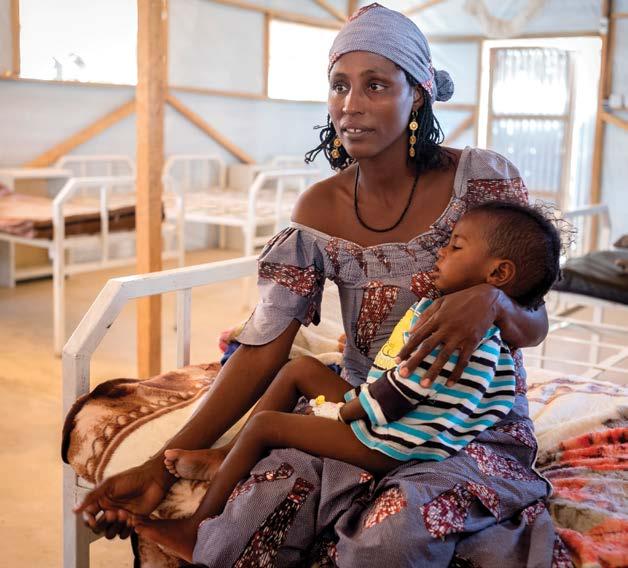
An ambulance referral service took patients requiring life-saving surgery to the Maroua hospital, where our teams performed 3,250 major surgical interventions and 1,500 individual psychological consultations in 2018.© Sylvain Cherkaoui/COSMOS
KEY ACTIVITIES: Emergency care, HIV/AIDS care, neonatal care, paediatric care, physiotherapy, sexual violence care, surgery
FUNDING: TOTAL MSFA
$29,205,868 $1,500,000
FIELD STAFF:
1,060
IMPACT:
4,788 surgical interventions in Bangui
Renewed, full-blown conflict across much of the Central African Republic (CAR) produced scenes of extreme violence in 2018, against people still suffering the trauma of the civil war that tore the country apart in 2013 to 2014.
Médecins Sans Frontières continued to provide lifesaving care amid brutal attacks against civilians, including killings and sexual violence. Whole villages and displacement sites were burned down, exacerbating the already immense humanitarian needs. By the end of 2018, about 650,000 people were internally displaced, while the number of refugees from CAR in neighbouring countries had risen to 576,000 (from 540,000 at the beginning of 2018).
At the beginning of 2018, we expanded our program in Paoua as violent clashes between two armed groups turned into large and indiscriminate attacks against civilians, causing 90,000 people to flee their homes. Our team in Paoua town – where over 75 per cent of displaced people sought refuge – distributed safe water, offered primary healthcare and ran
mass vaccination campaigns and health surveillance activities.
The situation also deteriorated in Bangui, with increased violence particularly throughout April and May of 2018. On 1 April, the Médecins Sans Frontières Sica Hospital – where teams treated victims of trauma – received over 70 casualties within just a few hours. The hospital provided emergency care, surgery, postoperative care, treatment for survivors of sexual violence, physiotherapy, radiology and laboratory services. In 2018, our teams performed 3,500 operations and 4,788 surgical interventions. In Bria, Médecins Sans Frontières continued to support people facing extreme violence and displacement. Our teams provided basic healthcare for children under 15 years of age – including HIV and sexual violence care – at Bria Hospital, outpatient clinics in the surrounding district and PK3 displaced persons camp, and through mobile clinics. In 2018, 2,770 children were admitted for hospital care. We also provided secondary healthcare at another hospital in the region. Due to several violent attacks on our teams, our activities had to be suspended for one month during 2018.
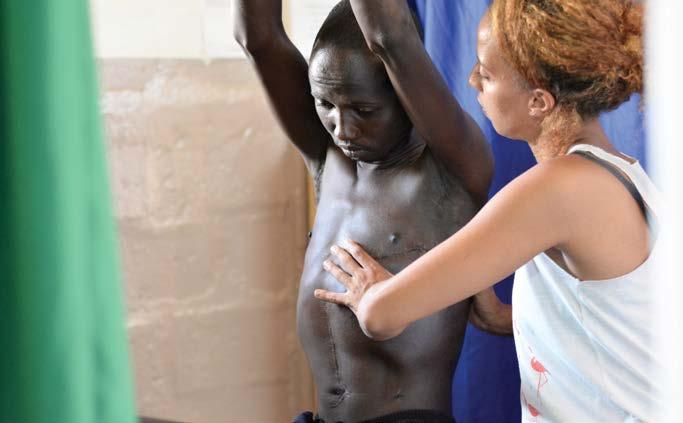
In Carnot, we provided basic paediatric care and HIV/AIDS care at four health centres, as well as emergency care, paediatric and neonatal care, therapeutic feeding and treatment for HIV/AIDS and TB at Carnot District Hospital. We also began providing treatment for survivors of sexual violence.
By creating additional barriers to healthcare, the conflict continued to compound the chronic medical emergency that has been unfolding in CAR for decades. Malaria remains the main killer of children under five, and HIV/AIDS remains a leading cause of death among adults. In 2018, we treated 7,716 emergency cases in Carnot, 52 per cent of which were people with malaria. We also provided care to 4,000 HIV patients throughout the year and continued to work on decentralising HIV/AIDS treatment.
MAMBÉRÉ-KADÉÏMédecins Sans Frontières continued to provide lifesaving care amid brutal attacks against civilians, including killings and sexual violence.
KEY ACTIVITIES:
Malaria care, mental healthcare, nutrition, primary healthcare
FUNDING:
TOTAL MSFA
$13,770,661 $3,000,000
FIELD STAFF: 312
IMPACT:
120,000 children reached by malaria preventative treatment campaign
Since 2010, our work in Moissala, southern Chad, has focused on the prevention and treatment of malaria in young children and pregnant women.
In 2018, Médecins Sans Frontières treated more than 5,600 patients in Moissala hospital, 57 per cent of whom presented with malaria. Our teams also treated 45,000 patients across 23 health centres, while initiating an assessment of the broader health needs among women and children in the area, with a view to expanding activities. Preventive treatment campaigns (seasonal malaria chemoprevention) reached over 120,000 children.
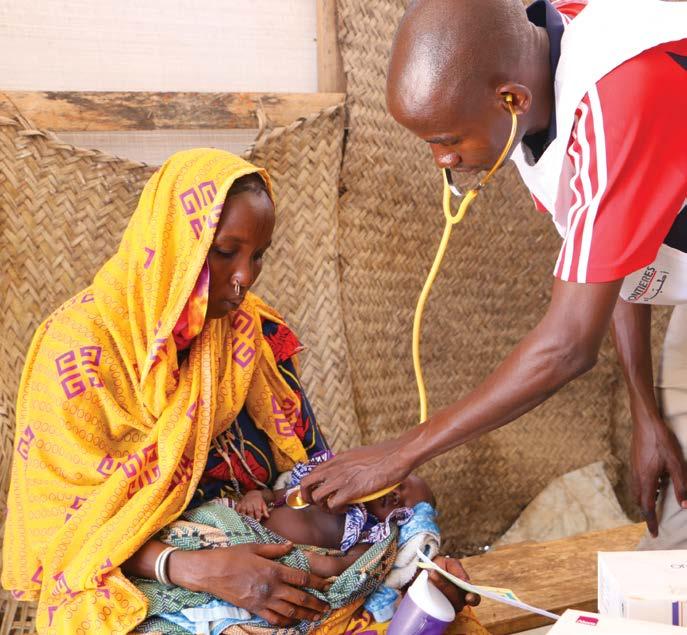
Project handover in the Lac region
The humanitarian emergency caused by the mass displacement of civilians in the Lac region in 2015 has subsided, with people starting to return home.
Considering this and the presence of other organisations in the region, Médecins Sans Frontières completed the handover of our activities to the local health authorities in 2018.
Between January and the closure in July, our mobile clinic teams provided primary healthcare consultations for displaced people, screened children for malnutrition and provided psychological support to victims of conflict, including survivors of sexual violence. Teams also trained Ministry of Health staff – particularly midwives – in health centres around Baga Sola, and donated medicines and medical equipment to facilitate Médecins Sans Frontières’ withdrawal and ease the transition for those taking over.
Our mobile clinic teams provided primary healthcare consultations for displaced people, screened children for malnutrition and provided psychological support to victims of conflict, including survivors of sexual violence.
Ebola care, emergency care, HIV/ AIDS care, nutrition, outbreak response, paediatric care, sexual violence care, vaccinations
FUNDING:
TOTAL MSFA
$23,821,502 $1,882,333
FIELD STAFF:
322
IMPACT:
110 patients cured of Ebola, of 245 patients confirmed to have the virus
The Democratic Republic of Congo (DRC) has endured decades of multiple overlapping crises and severe limitations in medical capacity.
The year 2018 was marked by further upsurges of extreme violence and frequent, far-reaching disease outbreaks, including the worst outbreak of Ebola ever experienced by the country.
On 1 August 2018, the Congolese Ministry of Health declared an outbreak of Ebola in the northeastern province of North Kivu – a region plagued by conflict. It was the second Ebola epidemic declared in DRC in 2018. Médecins Sans Frontières participated in the response immediately, investigating the first alert and setting up an Ebola treatment centre in Mangina, the small town where the outbreak was declared. We then opened a second treatment centre in Butembo, a city of one million people, which became a hotspot for the outbreak later in the year.
In the nearby city of Beni, teams supported local health centres to prevent and control infections, by setting up triage zones and decontaminating facilities where a positive case had been reported. We also ran health promotion campaigns and vaccinated 605 frontline health workers, while the World Health Organization and the Ministry of Health vaccinated first- and second-line contacts. In November, we opened a transit centre for suspected cases in Beni.
In October 2018, the outbreak spread towards Lake Albert and Ituri province, leading our teams to set up a treatment centre and an isolation unit for suspected cases in Tchomia. Médecins Sans Frontières also opened an isolation centre at the General Hospital at Bunia. We progressively increased the level of care provided across our health facilities, and from the early stages of the outbreak were able to offer the first ever potential therapeutic treatments, under an emergency World Health Organization protocol. According to the Ministry of Health, by the end of 2018 more than 600 confirmed and suspected cases had been reported and 350 people had died. Of 245 confirmed patients admitted to our treatment centres in 2018, 110 people were cured.
At the end of 2018, the outbreak was not yet under control: new cases had appeared in scattered clusters, and the epicentre of the epidemic had moved multiple times. Tracing contacts was complicated by the high mobility of people in the region, and the fact that some new cases were not linked to any previously-known chains of transmission. Insecurity and episodes of violence continued to interrupt healthcare activities and prevent access to certain areas.
In 2018, Médecins Sans Frontières teams conducted more than 80,000 medical consultations in Bunia city and in Djugu territory, Ituri province, where intercommunal clashes and fighting between armed groups caused further largescale displacement. We also built latrines and showers, responded to outbreaks of measles and cholera and treated victims of sexual violence.
In North Kivu, Médecins Sans Frontières ran comprehensive medical programs in Lubero and Rutshuru, supporting the main reference hospitals and peripheral health centres to deliver both primary and secondary healthcare. Services included emergency and intensive care, surgery, nutrition, paediatric care, treatment for survivors of sexual violence and community-based healthcare.
Médecins Sans Frontières responded to measles outbreak in the former province of Katanga in 2018, concentrating on Tanganyika and Haut-Katanga provinces. Our teams provided care and supported the Ministry of Health to contain the spread of the disease and vaccinated 29,000 children by the end of 2018.
In Goma, North Kivu, we provided technical and financial support to five health facilities, including Virunga General Hospital, to improve the provision of HIV care and increase access to antiretroviral treatment.
Médecins
KEY ACTIVITIES:
HIV/AIDS care, tuberculosis care
FUNDING:
TOTAL MSFA
$5,033,278 $500,000
FIELD STAFF: 130
IMPACT:
5,296 people accessed HIV self-testing
Despite the decrease in the number of new infections and deaths from HIV and tuberculosis (TB) in Eswatini (formerly Swaziland), controlling the spread of these diseases remains a challenge.
Around a third of adults in Eswatini are HIV positive, which also increases their vulnerability to TB and other infections. In this context, Médecins Sans Frontières continued to assist the Ministry of Health with prevention and care in Shiselweni region in 2018.
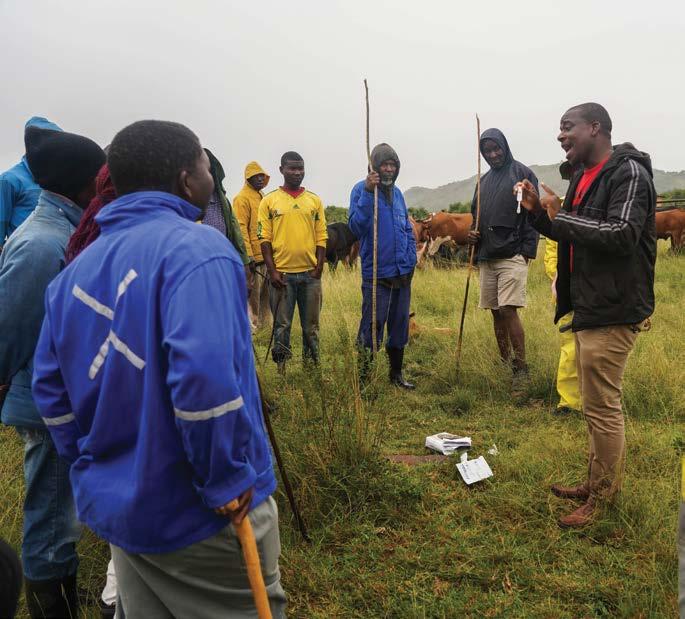
In Nhlangano, in the southwest of the region, our teams continued to offer community-based testing for HIV and TB, oral HIV self-testing for hardto-reach groups such as sex workers and men who have sex with men, and pre-exposure prophylaxis for people at increased risk of HIV infection.
A total of 5,296 people accessed HIV self-testing and 468 were initiated on pre-exposure prophylaxis in 2018. Médecins Sans Frontières teams provided specialised, integrated care for HIV patients, including secondand third-line antiretroviral (ARV) therapy for whom previous treatment had failed to work. They also provided point-of-care screening and treatment for other diseases, such as cervical cancer and drug-resistant TB, to which those living with HIV are more prone than the average population. In 2018, 1,610 women were screened for cervical cancer, of whom eight per cent tested positive.
Around a third of adults in Eswatini are HIV positive, which also increases their vulnerability to TB and other infections.
KEY ACTIVITIES: Burns care
FUNDING: TOTAL MSFA $9,786,675 $2,000,000
FIELD STAFF: 316
IMPACT:
5,136 surgical procedures for burns patients
In the capital of Port-au-Prince, Médecins Sans Frontières ran a 40-bed hospital near the Cité Soleil slum. The Drouillard hospital is the only facility in the city providing specialised care for patients with severe burns – a widespread problem linked to poor housing conditions.
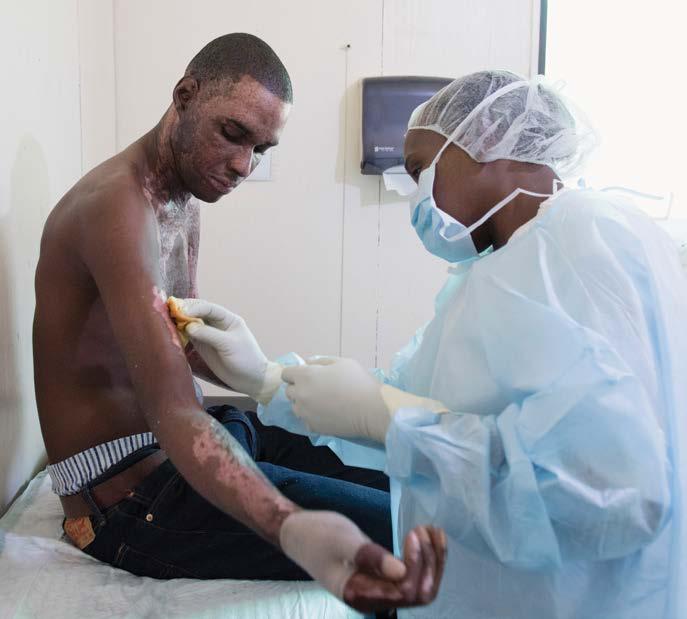
More than one-quarter of our patients are children under five, and 90 per cent come straight to us without going to a primary healthcare facility first. Services include
surgery, wound dressing, physiotherapy and mental health support. In 2018, our teams admitted 739 patients and conducted 5,136 surgical procedures. Also in 2018, we completed the construction of a new hospital, with better facilities that will improve infection control: a major issue in burns treatment. We also started running training sessions on burns treatment for medical personnel in other Haitian health facilities.
A nurse provides care for a patient recovering from severe burns at the Drouillard hospital, Port-au-Prince, Haiti. © Scott StrebleMore than one-quarter of our patients are children under five, and 90 per cent come straight to us without going to a primary healthcare facility first.
In Haiti, Médecins Sans Frontières provides specialised medical care for burns patients.
KEY ACTIVITIES: Sexual and reproductive healthcare, sexual violence care
FUNDING: TOTAL MSFA
$2,143,439 $1,000,000
FIELD STAFF: 59
IMPACT: 7,869 antenatal consultations
We continued to advocate for access to comprehensive medical
With its long history of political, economic and social instability, Honduras is one of the poorest and most dangerous countries in Central America.
In Choloma, in the north of the country, Médecins Sans Frontières worked at a mother and child clinic, offering family planning, ante- and postnatal consultations, and psychosocial support to victims of violence (including survivors of sexual violence), as well as assisting with deliveries. Health promotion teams visited different sites, such as factories and schools, to raise awareness of the
services available in the clinic and to provide information about sexual and reproductive health for adolescents.
In accordance with international protocols, in 2018 we continued to advocate for access to comprehensive medical care for survivors of sexual violence in Honduras, where emergency contraception is still banned.
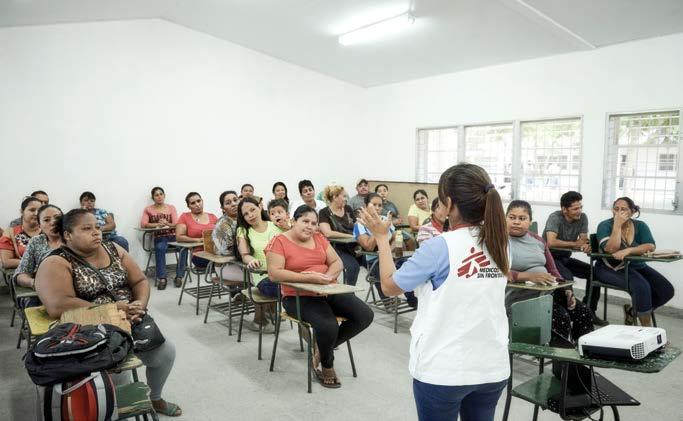
 Women wait for a consultation at the mother and child clinic in Choloma, Honduras. © Christina Simons/MSF
A Médecins Sans Frontières staff member runs a health promotion workshop in a school, teaching students about sexual and reproductive health. © Christina Simons/MSF
Women wait for a consultation at the mother and child clinic in Choloma, Honduras. © Christina Simons/MSF
A Médecins Sans Frontières staff member runs a health promotion workshop in a school, teaching students about sexual and reproductive health. © Christina Simons/MSF
care for survivors of sexual violence in Honduras.
In Iran, Médecins Sans Frontières ran programs to assist drug users, sex workers, refugees, homeless people and other vulnerable groups who face barriers when seeking healthcare.

Drug addiction is a particular public health concern in Iran, with the number of drug users having doubled over the last six years to nearly three million (3.5 per cent of the population)1. They, and other vulnerable people such as sex workers, homeless people and the Ghorbati ethnic minority, suffer from stigma and exclusion in Iran, which limits their access to medical care. In 2018, this access was further restricted by a financial crisis that crippled the health system.
Our teams worked in south Tehran throughout the year, providing treatment for a range of communicable diseases to which marginalised communities here are particularly exposed, including hepatitis B and C, HIV, tuberculosis (TB) and syphilis. We saw a large increase in the number of patients enrolling for hepatitis C
treatment: this group increased by 82 per cent from 2017.
We also ran sexual and reproductive healthcare services, comprising gynaecology and obstetrics, ante- and postnatal care and consultations for victims of sexual violence, as well as psychosocial support and counselling. A mobile clinic specifically for women was set up in the city.
In addition, we opened a new program for refugees and the local community in Mashhad, near the Afghan border, where a significant number of the estimated two million Afghans in Iran live. Our teams there offered a similar range of services as in south Tehran: through fixed and mobile clinics, we treated hepatitis C and operated a referral system for patients needing treatment for HIV and/or TB.
In our primary healthcare centre in south Tehran, Médecins Sans Frontières provided care for HIV. © Mahsa Ahrabi-Fard SAUDI ARABIA IRAQ TEHRAN MASHHADWe provided treatment for a range of communicable diseases to which marginalised communities in south Tehran are particularly exposed.
Project locations funded by Australian donors
KEY ACTIVITIES:
Emergency care, mental healthcare, primary healthcare, rehabilitation, secondary healthcare, sexual and reproductive healthcare, surgery
With almost two million people still displaced and many health facilities damaged or destroyed, medical needs remained extremely high in Iraq.
Conflict subsided in late 2017 and increasing numbers of displaced people returned to their home regions in 2018 –however, many displaced families lack the necessary documentation, and properties and livelihoods have been damaged, if not destroyed, and security concerns persist in some areas. The context remains complex and unpredictable, due to ongoing political disputes, tribal conflicts and attacks by armed groups.
In 2018, Médecins Sans Frontières continued to offer services for displaced people, returnees and communities most affected by violence.
Our teams in Baghdad Medical Rehabilitation Centre provided postoperative rehabilitation to 261 severely injured patients in 2018, including physiotherapy, pain management and mental healthcare.
FIELD STAFF: 605
IMPACT:
18,000 emergency room consultations in Qayyarah
A PATIENT’S STORY:
We continued to provide primary healthcare, treatment for noncommunicable diseases and mental health services, including psychiatric care, in two camps for internally displaced persons in Anbar governorate. In the second half of 2018, we completed the handover of our activities as the camp populations gradually decreased and other organisations started providing medical services. In April, we opened an outpatient clinic at Al-Ramadi Teaching Hospital to treat patients with moderate and severe mental health disorders.
We provided psychological, psychiatric and psychosocial care in four different camps around Erbil city, and to displaced people and host communities in Kalak village. We reduced our activities in October 2018 as the camp populations declined, concentrating on moderate to severe mental health cases and treatment for non-communicable diseases.
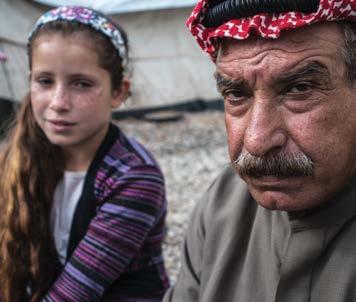
South of Mosul, we provided emergency consultations, intensive care, treatment for burns and mental healthcare for the resident and displaced population of Qayyarah subdistrict and the surrounding area. Our 62-bed hospital has an inpatient department, a paediatric ward and an inpatient therapeutic feeding centre. As the healthcare needs of displaced people and those returning to the area continued to grow in 2018, we expanded our burns and neonatal activities and set up a second operating theatre. Our teams performed more than 18,000 emergency room consultations and almost 2,500 surgical interventions during the year.
© Sacha Myers/MSF
We continued to provide emergency maternity and neonatal care, basic paediatrics, emergency stabilisation services and mental health support in Tal Maraq health facility, Zummar subdistrict. Through regular outreach activities, our teams also provided healthcare – in particular, treatment for chronic diseases – in villages across the region. In July, Médecins Sans Frontières supported the Department of Health to vaccinate 32,258 children aged between six months and 15 years of age in response to a measles outbreak in Ninewa governorate.
SAUDI ARABIAKEY ACTIVITIES: Maternal healthcare, neonatal healthcare
FUNDING: TOTAL MSFA
$8,164,039 $2,000,000
FIELD STAFF: 216
IMPACT:
11,000 newborns vaccinated against hepatitis B
Improving mother and child health remained the key focus for Médecins Sans Frontières in the Ivory Coast in 2018.
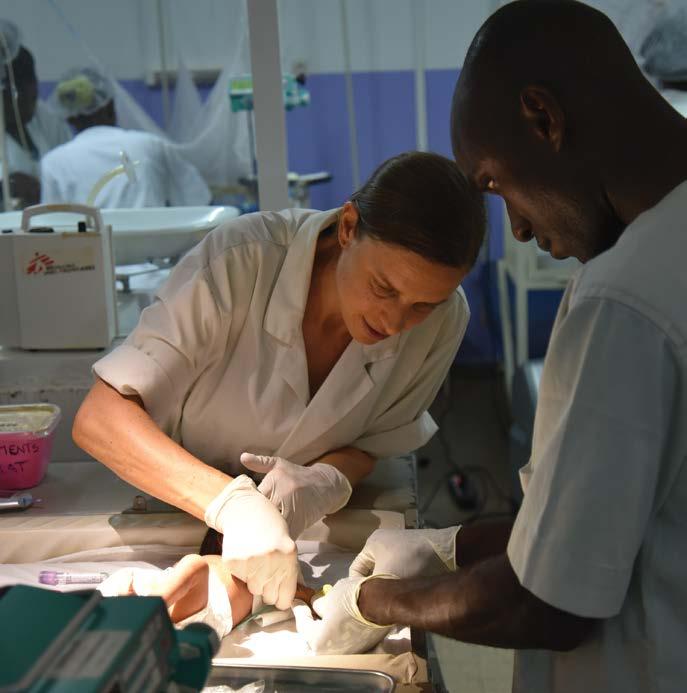
After decades of instability, the Ivorian health system is still recovering from the political and military crisis that engulfed the country from 2002 to 2010. The maternal mortality rate is high by world standards, with about 645 deaths for every 100,000 live births.1 Although the Ministry of Health has made maternal healthcare a priority, offering it free of charge to all pregnant women, factors such as budget restrictions, drug stockouts and a lack of trained staff continue to hamper access to quality services for women and their newborn babies.
Needs are especially acute in rural areas such as Hambol, where we have been supporting the Ministry of Health since 2014. In 2018, our teams worked in the
maternity and neonatology wards and operating theatre at the referral hospital in Katiola, where we admitted 793 newborns for care. We also provided medical supplies, staff, coaching and training to the Dabakala and Niakara hospitals and six health centres, and support a referral system for obstetric and neonatal emergencies.
In order to reduce mother-tochild transmission of hepatitis B, we started working with the Ministry of Health to introduce systematic vaccination immediately after birth in all MSF-supported facilities. Over 11,000 newborns were vaccinated against hepatitis B in 2018.
In order to reduce mother-to-child transmission of hepatitis B, we started working with the Ministry of Health to introduce systematic vaccination immediately after birth in all MSF-supported facilities.
KEY ACTIVITIES:
Maternal healthcare, mental healthcare, neonatal care, surgery
FUNDING: TOTAL MSFA
$24,167,907 $4,000,000
FIELD STAFF: 237
IMPACT:
1,160 reconstructive surgical interventions
In Jordan, Médecins Sans Frontières runs healthcare programs to assist Syrian refugees and vulnerable host communities.
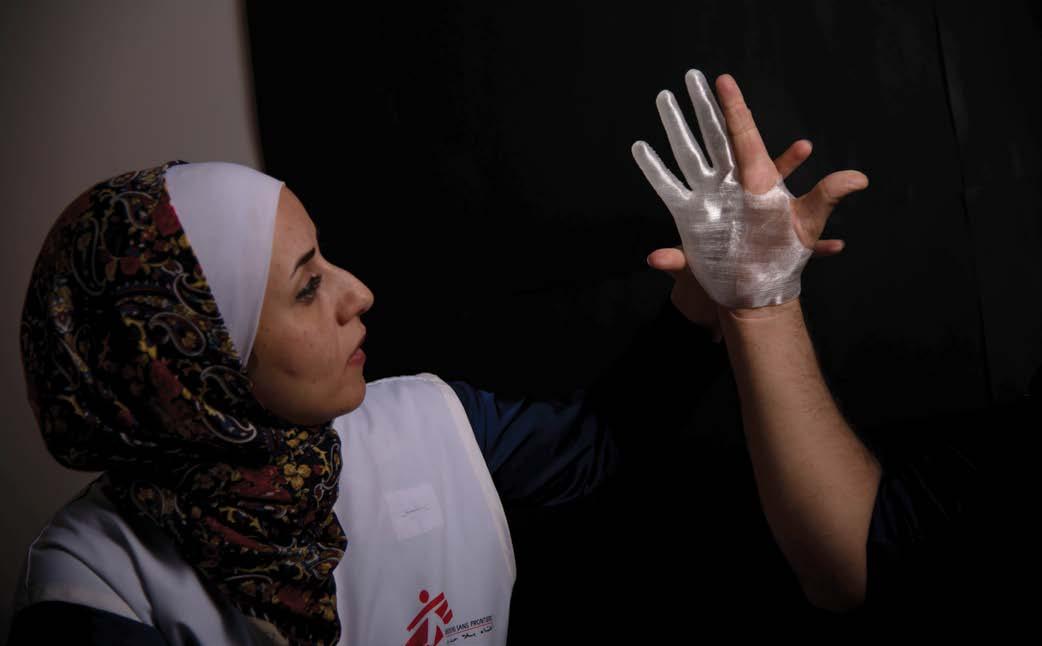
Following the closure of the border between southern Syria and Jordan and the announcement of a ‘de-escalation zone’ in southwestern Syria in July 2017, the number of refugees and war-wounded entering the country decreased. However, there are still almost 671,000 registered Syrian refugees and an unknown number of unregistered refugees in Jordan, most of whom rely on humanitarian assistance to meet their basic needs. In February 2018, the Jordanian government announced the cancellation of subsidised healthcare for Syrian refugees, making it even more difficult for them to access medical services.
We have been running a maternity department and a 16-bed neonatal intensive care unit in Irbid since late 2013, assisting a total of around 16,000 deliveries. In the nine months to September, when we handed over the maternity facility to another non-governmental organisation,
our teams carried out 11,000 antenatal consultations, assisted almost 2,700 births and admitted 664 newborns.
In 2018, we increased our focus on mental healthcare, offering support to Syrian children and their parents in Mafraq governorate.
Our reconstructive surgery hospital in Amman continued providing comprehensive care to a monthly average of 200 patients from neighbouring countries – mainly Iraq, Syria, Yemen and Palestine – with conflict-related injuries. This included orthopaedic, plastic and maxillofacial surgery, physiotherapy, mental health support and prosthetics. Since 2016, we have been 3D-printing upper-limb prosthetic devices that are essential for patients to regain their physical integrity and autonomy. In 2018, our teams performed 1,160 surgical interventions.
KEY ACTIVITIES:
Emergency care, HIV/AIDS care, nutrition, palliative care, sexual violence care, tuberculosis care
FUNDING: TOTAL $29,513,960
MSFA $3,488,152
MSFNZ $229,227
FIELD STAFF: 662
IMPACT: 175,000 outpatient consultations in Dagahaley refugee camp
Médecins Sans Frontières responded to multiple public health challenges in Kenya in 2018, including urban violence and treatment failure affecting people living with HIV, while continuing our decadeslong support for refugees in Dadaab.
We continued to offer comprehensive healthcare to over 70,000 refugees living in Dagahaley camp in Dadaab, and to the local community, at a 100-bed hospital and two decentralised health posts. In 2018, we conducted more than 175,000 outpatient consultations and admitted over 10,000 patients for care.
Our teams provided a wide range of services, including nutrition support, sexual and reproductive healthcare, emergency surgery, medical and psychological assistance to victims of sexual violence, vaccinations, mental health services, treatment for HIV and tuberculosis (TB), palliative care for patients with chronic illnesses and homebased insulin management for patients with diabetes.
In 2018, we focused on treatment failure, advanced HIV and programs for adolescents. Despite generally good coverage of antiretroviral (ARV) therapy, many people living with HIV in Homa Bay county continue to experience treatment failure, and many present at our facilities with advanced HIV-related diseases such as Kaposi’s sarcoma. More than half the patients admitted to Homa Bay county referral hospital – where Médecins Sans Frontières supported two adult wards and a TB ward in 2018 – are HIV positive. An average of 18 HIV-positive patients died each month in 2018, almost 30 per cent of them within the first 24 hours of admission.
In response, we implemented various innovative systems, including a dedicated laboratory and point-of-care testing for inpatients, which facilitated faster
treatment. We also ran a follow-up clinic at the hospital that liaises with patients’ local health facilities to create a continuum of care as close to home as possible.
In the Eastlands area of the capital, Nairobi, we ran an ambulance referral service, a toll-free call centre and a trauma room to improve access to emergency care for victims of urban violence. In 2018, our teams received over 7,600 calls, resulting in 6,230 ambulance interventions and 4,340 referrals to health facilities. The team in the trauma room conducted 9,250 consultations, receiving mostly walk-in patients.
We also ran a specialised clinic for victims of sexual and gender-based violence in Eastlands, and supported four other facilities run by the Ministry of Health. In 2018, we treated an average of 269 patients a month, representing an 18 per cent increase on the previous year. Our outreach teams increased their community awareness-raising activities, explaining what sexual and gender-based violence is and what assistance is available.
In addition, we continued to support the Ministry of Health in the management of drug-resistant TB (DR-TB), by providing equipment and training. Our groundbreaking DR-TB program, which we handed over in 2017, introduced the use of GeneXpert machines for diagnosis and oral drugs bedaquiline and delamanid for treatment. We also achieved the country’s first successful treatment of a patient with extensively drug-resistant TB. In 2018, we piloted a nine-month treatment regimen which the Ministry of Health adopted.
In the Eastlands area of the capital, Nairobi, we ran an ambulance referral service, a toll-free call centre and a trauma room to improve access to emergency care.
KEY ACTIVITIES: Paediatric care, surgery
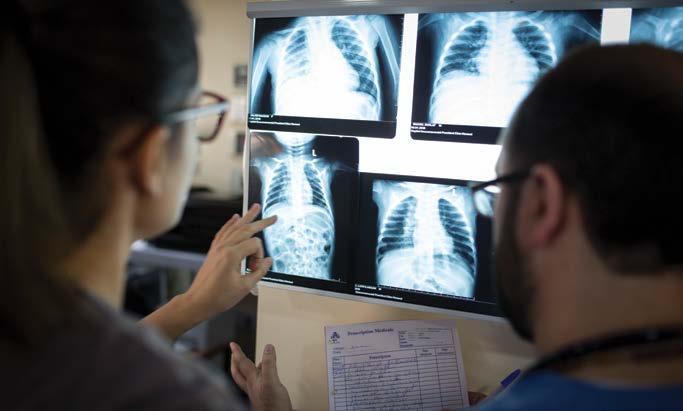
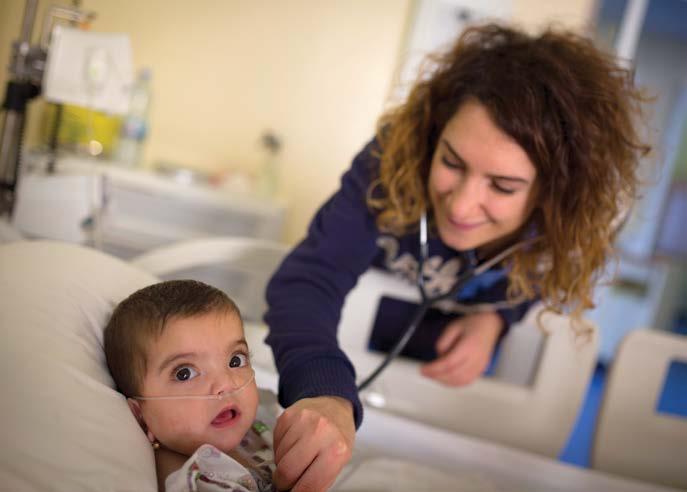
FUNDING: TOTAL MSFA
$6,163,158 $1,500,000
FIELD STAFF: 74
IMPACT:
58 patients treated for thalassemia
More than a million people have fled into Lebanon since the conflict in neighbouring Syria began in 2011, making it the country with the largest number of refugees per capita in the world.
Many refugees are living in deplorable conditions with their most basic needs unmet. The huge number of extra people in the country has put a severe strain on services, including the health sector. Even where healthcare is available, the cost of consultations, laboratory tests and medication is a barrier to the economically and socially vulnerable, whether refugees, migrants or Lebanese people.
In the Bekaa Valley – where the majority of Syrian refugees have settled – we continued to run a specialised paediatrics program in Zahle, offering emergency consultations, paediatric intensive care and treatment for thalassemia (a hereditary blood disease). A total of 3,801 emergency consultations were provided. Paediatric surgery was also offered until July 2018.
Project locations funded by Australian donorsMany refugees are living in deplorable conditions with their most basic needs unmet. The huge number of extra people in the country has put a severe strain on services, including the health sector.A paediatrician attends to a young patient admitted to the Zahle hospital, Lebanon, for chest and breathing problems. © Florian Seriex/MSF Staff examine an X-ray in the paediatric unit of the hospital in Zahle, Lebanon. © Florian Seriex/MSF
KEY ACTIVITIES:
Epilepsy care, mental healthcare, paediatric care, surgery
FUNDING: TOTAL MSFA
$8,901,456 $500,000
FIELD STAFF: 323
IMPACT:
Médecins Sans Frontières ran a paediatric hospital in the Liberian capital, Monrovia, offering specialised care, including surgery; and supported health centres to make psychiatric treatment more accessible at community level.
We opened Bardnesville Junction Hospital in 2015 to provide specialised care for children as the Liberian health system became severely strained during the West African Ebola outbreak.
Serving children between one month and 15 years old, the hospital receives some of the most critical paediatric cases from a large urban area that is home to approximately one million people. In 2018, we admitted around 100 patients a week with conditions such as malaria, severe acute malnutrition, non-bloody diarrhoea and respiratory tract infections. The hospital has an emergency room, an intensive care unit, a paediatric ward and a nutrition ward, and is a certified clinical teaching site for Liberian nursing students.
We opened a paediatric surgery program at Bardnesville in January 2018 and performed 735 procedures during the year, including emergency interventions and routine operations such as paediatric hernia repairs.
Towards the end of the year, we built a second operating theatre to perform additional, subspecialised procedures not widely available in Liberia, such as reconstructive plastic surgery.
We also expanded our innovative mental health and epilepsy care program around Monrovia, in Montserrado County. Building on a model established by the World Health Organization to make psychiatric care available at community level, we worked with the county health authorities to provide training, supervision and medication for staff in four primary health centres. These centres treated conditions such as bipolar disorder, severe depression, post-traumatic stress disorder and schizophrenia, as well as epilepsy. Teams of health volunteers and counsellors identified patients in their communities, supported their treatment at home and raised awareness about mental illness.
NAME: Siry Ibrahim
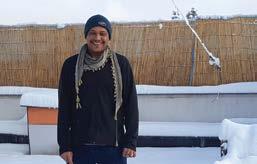
FROM: Wellington, NZ
FIELD ROLE: Supply activity manager, Monrovia, February to July 2018
I arrived in Monrovia just as Médecins Sans Frontières’ new surgical project was starting: we were expanding operations to provide elective and emergency surgery for children under 15 years old. My role involved modifying and reviewing the medical and non-medical supply chain so that we could meet all the needs for this new activity. I had been working for Médecins Sans Frontières for more than five years, but it was my first time in a pure ‘supply’ role.
In Monrovia I was presented with a great opportunity to further develop and improve our relationships with supply chain stakeholders. By reaching out, we were able to renegotiate contracts and facilitate the release of goods from ports and airports. I cannot emphasise enough the importance of good supply chain management for the success of any Médecins Sans Frontières program – it means providing life-saving drugs quickly to patients and being economical with donor funds so we can save more lives.
© Alessio Mamo Project location funded by Australian donors CÔTE D’IVOIRE MONROVIA MONTSERRADO COUNTYWe expanded our innovative mental health and epilepsy care program around Monrovia, in Montserrado County.
735 surgical procedures for children
KEY ACTIVITIES: Primary healthcare
FUNDING: TOTAL MSFA $6,508,028 $1,500,000
FIELD STAFF: 52
IMPACT: 5,509 medical consultations in detention centres
Despite ongoing instability, Libya remained a destination for migrant workers from across Africa and a transit country for migrants, asylum seekers and refugees attempting to cross the Mediterranean and reach Europe.
In 2018, Médecins Sans Frontières provided medical assistance to migrants and refugees arbitrarily held in detention centres nominally under the control of the Ministry of the Interior. Many of our patients in the centres were extremely vulnerable people: for example, unaccompanied children, lactating mothers and their newborn babies. They also included survivors of human trafficking who had been held captive for prolonged periods, deprived of food, tortured and exposed to extreme violence, including the killing of family members. Most of the medical issues we treated were related to, or aggravated by, the dire conditions inside the centres. Overcrowding, inadequate food and drinking water and insufficient latrines facilitated the spread of acute respiratory tract infections, tuberculosis, diarrhoeal diseases and skin diseases such as scabies. Mental health disorders and trauma were frequently exacerbated by the ordeal of indefinite detention.
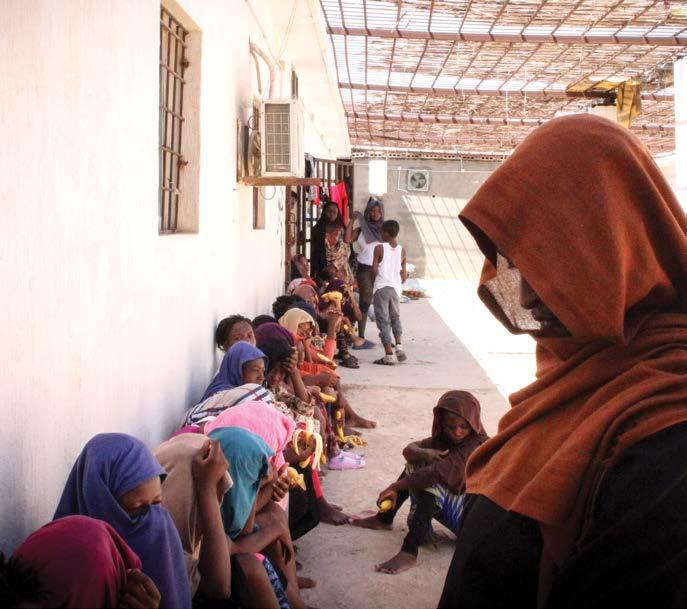
Médecins Sans Frontières repeatedly denounced this unacceptable situation deliberately reinforced by European policy makers, but we saw little positive progress. On the contrary, the campaign to effectively criminalise search and rescue vessels on the Mediterranean, and the European Union’s handover of responsibility to the Libyan coastguard for these operations, further sealed off the Libyan coast. Vulnerable people became trapped in a country where their lives are endangered and where serious human rights violations occur, as documented by the United Nations and other organisations.
In 2018, our teams conducted 5,509 medical consultations in detention centres in Misrata, Khoms and Zliten and referred 96 patients to secondary healthcare facilities. On dozens of occasions in Misrata and Khoms, we gained access to people who had been brought back from the sea by the Libyan coastguard or commercial ships in violation of international refugee law and maritime conventions. We carried out about 140 first aid consultations at disembarkation points in 2018.
We continued to work in Bani Walid, reportedly a major hub for smugglers and traffickers, in order to assist people who had been held captive by criminal networks in the area but had managed to escape or been released. We conducted 810 medical consultations with survivors and referred a dozen for secondary healthcare in Misrata or Tripoli.
KEY ACTIVITIES:
Cervical cancer care, HIV/AIDS care
FUNDING:
TOTAL MSFA
$6,720,989 $1,500,000
FIELD STAFF: 52
IMPACT:
11,000 patients screened for cervical cancer
In Malawi, Médecins Sans Frontières is working to reduce mortality from HIV by facilitating earlier treatment and more advanced care, particularly for women, adolescents and other vulnerable groups.
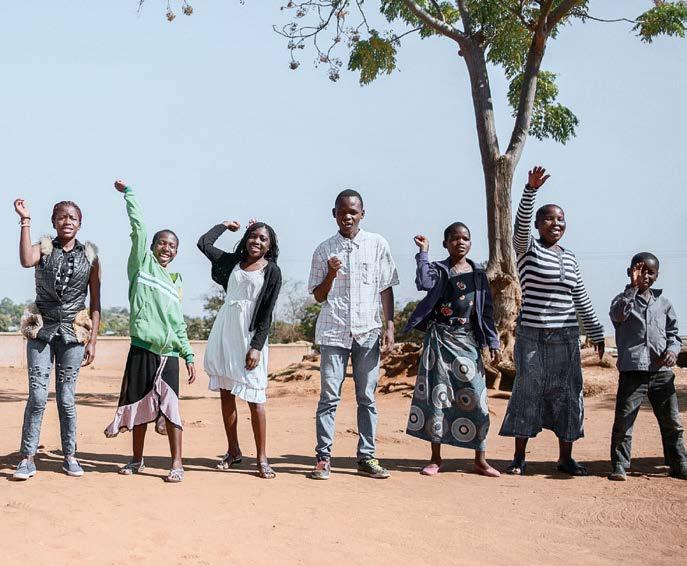
HIV prevalence is over 10 per cent among people aged 15 to 64, among the highest in the world. The country’s HIV program has achieved significant success, with more than 80 per cent of the one million people who have tested positive starting treatment. However, more robust strategies are required to prevent infection and reduce mortality among more at-risk patients.
In rural Chiradzulu district, we focused our HIV activities on complex cases, such as patients on second-or third-line antiretroviral therapy and those with opportunistic infections or facing treatment failure. In 2018, our teams provided care to almost 5,500 patients, of whom 2,500 were children and adolescents. Our services include decentralised outpatient clinics, ‘teen clubs’ for adolescents, point-of-care tests, counselling and inpatient care.
Cervical cancer accounts for 40 per cent of all cancers among women in Malawi and kills an estimated 2,314 people each year. We are developing a comprehensive cervical cancer program, comprising screening, diagnosis, vaccination, treatment, surgery, chemotherapy, radiotherapy and palliative care.
In 2018, we screened more than 11,000 women in Blantyre and Chiradzulu districts and started building a cervical cancer clinic in Queen Elizabeth Hospital, the main university teaching hospital in Malawi. It will open in 2019, with an operating theatre, an 18-bed inpatient ward and a day clinic; services such as vaccinations, chemotherapy and radiotherapy will be added progressively.
In rural Chiradzulu district, we focused our HIV activities on complex cases, such as patients on second- or third- line antiretroviral therapy and those with opportunistic infections or facing treatment failure.
KEY ACTIVITIES: Cancer care, malaria care, nutrition, sexual and reproductive healthcare, paediatric care
FUNDING: TOTAL MSFA
$14,358,982 $2,000,000
FIELD STAFF: 503
IMPACT: 160,000 outpatient consultations in Koutiala
Insecurity in north and central Mali continued to disrupt healthcare and other public services in 2018, especially in rural areas.
Médecins Sans Frontières worked across the country to improve access to healthcare in both rural communities and urban areas.
Mopti
Central Mali’s Mopti region has become increasingly unstable, with frequent outbreaks of violence, both intercommunal and between the military and non-state armed groups. Many aid organisations have stopped working in the region, meaning access to medical assistance is further curtailed.
In the Ténenkou hospital, Médecins Sans Frontières teams provided primary and secondary healthcare for women and newborn babies. Teams also organised referrals to the hospital from surrounding areas often affected by fighting. In August 2018, we sent ‘malaria agents’ to hard-to-reach communities in Ténenkou district to support our mobile clinics during the malaria peak, which occurs between July and December.
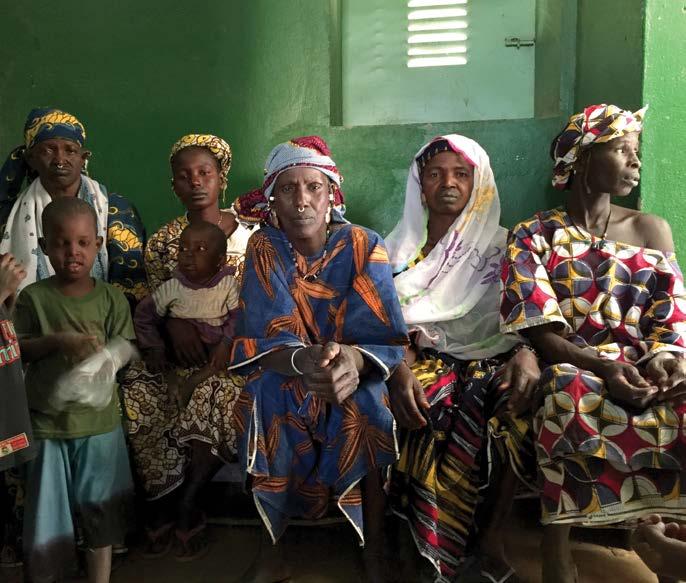
Koutiala
In the south, we supported nutrition and paediatric services at the Koutiala hospital, where we completed the construction of a new 185-bed paediatric care unit in 2018. In addition, our teams conducted a range of preventive and curative activities in health centres and communities, especially during the seasonal malaria and malnutrition peaks. By June, we were supporting 37 out of the 42 district health centres, with extra community workers deployed during the malaria peak. Our teams in Koutiala conducted more than 160,000 outpatient consultations during the year.
Bamako
In October, we started working with the Ministry of Health on the diagnosis and treatment of cervical and breast cancer. We supported the haemato-oncology unit at the University Hospital of Point G, including the provision of hospital and home-based palliative care.
Patients and caretakers wait for consultations at a Médecins Sans Frontières mobile clinic in Ténenkou district, Mali. © Lamine Keita/MSFBy June, we were supporting 37 out of the 42 district health centres, with extra community workers deployed during the malaria peak.
KEY ACTIVITIES: HIV/AIDS care
FUNDING:
TOTAL MSFA
$2,134,989 $1,000,000
FIELD STAFF: 73
IMPACT:
2,270 patients provided with decentralised HIV care
In Myanmar, access to medical treatment remains limited, particularly for marginalised communities and certain ethnic groups.
In Dawei, a coastal town in the Tanintharyi region in southern Myanmar, HIV prevalence remains high in relation to the rest of the country, particularly among vulnerable populations such as fishing communities and migrant workers. In 2018, Médecins Sans Frontières provided decentralised HIV care for more than 2,270 patients; and almost 90 per cent of patients co-infected with hepatitis C received treatment with highly effective direct-acting antivirals.
Health education and peer counselling were essential components of the treatment program in Dawei, offering patients a way to better understand and cope with HIV. Teams worked with the community to provide health education and promote testing and treatment, helping to alleviate the stigma associated with HIV.
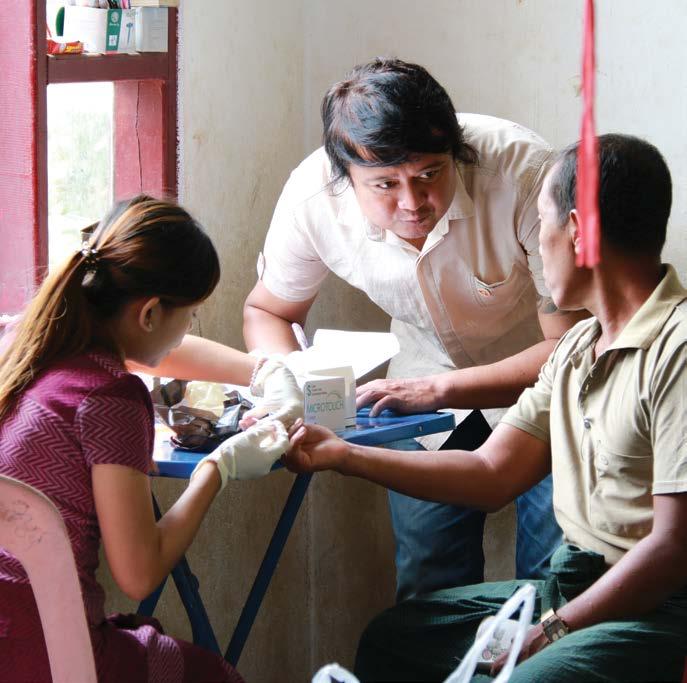
Health education and peer counselling were essential components of the treatment program in Dawei, offering patients a way to better understand and cope with HIV.
KEY ACTIVITIES:
Malaria care, nutrition, paediatric care, primary healthcare, secondary healthcare
FUNDING: TOTAL MSFA
$23,014,498 $3,000,000
FIELD STAFF: 968
IMPACT:
22,000 children under five years old admitted for hospital care in Magaria
In Niger, Médecins Sans Frontières focused on improving paediatric care and reducing child mortality, particularly during the annual malnutrition and malaria peak.
In 2018, we also increased assistance to victims of violence and displacement, migrants and host communities.
Maradi region
In Madarounfa, we ran a paediatric program aimed at reducing child mortality, comprising inpatient care for severe malnutrition, malaria and other diseases affecting children under five in the district hospital, and outpatient treatment for uncomplicated malnutrition in the surrounding health zones. From September 2018, we improved active case finding of children with malnutrition by deploying community health workers to show mothers how to use mid-upper-arm-circumference (MUAC) bracelets. Through this activity, 253 new cases were identified by the end of the year.
Médecins Sans Frontières supported community health workers to screen more than 29,800 people for malaria, over 80 per cent of whom tested positive and received treatment. Due to its proximity to the border, the project receives many patients from Nigeria – they account for up to 30 per cent of malnutrition cases. In early 2018, we started actively searching on both sides of the border for children who had abandoned nutrition treatment prematurely.
Our teams in Zinder region focused on treating children under five for severe acute malnutrition and common childhood diseases. We supported the paediatric unit in Magaria district hospital and 11 health centres, as well as 14 health posts across the region during the seasonal malaria and malnutrition peak. We also developed community outreach activities, including awareness raising sessions, active case finding and an initiative training parents to use MUAC measuring tapes to screen their children for malnutrition.
In 2018, we admitted more than 22,000 children under five to the paediatric unit in Magaria – twice as many as in previous years. We also conducted 127,500 outpatient consultations for children in this age group and treated
20,900 children in our outpatient feeding program, almost half of them between August and October. We reached a point when we admitted more than 1,000 children to hospital in one day, including more than 250 children requiring intensive care.
We also assisted the Ministry of Public Health with seasonal malaria chemoprevention activities, carrying out more than 18,000 rapid tests and providing treatment to the 12,200 children who tested positive.
After four years of armed conflict, 250,000 refugees and internally displaced people are still living in dire conditions in Diffa’s informal camps. Insecurity and a lack of resources have also had a devastating impact on local communities.
In 2018, we developed crossborder activities to provide access to healthcare for local people and nomadic communities living between Mainé-Soroa district in Niger and the northernmost fringes of Nigeria’s Yobe state. Teams ran mobile clinics across seven health zones in MainéSoroa and three in Yunusari district, Nigeria. Community outreach workers provided treatment for patients with simple cases of malaria, diarrhoea and respiratory infections, as well as screening for malnutrition and referrals to other health facilities. Teams also ran education activities on maternal health, malnutrition and vaccination. In the district hospital of Mainé-Soroa, Médecins Sans Frontières supported the pharmacy, paediatric and emergency departments.
Niger is a major transit country for migrants, asylum seekers and refugees, including people expelled from Algeria, returned from Libya or travelling north towards Europe. These people often face abuse and exclusion. In 2018, we ran fixed and mobile clinics in Niamey, which is at the crossroads of migration routes. Our team carried out over 5,000 consultations during the year.
KEY ACTIVITIES:
Cholera outbreak response, emergency obstetric care, emergency neonatal care, nutrition, paediatric care, sexual and reproductive healthcare, sexual violence care
FUNDING: TOTAL MSFA $20,976,669 $2,000,000
FIELD STAFF: 757
IMPACT: 1,400 sexual violence survivors treated
The conflict in northeast Nigeria showed no signs of abating in 2018, while insecurity and violence escalated across the middle of the country and in the northwest.
By the end of the year, 1.9 million people were internally displaced and 7.7 million in need of humanitarian assistance in northeast Nigeria. Médecins Sans Frontières continued to assist people affected by the violence in Borno state throughout 2018, while maintaining a range of basic and specialist healthcare programs and responding to other emergencies across the country.
Vital medical assistance in the northeast Almost a decade of conflict between the military and non-state armed groups have taken a heavy toll on people in northeast Nigeria. Many thousands have been killed or have died of malnutrition and treatable diseases, such as malaria, due to a lack of healthcare. Médecins Sans Frontières and other nongovernmental organisations have been working to fill gaps in services, but their access is frequently hampered by insecurity. According to the United Nations refugee agency, UNHCR, there were up to 230,000 people newly displaced in the last quarter of 2018 alone, and 800,000 remained out of the reach of aid organisations.
In Maiduguri, the capital of Borno state – which hosts one million displaced people – Médecins Sans Frontières ran a paediatric hospital to provide specialised care for children from both the displaced and host populations of the city. We admitted 7,282 children for care and provided 11,695 emergency consultations in 2018. In August, we opened a hospital in Bama to respond to an influx of newly displaced people, admitting 280 patients to the therapeutic feeding centre and 888 children to the paediatric inpatient department by the end of the year. In September, we set up a temporary cholera treatment unit to provide care for 66 patients during an outbreak. In Monguno, our teams continued to run a hospital providing paediatric care and therapeutic feeding, as well as mobile clinics serving people in villages
outside of the city. We provided 11,887 mobile clinic consultations up until July 2018, when the project was closed.
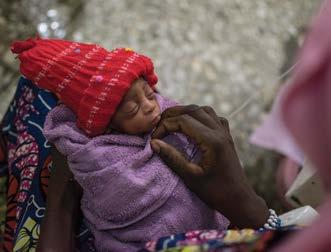
Jigawa state, in the northwest of the country, is estimated to have one of the highest maternal mortality rates in Nigeria. In Jahun General Hospital, our teams continued to provide comprehensive emergency obstetric and neonatal care. Of the 16,019 pregnant women admitted to the hospital in 2018, 63 per cent had complications. A specialised team performed 267 vesicovaginal fistula repair surgeries on women with obstetric fistula, a condition resulting from prolonged or obstructed labour. Our teams also supported basic emergency obstetric and neonatal care at three health centres in the area and increased our focus on raising community awareness of antenatal care.
In two clinics in Port Harcourt, Rivers state, Médecins Sans Frontières offered medical care and psychosocial support to an increasing number of people who had experienced sexual violence. Over 1,400 patients were treated in 2018, 61 per cent of whom were under 18 years of age.
The Médecins Sans Frontières Emergency Team, ‘E-Prep’, continued to conduct surveillance and response activities in cases of natural and man-made disasters and epidemics. In 2018, the team responded to cholera outbreaks in Bauchi, Katsina and Plateau states, treating a total of 8,560 people. In Bauchi, we supported the Ministry of Health to implement an oral cholera vaccination campaign which reached more than 1.1 million people. In Benue state, hundreds of thousands of people were displaced by interethnic conflict over natural resources. In February, we responded by setting up healthcare services in Makurdi, Logo and Guma camps, and conducting water and sanitation activities.
Of the 16,019 pregnant women admitted to the hospital in 2018, 63 per cent had complications.
KEY ACTIVITIES: Cutaneous
Mother and child health remains a focus for Médecins Sans Frontières in Pakistan, where access to healthcare is challenging, especially in isolated rural communities and urban slums.
Pregnant women die from preventable complications during pregnancy and delivery, and newborn care is unavailable in many parts of the country. Even where it is available, many cannot afford it.
FUNDING: TOTAL MSFA
$5,066,567 $1,000,000
FIELD STAFF: 231
IMPACT: 4,900 births assisted
At Peshawar Women’s Hospital, in Khyber Pakhtunkhwa, around 75 per cent of the patients come from rural areas of the district and what were previously known as the Federally Administered Tribal Areas. Neonatal mortality rates are high. In 2018, we focused on high-risk pregnancies and people with reduced access to care, and we provided comprehensive 24 -hour emergency obstetric care. Our team assisted almost 4,900 births and admitted 600 newborns to the neonatal unit.
In May, we opened a cutaneous leishmaniasis treatment centre in Peshawar. Cutaneous leishmaniasis is a neglected tropical disease that is endemic in Pakistan. Transmitted by the bite of a sandfly, it is characterised by disfiguring and painful skin lesions. Although not fatal, it often results in stigma and discrimination, affecting patients’ daily life and mental health. The new centre was soon working at full capacity, showing the growing need for cutaneous leishmaniasis treatment in the region. A total of 1,380 patients were treated by the end of 2018. As well as safe and effective medication, we offered mental health support and raised awareness about treatment and prevention.
Taj Bibi (second from right), her husband and their six children were all treated at the Médecins Sans Frontières centre in Peshawar after being infected with cutaneous leishmaniasis.
“I was the first one in the family to be bitten by the sandfly and get infected. I went to see a local doctor who explained to me about the disease, but he said that no treatment was available in Pakistan. I was told that a treatment was available on the black market, so I started buying injections . . . but nothing changed, and in the meantime other members of my family started to be infected. After a year, we were finally recommended to come to the Médecins Sans Frontières treatment centre. The environment where we live is dirty, there is no drainage system, so a lot of people get infected in our neighbourhood. We will use repellent in the future so as not to be bitten again. All the family is getting better now.”
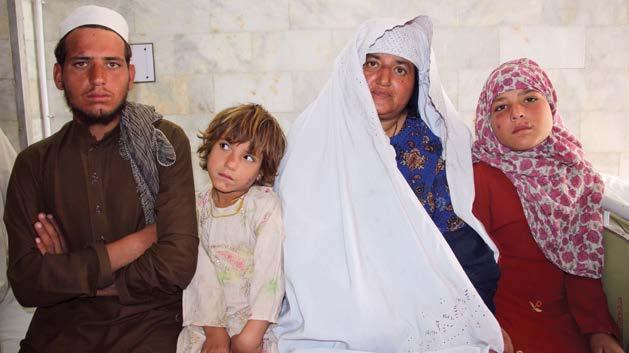
We focused on high-risk pregnancies and people with reduced access to care, and we provided comprehensive 24-hour emergency obstetric care.© Laurie Bonnaud/MSF
FUNDING: TOTAL MSFA $12,184,872 $1,500,000
In 2018, Médecins Sans Frontières provided specialist surgical and postoperative care to huge numbers of patients in Gaza and responded to growing mental health needs in the West Bank.
Gaza’s fragile health system was overwhelmed by the number of people returning from protests with complex gunshot wounds throughout much of 2018. According to the World Health Organization, 6,239 people were injured by Israeli army bullets during protests along the fence that separates Gaza from Israel between 30 March and 31 December. Nearly 90 per cent of these injuries were to lower limbs. Half were open fractures, often with serious damage to the bone; many of the others involved severe tissue loss and extensive damage to the nerves and vascular system. These injuries required long and careful follow-up. While Médecins Sans Frontières and other medical organisations provided initial lifesaving surgery for some of the wounded, the Ministry of Health provided the first line of response in most cases, stopping the bleeding and fitting external fixators for patients with more severe or complex fractures. After being discharged, many were admitted to our care for further surgery to clean and close large, open wounds and perform regular dressing changes.
Bone infection was a risk for many of the patients with open fractures: experience from Médecins Sans Frontières projects in other Middle Eastern conflict areas suggest that between 25 and 40 per cent may have been affected. The lack of laboratory capacity in Gaza meant it has not been possible to adequately test for infections in most patients – but the process of rebuilding the bone can only begin once a wound is stabilised and free of infection. These patients will continue to require long periods of care and physiotherapy to return function to badly damaged limbs.
By the end of 2018, Médecins Sans Frontières was supporting four clinics, offering wound dressings, physiotherapy and pain management. We also increased our surgical capacity,
performing plastic and orthopaedic surgery in Al Shifa and Dar Al Salam hospitals.
Between 30 March and 31 December 2018, we admitted 3,389 trauma patients to our clinics, changed 102,871 dressings and conducted 63,868 physiotherapy sessions. Our teams operated on 729 trauma patients, performing 2,202 surgical interventions. In addition to our work with trauma patients, we provided care for burns patients, performing 135 operations and 207 surgical procedures for burns in 2018.
Despite the huge increase in our activities, the Gazan health system, already crippled by over 10 years of blockade, remained unable to cope with the large number of patients with complex injuries. It is therefore possible that a lack of capacity for reconstructive surgery, and the inability to prevent and treat bone infections, will lead to a wave of delayed amputations.
We continued to run mental healthcare programs in the West Bank, where the ongoing occupation, violence and socioeconomic insecurity have taken a severe toll on residents.
In the cities and villages of Nablus and Qalqilya governorates, we provided care for people with various moderate to severe mental health issues. The main illness we saw here was moderate to severe depression, which accounted for 40 per cent of cases and could in many cases be attributed to the occupation and the tensions and violence it creates. However, in 2018 our teams received an increasing number of cases of domestic violence, which also had a serious impact on mental health. We ran a total of 2,520 psychotherapy sessions in Nablus and Qalqilya throughout the year and admitted 284 new patients for care; 40 per cent of our patients were under 18 years old.
KEY ACTIVITIES: Tuberculosis care
FUNDING: TOTAL MSFA $7,491,781 $1,500,000
FIELD STAFF: 175
IMPACT: 1,720 patients started on treatment for tuberculosis
Tuberculosis (TB), the second-highest cause of mortality in Papua New Guinea, remained a key challenge for the country’s health services and the focus for Médecins Sans Frontières in 2018.
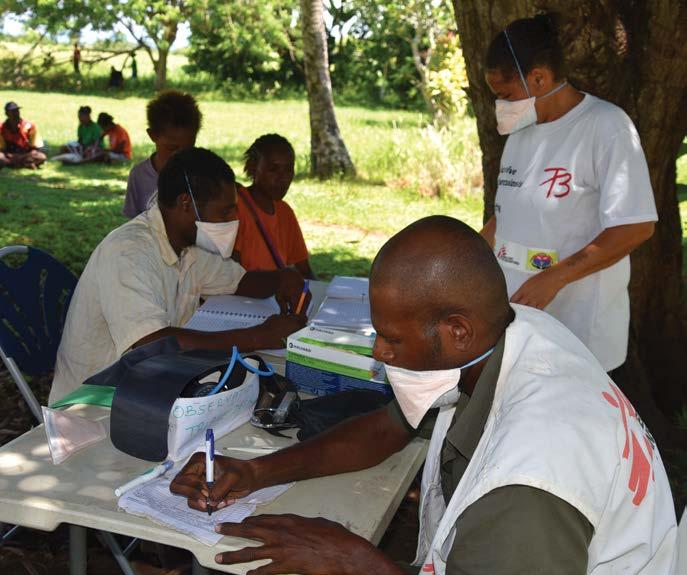
In collaboration with the national TB program, we are working to improve screening, diagnosis, treatment initiation and follow-up at Gerehu General Hospital in Port Moresby, the capital, and in the city of Kerema in Gulf Province.
In 2018, our priority was to improve patient care, adherence to treatment and treatment success. With this in mind, we started discussions with the Ministry of Health on the implementation of the World Health Organization’s new treatment recommendations.
The team in Port Moresby worked on patient follow-up and outreach activities to encourage, facilitate and improve adherence to treatment. Our patient numbers increased over the course of the year, suggesting
growing acceptance of Médecins Sans Frontières, while at the same time revealing the lack of screening and diagnostic services in the capital. We also scaled up our mobile activities, running clinics in remote areas in the Gulf Province and providing better access to diagnosis and treatment for patients previously excluded from these services for geographical, economic or cultural reasons. This decentralised model of care meant that patients did not need to come to a medical facility so frequently. We also introduced improvements in quality of care, with the integration of HIV testing, greater emphasis on counselling and closer monitoring of patients, their treatments and any side effects. In 2018, 1,720 patients were started on treatment for TB, including 62 patients with multidrug-resistant TB.
Our patient numbers increased over the course of the year, suggesting growing acceptance of Médecins Sans Frontières, while at the same time revealing the lack of screening and diagnostic services in the capital.
KEY ACTIVITIES: Sexual and reproductive healthcare, vaccinations, water and sanitation provision

FUNDING: TOTAL MSFA
$2,913,117 $500,000
FIELD STAFF: 40
IMPACT:
12,400 family planning sessions
In the Philippines, Médecins Sans Frontières focused on improving access to sexual and reproductive healthcare in slums in the capital Manila, and responded to violent clashes in the south.
In 2018, we continued to work with Likhaan, a local organisation, to provide comprehensive sexual and reproductive healthcare in the slums of San Andres and Tondo. Our services are aimed at young women in particular as they are among the most vulnerable and have significant healthcare needs.
We offered family planning, ante- and postnatal care, management of sexually transmitted infections and screening and treatment for cervical cancer. Although victims of sexual violence are stigmatised in the Philippines, we have seen a steady increase in the number of survivors presenting at our clinic for treatment. In addition, our teams operated a mobile clinic four times a week – mainly in Tondo, the capital’s largest and most densely populated slum – to reach patients who were unable to access the permanent clinic.
Our teams in Manila conducted 12,400 family planning sessions and screened 3,630 women for cervical cancer over the course of the year.
In 2018, we also had a team in Marawi city, in the then-named Autonomous Region in Muslim Mindanao. The region has the poorest health indicators in the Philippines and conflict is frequent. A five-month battle for control of Marawi in 2017 destroyed over 70 per cent of the city’s health facilities and left around 200,000 internally displaced people and returnees without access to basic healthcare. In 2018, we ran a measles vaccination campaign, then focused on water and sanitation needs, building latrines and water access points. In October, we started supporting the outpatient department and emergency room of one of the few remaining health centres in Marawi.
At the beginning of 2018, Médecins Sans Frontières worked to urgently stem a measles outbreak in Marawi that had proven fatal for several children in the community.
NAME: Jai Defranciscis
FROM: Home Hill, QLD
“It was a race against the clock to try to get the project running as quickly as possible, to prevent the further spread of this exceptionally contagious disease. In Marawi, vaccination coverage had been complicated by the long siege, displacement and the disruption and destruction of necessary health services. Our target age group was children under five years old, as they are the most at risk of measles. Their immune system isn’t developed enough to fight off infection.
FIELD ROLE: Nursing activity manager, Marawi, February to March 2018
© Alessio Mamo
“The two major challenges were vaccine stigma and overall security. Our teams mobilised around Marawi to provide educational information sessions about measles and the benefits and safety of vaccination. We were confined to working in certain areas of the city, due to the many uncleared zones affected by landmines and unexploded ordnance left over from the siege. We had to find mosques, schools, community halls, and other prominent buildings that were still accessible, to use as vaccination sites. Due to our speedy response, we were able to stem the outbreak from getting out of control and wreaking havoc on an already weak and susceptible population.”
Project locations funded by Australian donorsAlthough victims of sexual violence are stigmatised in the Philippines, we have seen a steady increase in the number of survivors presenting at our clinic for treatment.
KEY ACTIVITIES:
Emergency care, HIV/AIDS care, malaria care, maternal healthcare, snakebite care, tuberculosis care
FUNDING:
TOTAL MSFA
$41,564,095 $4,000,000
FIELD STAFF:
1,256
IMPACT:
25,000 patients treated for malaria in remote villages
Our community malaria project resumed at the onset of the peak malaria season, treating over 25,000 patients in 23 surrounding villages between June and December and referring severe cases to the hospital.
Civilians in South Sudan have borne the brunt of over five years of conflict. Around two million people have fled into neighbouring countries, and another two million are displaced within the borders. Healthcare is scarce or non-existent in many parts of the country, with less than half the population estimated to have access to adequate medical services. Around 80 per cent of services are delivered by non-governmental organisations such as Médecins Sans Frontières.
In Old Fangak, a remote, swampy region in the north, Médecins Sans Frontières continued to run the only secondary healthcare facility serving the many displaced people who have settled there. In 2018, the hospital provided 5,728 antenatal consultations and assisted 427 births. Our teams also travelled by boat into the surrounding communities to run mobile clinics and organise hospital referrals, and teams ran community health posts in remote locations around Lankien and Pieri.
At Aweil State Hospital, Médecins
Sans Frontières ran the paediatric, neonatology, maternity and burns wards, the emergency room and intensive care unit, and an inpatient therapeutic feeding centre. The maternity ward was filled to capacity in September; over 2018, our teams assisted 5,275 deliveries, including 174 by caesarean section.
Médecins Sans Frontières continued to run a 15-bed inpatient department in Yida camp, for refugees from South Kordofan, Sudan, but handed over our HIV and tuberculosis treatment program to another organisation in May 2018. Our teams also worked in the Nuba Mountains of South Kordofan, where in 2018 we provided 159,369 consultations and 36,332 vaccinations.
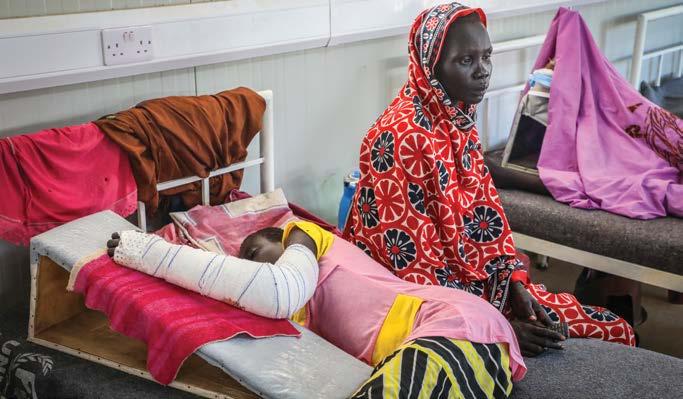
In Agok, teams finished renovating and extending our hospital, the only secondary health facility in the area of disputed territory between Sudan and South Sudan. There, teams continued to provide essential care including emergency surgery and treatment for HIV, tuberculosis, chronic diseases and snakebite envenomation.
Our community malaria project resumed at the onset of the peak malaria season, treating over 25,000 patients in 23 surrounding villages between June and December and referring severe cases to the hospital. In response to displacement caused by severe flooding in an unusually heavy rainy season, Médecins Sans Frontières deployed mobile teams to the southern part of the ASAA to provide healthcare and distribute relief items.
AL-GEDAREF
KEY ACTIVITIES: Emergency response, visceral leishmaniasis care
FUNDING:
TOTAL MSFA
$1,774,463 $500,000
FIELD STAFF: 52
IMPACT:
731 patients received hospital care for visceral leishmaniasis
By the end of 2018, there were nearly two million internally displaced people and 851,000 South Sudanese refugees registered in Sudan, as well as many other migrants in transit to Europe.
In 2018, Médecins Sans Frontières stepped up efforts to combat visceral leishmaniasis, or kala azar, a neglected but potentially fatal tropical disease spread by sandfly bites. Sudan has the highest rate of visceral leishmaniasis in East Africa, and Al-Gedaref state accounts for nearly 70 per cent of cases nationwide. Our teams organised education and raised awareness of the disease in the community, provided
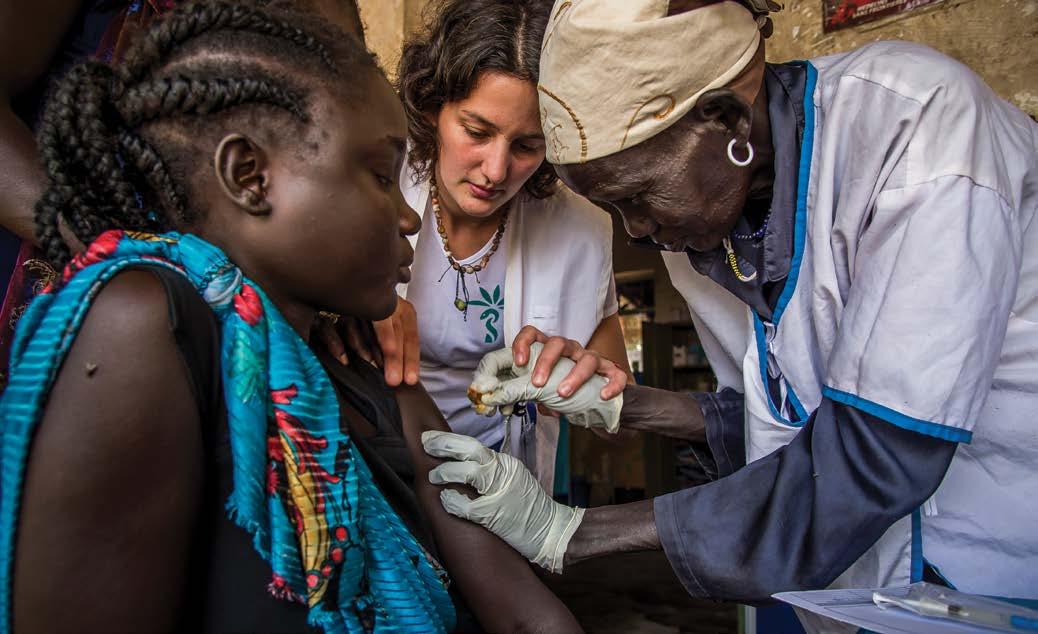
training for medical staff and supported diagnosis and case management in two hospitals in the region. A total of 731 patients were admitted for care throughout the year.
Our teams in Al-Gedaref also distributed relief kits in response to heavy rains and flash floods that affected over 220,000 people across much of Sudan and donated drugs to a local hospital.
Sudan has the highest rate of visceral leishmaniasis in East Africa.
War continued to rage in Syria in 2018, leaving millions of people in desperate need of medical and humanitarian assistance.
Civilians, and civilian areas and infrastructure, including medical facilities, came under direct fire again in 2018. Thousands of people were killed or wounded, and many more driven from their homes. Médecins Sans Frontières continued to operate in Syria but our activities were severely limited by insecurity and access constraints.
In the northern governorate of Idlib, where many people have settled after being displaced by the fighting around Damascus, Homs and Daraa, Médecins Sans Frontières focused on treatment of non-communicable diseases. In 2018, our teams supported primary healthcare in two clinics in the region and ran emergency mobile clinics to respond to an influx of displaced people. By the end of 2018, teams had provided 11,712 mobile clinic consultations and 4,833 consultations for non-communicable diseases at the clinics. Following intensive airstrikes in the south of Idlib and conflict in the north, we also supplied five hospitals with trauma kits for three months.
Meanwhile in Atmeh, in Idlib, we continued to run a specialised burns unit that provided surgery, skin grafts, dressings, physiotherapy and psychological support. An average of 150 procedures a month were performed in 2018, and severe or complex cases were referred to Turkey by ambulance. When the Atmeh camps were hit by severe flash floods in December, we distributed tents, blankets and other relief items to the worst affected.
In large parts of the north-eastern governorates of Hassakeh and Deir ez-Zor, the situation was relatively calm in 2018. People previously displaced by the conflict in this part of Syria began returning home. However, intense fighting continued in some remote areas
of Deir ez-Zor, causing displacement into neighbouring governorates and many civilian casualties. In response, Médecins Sans Frontières teams worked to address the health needs of returnees and displaced people and offer lifesaving care to war-wounded patients.
As people started to return home, the emergency ward in the Hassakeh hospital (rehabilitated and supported by Médecins Sans Frontières) saw a surge in the number of patients wounded by landmines, booby traps, unexploded devices and remnants of war in and around their homes. More than half the patients were children. Teams at the hospital also treated war-wounded patients from the fighting in Deir ez-Zor. Overall, 12,358 consultations were carried out in the emergency ward. Many of the wounded had to travel up to six hours to obtain medical care, as most of the medical facilities in this vast region were damaged in the conflict.
In addition to working in the emergency room, our teams performed 2,244 surgical procedures, including caesarean sections, provided obstetric care and mental health support through 2,214 mental consultations, and ran the inpatient department, admitting a total of 1,146 patients. Despite the scale of the needs and the large volume of medical activities developed in this hospital, the evolving context led Médecins Sans Frontières to scale back its response at the end of 2018, leading to the closure of the project at the end of the year.
In Tabqa, we provided primary healthcare and mental health services and ran a leishmaniasis treatment program at our primary healthcare clinic, which was handed over to the Tabqa Health Council in October 2018. Teams working in Ain Issa refugee camp ran a dressings room, treated malnutrition and noncommunicable diseases, and provided mental healthcare and hospital referrals for a population of around 17,000 people.
KEY ACTIVITIES:
Malaria care, maternal healthcare, mental healthcare, nutrition, primary healthcare, secondary healthcare, sexual violence care
FUNDING: TOTAL MSFA
$10,359,484 $1,000,000
FIELD STAFF: 265
IMPACT: 50,945 sexual and reproductive healthcare consultations
Médecins Sans Frontières remained the main healthcare provider for almost 100,000 Burundian refugees in Nduta camp in northwest Tanzania.
By the end of 2018, Tanzania was hosting 326,942 refugees from both Burundi and Democratic Republic of Congo, 2 the majority in three camps: Nyarugusu, Nduta and Mtendeli. In Nduta, we ran a 151-bed hospital and four health posts (which provide basic healthcare in the community), as well as health promotion activities via a network of community health workers.
Outpatient services included mother and child care, nutritional support, mental healthcare and treatment for victims of sexual and gender-based violence. In 2018, Médecins Sans Frontières conducted 50,945 sexual and reproductive healthcare consultations and assisted in 6,446 deliveries. Our teams in Nduta registered a significant increase in the mental health needs among refugees, the main diagnoses being depression and anxiety, but psychiatric disorders as well. In addition to a sense of helplessness about what the future held, many patients
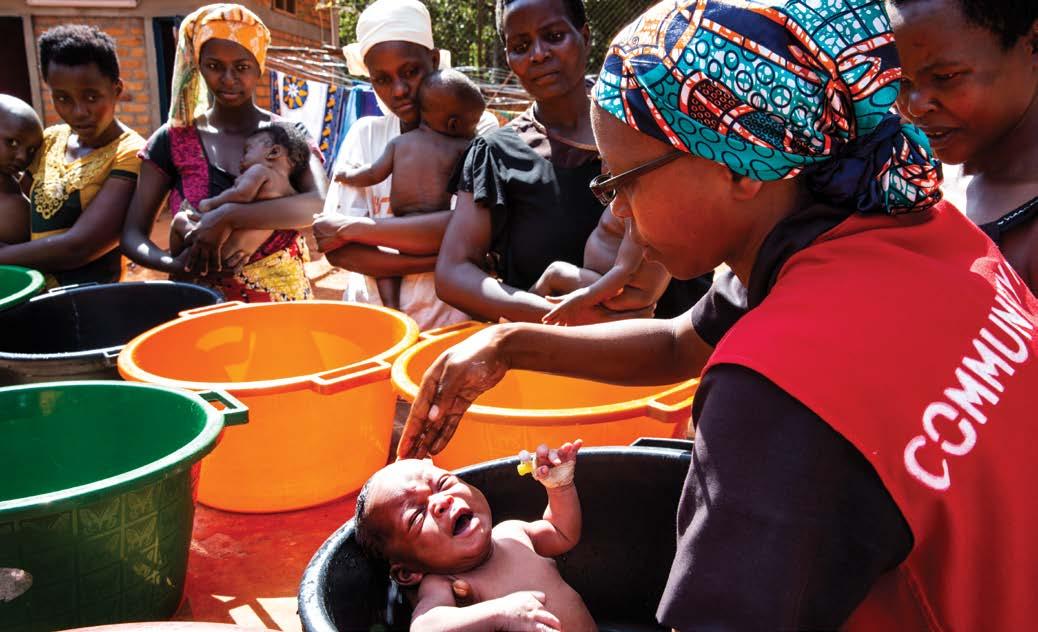
reported having experienced traumatic events and the loss of family members or friends. In total, 12,728 mental healthcare consultations were carried out in 2018.
Malaria remains a major medical problem in Nduta camp, particularly during the rainy season. We have been running comprehensive malaria prevention and control activities since 2016, including biological larviciding and mass distribution of second-generation insecticide-treated mosquito nets. These measures have proven effective, reducing the number of cases by more than half in our facilities in 2018, compared to 2017. In March 2018, the governments of Burundi and Tanzania and the United Nations refugee agency, UNHCR, confirmed their commitment to facilitating the voluntary repatriation of more than 70,000 Burundian refugees by the end of the year, adding yet another element of uncertainty for many.
KEY ACTIVITIES: HIV/AIDS care, mental healthcare, outbreak response, sexual and reproductive healthcare, sexual violence care
FUNDING: TOTAL MSFA
$12,396,244 $1,500,000
FIELD STAFF: 400
IMPACT:
47,500 oral cholera vaccines provided
Uganda hosts 1.1 million refugees, by far the largest number of any country in Africa. The country also has 1.2 million people living with HIV and faces regular outbreaks of communicable diseases.
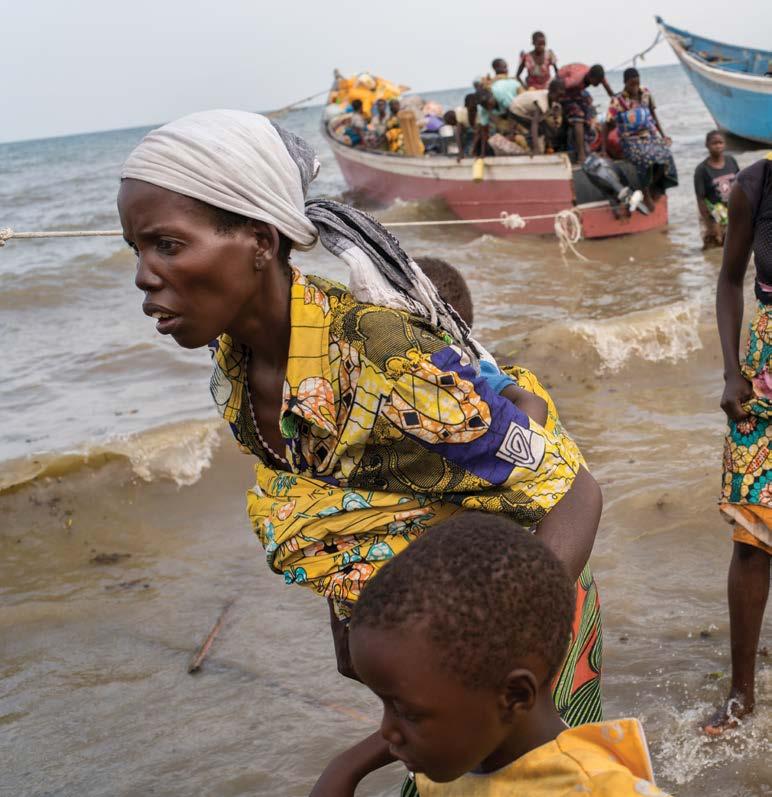
Focusing our activities on certain vulnerable groups who are disproportionately affected. In 2018 Médecins Sans Frontières provided screening, treatment and support for people living with HIV, as well as sexual and reproductive healthcare for adolescents and medical assistance for refugees.
According to the Uganda Population-Based HIV Impact Assessment, 1.2 million people in Uganda are living with HIV. Despite efforts to improve access to screening and care, significant gaps remain. Resistance to antiretroviral drugs results
in failures in first-and second-line treatment, and the availability and supply of third-line drugs can be erratic. In Arua, we provided advanced HIV care, including various point-of- care tests, treatment of cryptococcal meningitis (which results from low immunity), improvements in the clinical management of patients who have not achieved viral suppression, molecular drug-resistance testing and third-line treatment. Additional activities specifically aimed at children and young people included early HIV detection, peer group support and psychosocial counselling.
We provided clean drinking water and implemented a data collection system to monitor conditions and medical needs in the refugee settlements.
NAME:
Rosie SandersonFROM: Brisbane, QLD
FIELD ROLE:
Water and sanitation manager, Kyangwali, March to June 2018
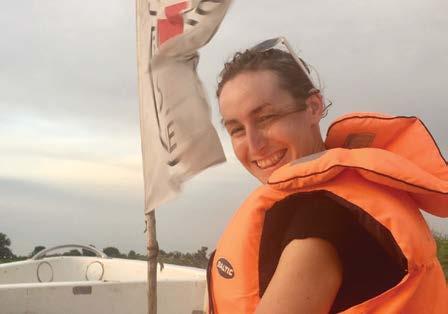
In February 2018, Médecins Sans Frontières responded to an outbreak of cholera among Congolese refugees who had recently arrived on the shores of Lake Albert in Uganda.
“Our water and sanitation team had two main responsibilities: to work alongside the medical teams to set up, maintain and manage cholera treatment units and oral rehydration points; and to prevent the spread of cholera around the camp by providing clean, safe water to the refugees. One of my proudest achievements was a collaborative effort: the Ugandan Red Cross had found a natural stream behind the refugee camp, and had set up a very small, simple but elegant treatment plant to supply water to the families. But they faced severe funding and material constraints. By putting our heads together, and with Médecins Sans Frontières providing technical, material and manpower support, we were able to go from providing 500 people with water to 10,000 every day. I’m proud of the work the team did in Kyangwali – running the cholera treatment units, providing clean drinking water, chlorinating water tanks and undertaking a massive cholera vaccination campaign all contributed to the outbreak being declared over by May.”
In Kasese, we focused on rural fishing communities around Lake Edward and Lake George. We supported the formation of community groups to increase access to HIV care and facilitate adherence to treatment, which contributed to improvements in viral load suppression rates.
In Uganda, adolescents are particularly vulnerable to sexually transmitted diseases and unwanted pregnancies, compared to adults. We opened a clinic for adolescents in Kasese in 2015 to provide sexual and reproductive healthcare services. More than 32,000 consultations were performed in 2018, with awareness-raising sessions and recreational activities also organised to increase participation.
More than 100,000 people fleeing violence in north-east Democratic Republic of Congo (DRC) crossed Lake Albert into Uganda’s Hoima district between late 2017 and early 2018. In February, the area was hit by a cholera outbreak, in which more than 2,500 cases were recorded, more than 40 per cent of them severe. We launched an emergency response, administering oral cholera vaccines to 47,500 people and ensuring the supply of clean water. Our teams in the refugee settlements also carried out measles and other routine vaccinations, medical consultations and sexual and reproductive healthcare services.
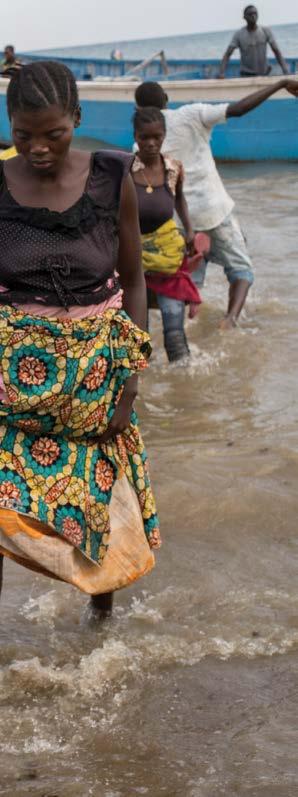
In Yumbe district, we have been providing inpatient and outpatient care, maternity services and vaccinations to South Sudanese refugees since 2016.
We provided clean drinking water and implemented a data collection system to monitor conditions and medical needs in the refugee settlements.
As the number of new arrivals from South Sudan began to decrease early in 2018, we handed over our basic medical services to other organisations and focused our efforts on mental healthcare and assistance for survivors of sexual violence. Services were rolled out in Imvepi and Rhino settlements, with outreach activities in Bidi Bidi starting in May.
KEY ACTIVITIES:
Hepatitis C care
FUNDING:
TOTAL MSFA
$1,056,228 $500,000
FIELD STAFF: 22
IMPACT:
2,354 outpatient consultations for people living with hepatitis C and HIV
In Ukraine, more than two million people (or five per cent of the population) are estimated to be living with hepatitis C.
Most of these people lack access to affordable, effective diagnosis and treatment. In 2018, we continued to run our hepatitis C project in Mykolaiv region, southern Ukraine, providing treatment with two direct- acting antivirals – daclatasvir and sofosbuvir – as well as free diagnostic tests, patient support, education and counselling services.
All hepatitis C patients receiving treatment in Mykolaiv are
co -infected with HIV and/or on opioid - substitution therapy to overcome drug addiction. The first group, who began treatment in 2017, were found to have an impressive cure rate of over 95 per cent. In 2018, Médecins Sans Frontières provided 2,354 outpatient consultations for people living with hepatitis C and HIV coinfection; and supported 386 patients through to completion of their treatments.
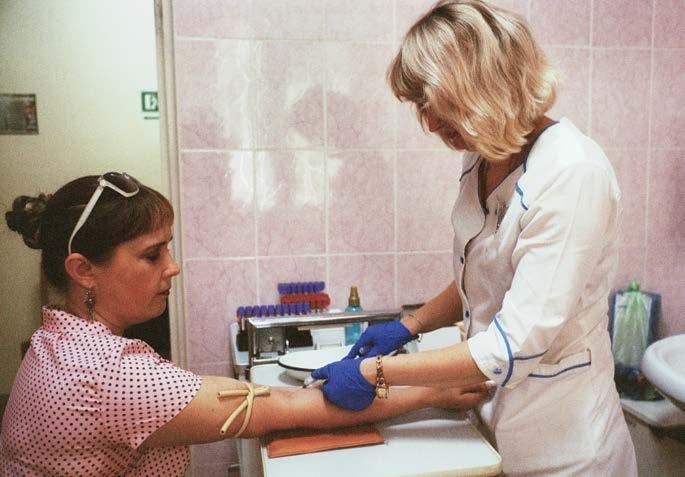
All hepatitis C patients receiving treatment in Mykolaiv are co - infected with HIV and/or on opioid-substitution therapy to overcome drug addiction.
After four years of war, the Yemeni health system is in ruins. The conflict escalated throughout 2018, with fast-changing frontlines and attacks against civilians and health facilities across the country.
Insecurity and access constraints prevented us – and other organisations – from collecting reliable data on the nutritional and humanitarian needs across the country. Our teams treated children for malnutrition across Sa’ada, Amran, Ibb and Taiz governorates, but saw no signs of impending famine –contrary to what the United Nations and others were suggesting.
The number of war-related deaths, and therefore the scale of the war, was also misrepresented in 2018, when the official number of war-related deaths remained 10,000 – unchanged since 2016. This has since been countered with a more realistic, but still conservative, estimate of 60,000.
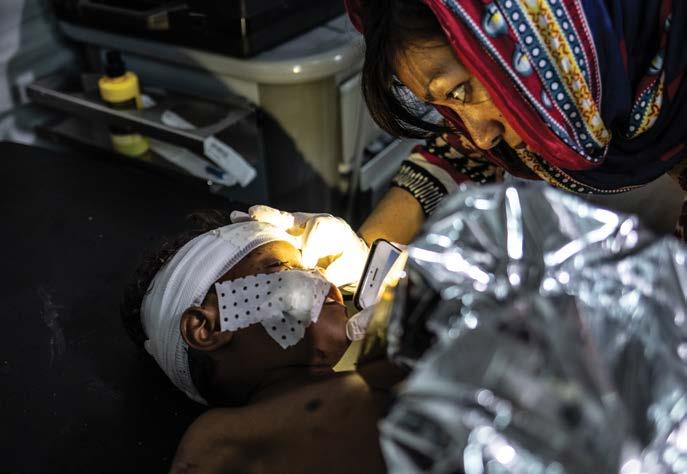
On 13 June 2018, Saudi and Emirati-led coalition (SELC)-backed forces loyal to President Hadi launched an offensive to seize Hodeidah from Ansar Allah troops. In response to the intense fighting along this frontline over the following three months, Médecins Sans Frontières opened a surgical hospital in Mocha in August and performed almost 1,300 major surgical interventions by
the end of the year. As well as patients with war wounds, our teams received pregnant women with complications requiring urgent surgery.
Patients were also referred to our trauma centre in Aden, where Médecins Sans Frontières conducted more than 6,000 emergency consultations and performed more than 5,400 surgeries – 90 per cent of them related to violent injuries – in 2018.
According to the independent monitoring group Yemen Data Project, 17,729 civilians were injured or killed in SELC air raids between 2015 and 2018 inclusive, with Sa’ada the worstaffected in 2018. During 2018, the governorate was targeted by 1,306 air raids – 39 per cent of all recorded air raids and more than in any other year since 2015. Our teams continued to work in the Haydan hospital in Sa’ada, which has now been fully rebuilt after being destroyed by an SELC airstrike in 2015.
The Yemeni health system has been devastated across the whole country,
On the western coast, one of the gravest medical issues in 2018 remained the lack of surgical capacity.
but most evidently in the northern governorates, where SELC airstrikes intensified at the end of 2017 and into 2018. Many local medical staff – whose salaries had been paid since August 2016 – have left, and few hospitals are still functional. Yemenis struggle to access and afford basic commodities such as fuel, food and medicine because of a broken economy, and the commercial closure of Sana’a airport has prevented people from seeking treatment abroad.
In response to the vast gap in services for women and children in particular, Médecins Sans Frontières provided maternal and paediatric healthcare in Amran governorate in 2018. Teams provided 3,352 maternity consultations, assisted 2,852 births and admitted 624 children to our inpatient therapeutic feeding centre.
On the western coast, one of the gravest medical issues in 2018
remained the lack of surgical capacity. In the 450-kilometre stretch between Hodeidah and Aden, a six to eight-hour drive, the Médecins Sans Frontières hospital in Mocha was the only facility with an operating theatre serving the local population.
Between August and December 2018, our teams in Mocha treated more than 150 people wounded by landmines, improvised explosive devices and unexploded ordnance. A third of them were children who had been playing in fields. In September, a Conflict Armament Research report pointed to Ansar Allah’s large-scale mass production of mines and improvised explosive devices, as well as its use of anti-personnel, vehicle and naval mines.
In Kilo, a city located between Ibb city and Taiz, Médecins Sans Frontières continued to work on improving the surgical capacity, intensive care unit, emergency ward and inpatient
department of one of the main hospitals. The team performed an average of 79 surgical interventions per week, reaching a total of 4,066 by the end of 2018. Overall, 6,127 consultations were carried out in the emergency room, 40 per cent of which were for trauma.
In January 2018, Médecins Sans Frontières rehabilitated a floor of the Al Sadaqa hospital, in Aden governorate, and provided medical equipment and training to hospital staff to support the response to a diphtheria outbreak. Teams saw fewer cholera cases in 2018 than in 2017, but with conditions ripe for new waves of the disease, the threat remained. Our teams responded to cases of cholera in the capital, Sana’a, and in Khamir, Amran governorate.
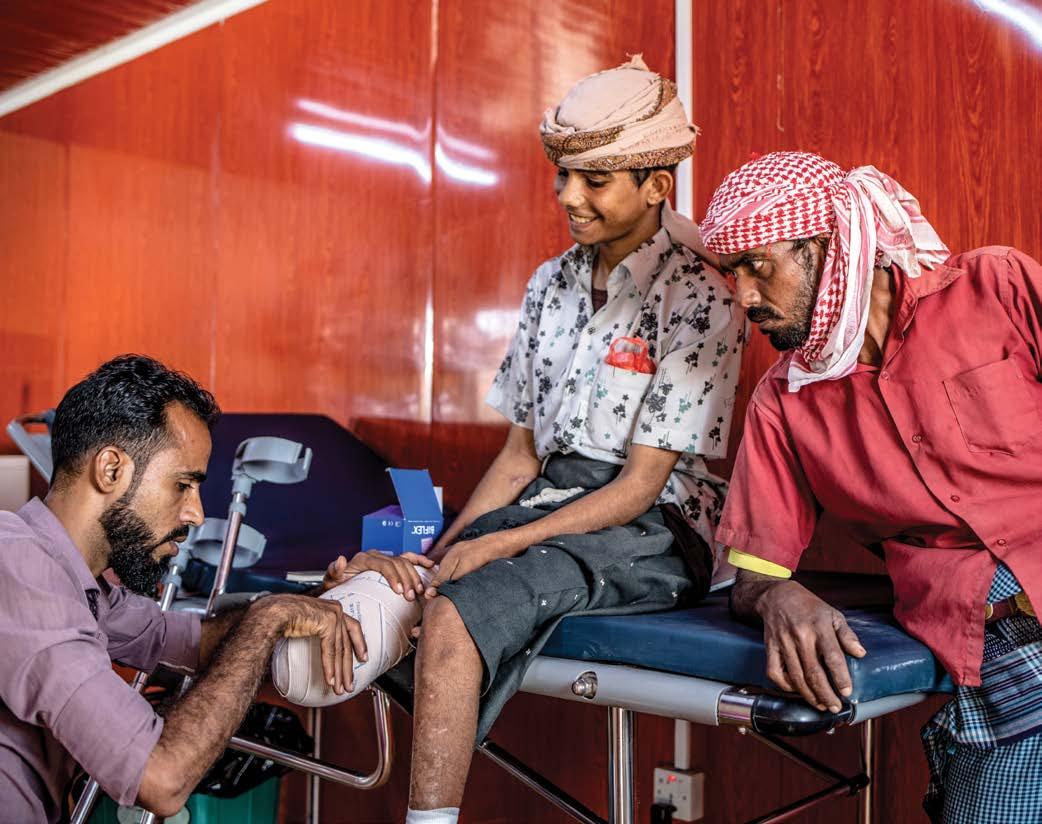 A patient receives physiotherapy at the Mocha hospital after he stepped on a landmine near his home. © Agnes Varraine-Leca
A patient receives physiotherapy at the Mocha hospital after he stepped on a landmine near his home. © Agnes Varraine-Leca
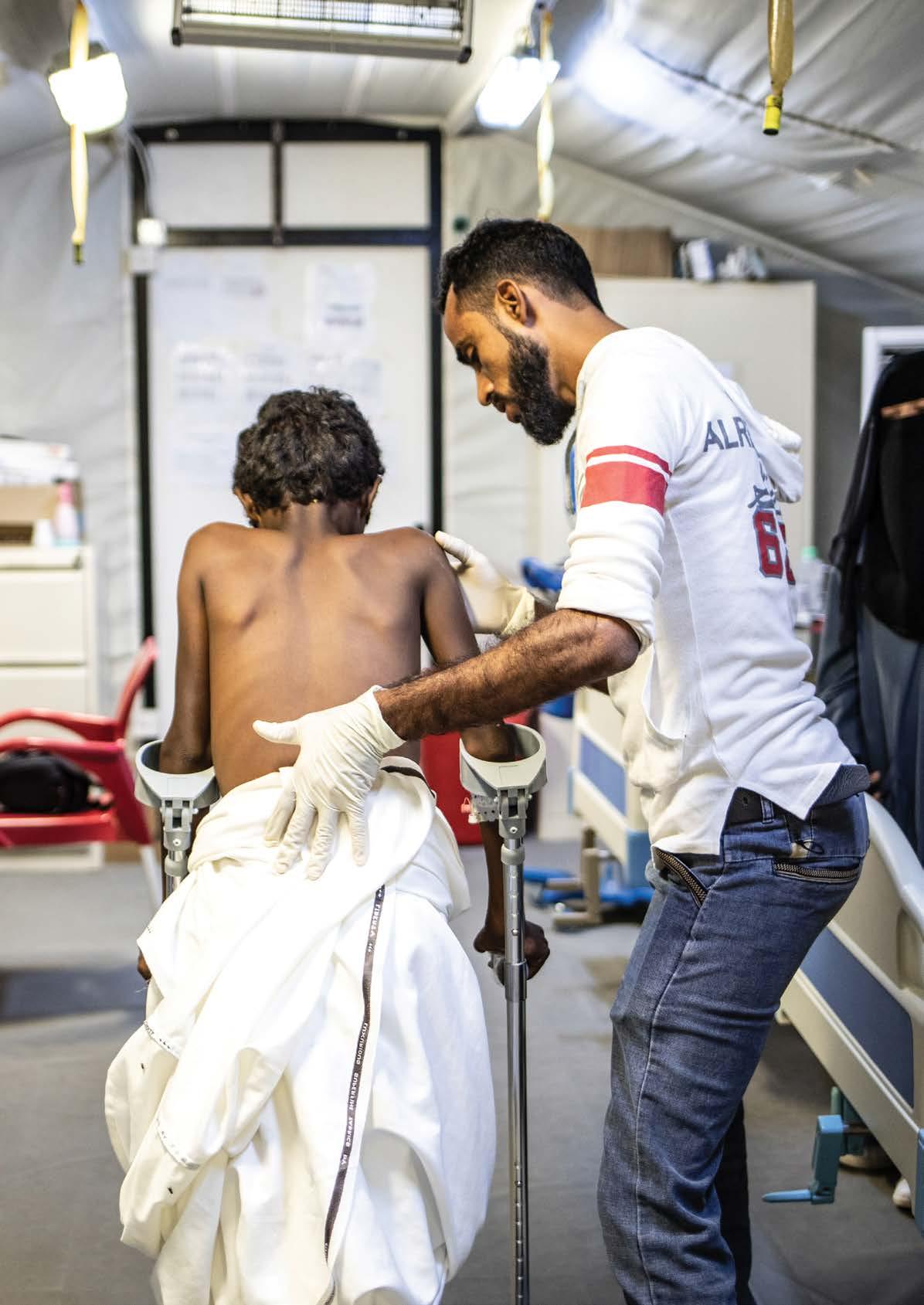 At the surgical hospital in Mocha, Yemen, a Médecins Sans Frontières physiotherapist helps a young patient to walk for the first time after he received emergency surgery following a landmine injury. © Agnes Varraine-Leca/MSF
Médecins Sans Frontières Australia Annual Report 2018 – 55
At the surgical hospital in Mocha, Yemen, a Médecins Sans Frontières physiotherapist helps a young patient to walk for the first time after he received emergency surgery following a landmine injury. © Agnes Varraine-Leca/MSF
Médecins Sans Frontières Australia Annual Report 2018 – 55
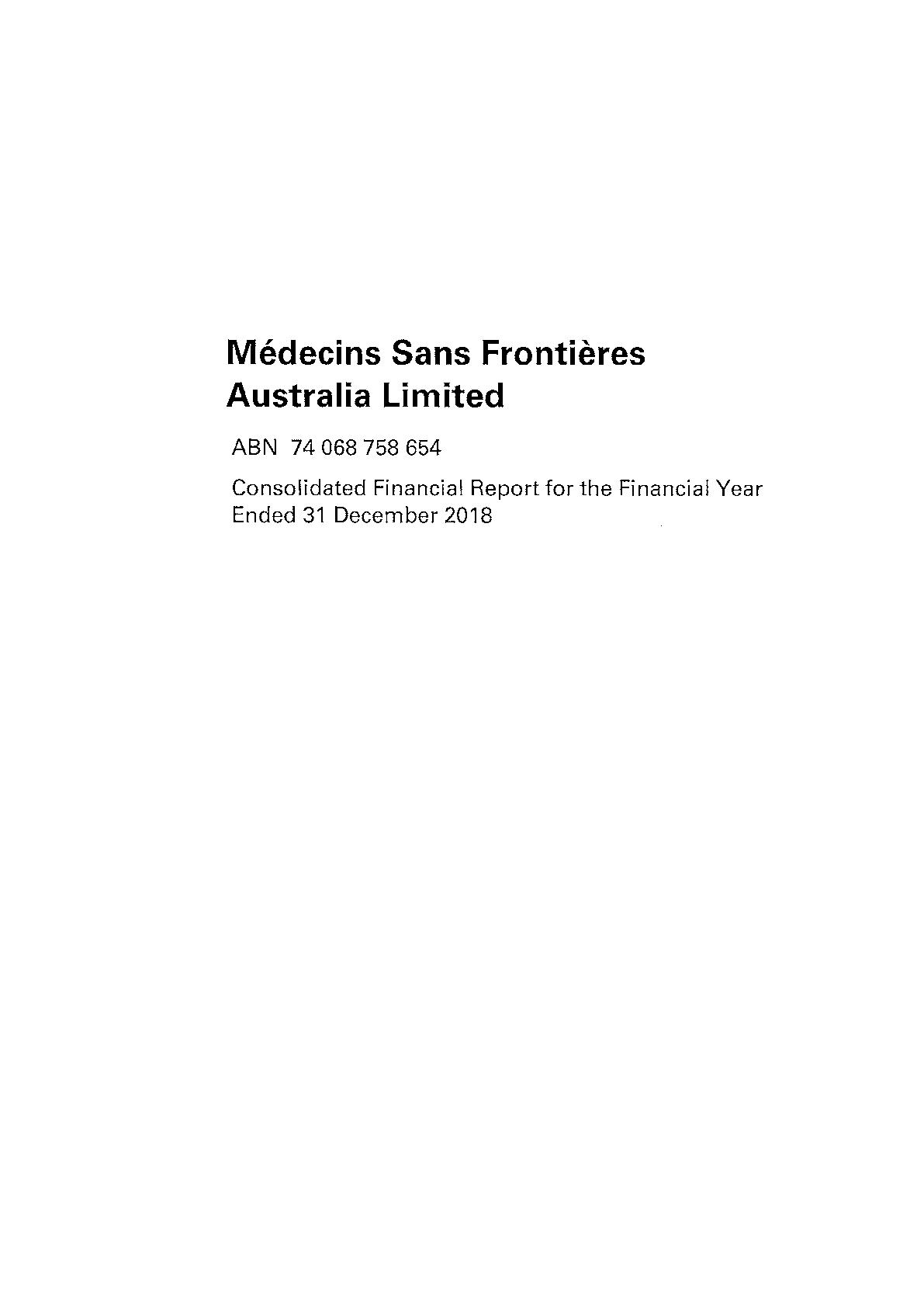

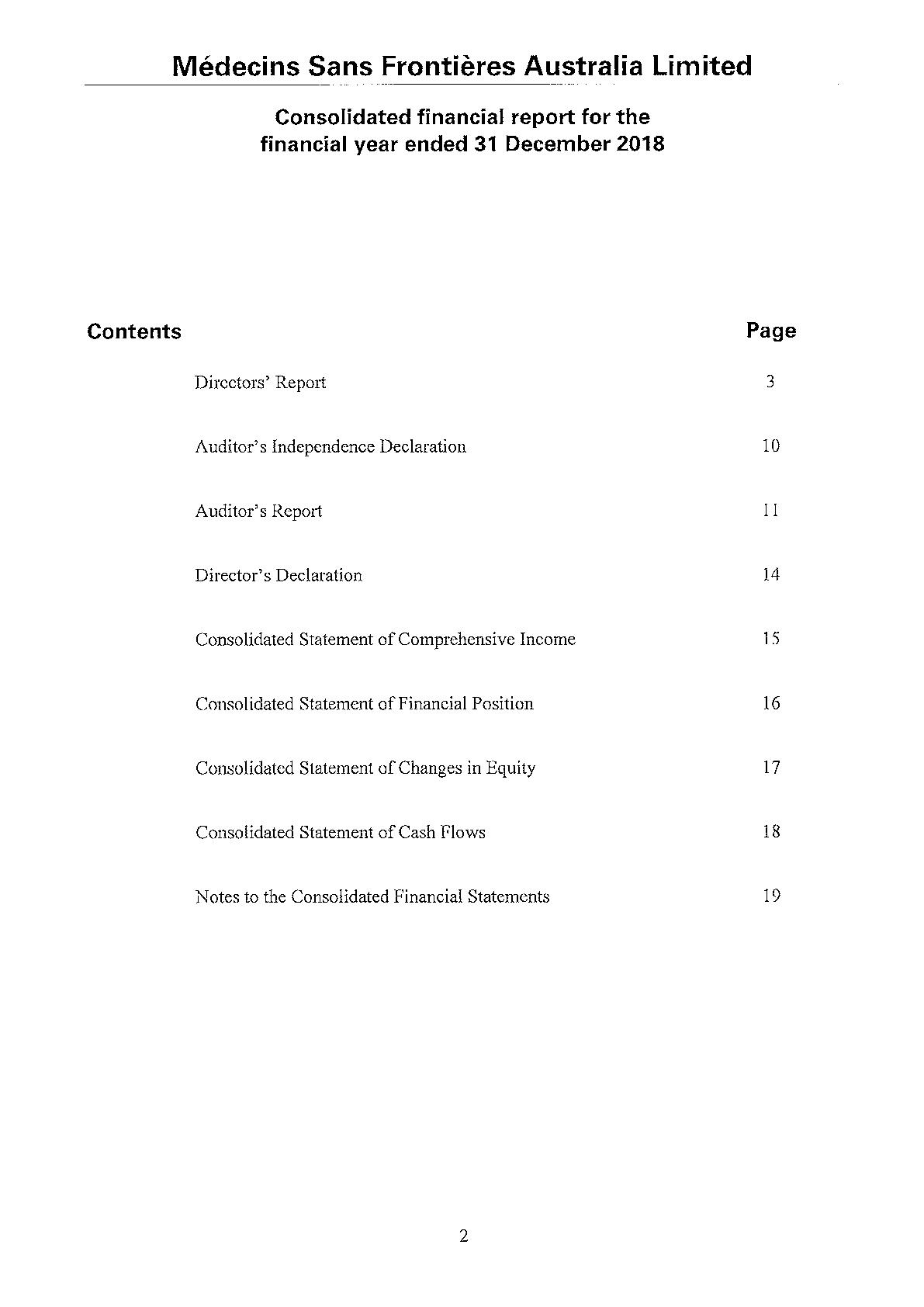
The directors of Medecins Sans Frontieres Australia Limited (the "Company") and its subsidiary ( collectively, the "Group") submit here with the annual financial report of the company for the financial year ended 31 December 2018.
The names and particulars of the directors during or since the end of the financial year are:
Dr Stewart Condon
Elected 28 May 2011, re-elected 26 April 2014, re-elected 6 May 2017. President Medecins Sans Frontieres Australia from 22 June 14. Resident of Australia. Locum Career Medical Officer - Emergency Department NSW Health. Attended eleven out of eleven Directors' meetings.
Ms Katrina Penney
Vice President from 31 August 2015. Elected 18 May 2013, re-elected 29 April 2016. Registered Nurse and Midwife. Educator for Cultural and Linguistically Diverse training. Resident of New Zealand. Attended eleven out of eleven Directors' meetings.
Mr Dwin Tucker
Ms Beth Hilton Thorp
Mr Anthony Flynn
Treasurer Medecins Sans Frontieres Australia from 29 April 2016. Elected to the Board 16 May 2015, re-elected 25 May 2018. Resident of Australia. Director Clearasound. Attended eleven out of eleven Directors' meetings.
Elected 18 May 2013, re-elected 29 April 2016. Lawyer and consultant. Resident of Australia. Attended nine out of eleven Directors' meetings.
Elected to the Board 26 April 2014, re-elected 6 May 2017. Registered Nurse. General Manager, Programs and Information Services, Asthma Foundation Queensland and New South Wales. Resident of Australia. Attended nine out of eleven Directors' meetings.
Mr Emmanuel Lavieuville
Dr Matthew Reid
Dr Philip Humphris
Dr Jacqueline Hewitt
Ms Patricia Schwerdtle
Dr Meguerditch Terzian
Dr Chatu Yapa
Elected to the Board 25 May 2018. Operations manager at Aspen Medical, Senior Program Office, Care Australia. Resident of Australia. Attended seven out of seven meetings.
Elected to the Board 16 May 2015. Medical Doctor. Public Health Medicine Specialist, Canterbury District Health Board. Resident of New Zealand. Attended three out of four Directors' meetings.
Appointed to a casual vacancy 31 August 2015, elected to the Board 29 April 2016. Medical Doctor. Resident of Australia. Attended four out of four Directors' meetings.
Appointed to a casual vacancy 31 August 2016, elected 6 May 2017. Medical Doctor. Paediatric Endocrinologist. Resident of Australia. Attended nine out of eleven Directors' meetings.
Appointed to the Board on 21 June 2017, elected 25 May 2018. Registered Nurse and Academic, Monash University. Attended ten out of eleven meetings.
Appointed to the Board on 6 March 2017. Medical Doctor. Resident of France. Attended ten out of eleven meetings.
Elected to the Board 25 May 2018. Medical Doctor. PhD Candidate, Australian National University. Resident of Australia. Attended seven out of seven meetings.
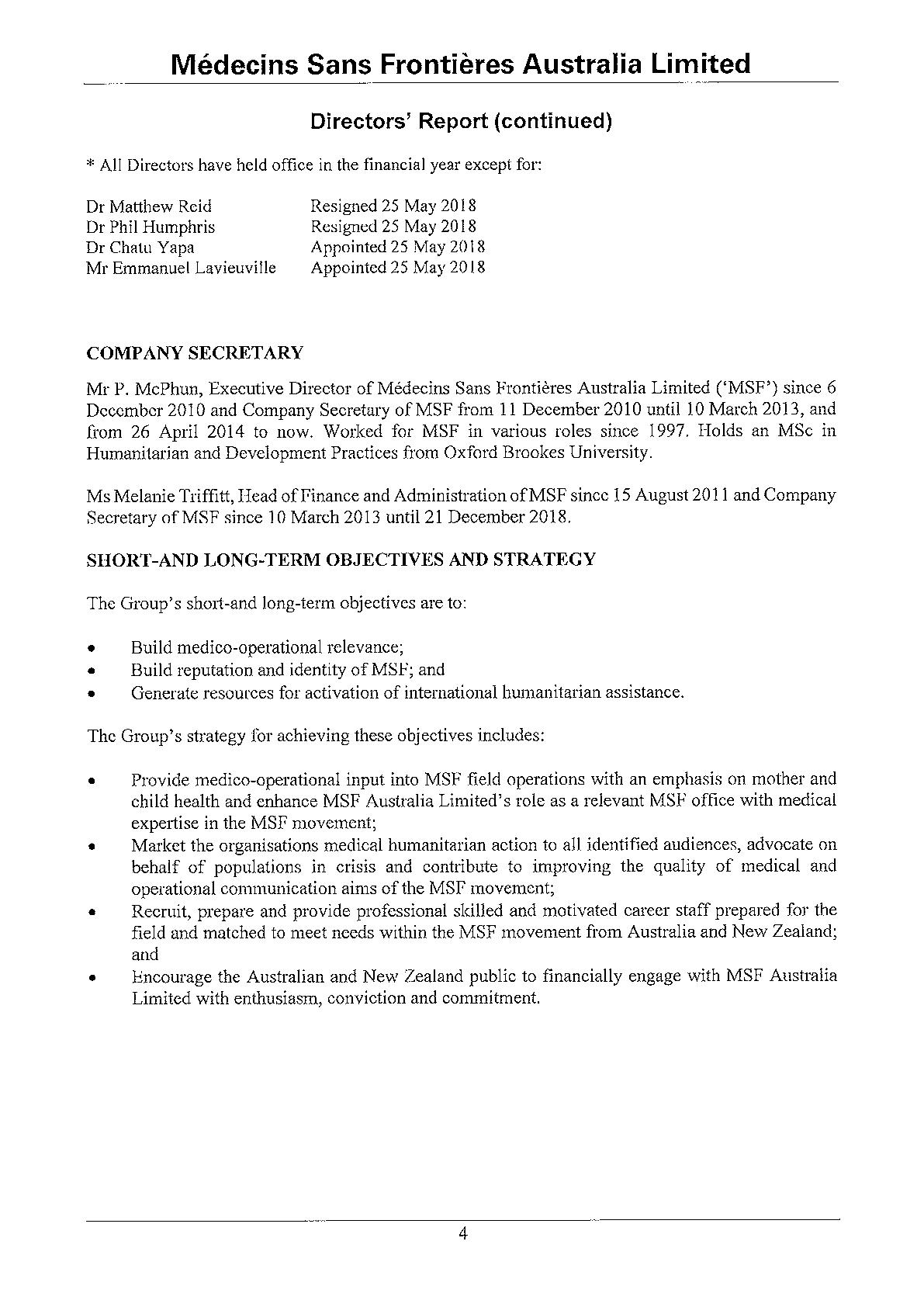
The principal activities of the Group during the :financial year to 31 December 2018 have been:
• Provision of medical expertise in mother and child health through direct visits to MSF medical humanitarian projects overseas, technical support and oversight, preparation of medical field staff, medical training, medico-operational research, medical communications and medical policy development.
• Operational participation in the field projects of the international movement of MSF, through :financing field operations assignment of field staff humanitarian relief workers; participation as faculty in various Australian and international training courses for such field staff; and evaluation missions to field projects.
• Community education in the form of dissemination of public information on humanitarian and development issues; provision of materials and source people to journalists in the print and electronic media; publication of newsletters; patiicipation in seminars; and guest lectureships at secondary schools and universities.
• Liaison with institutions and individuals in Australia and internationally, with a view to obtaining funding or other operational support for field projects, and for co-ordination with other organisations involved in overseas humanitarian relief.
• Fundraising from the general public in order to finance the field operations of MSF.
The nature of each of these activities has not changed significantly during the year. They are described in the Annual Review that will be available to the public from July 2019.
The Group measures performance through the establishment and monitoring of benchmarks including:
• Operational demand for Sydney Medical Unit expe1iise in mother and child health continues;
• Field communications, awareness raising, lobbying and advocacy furthered through intervention of the Sydney communications depatiment;
• Australian and New Zealand recruitment and placement executed to meet resource needs identified within the MSF movement;
• Propmiion of :financial resource spend between social mission and administrative costs within a range of 79-81% social mission and 19-21% administration costs; and
• 3 to 5% year on year growth in fundraising achieved over a multi-year timeframe.
The performance against these key performance indicators is as follows:
• 50 projects in 22 countries received technical oversight, field support and training in women's health and sexual violence.
• In 2018, our media activities suppmied all emergencies with a priority on the mental health of patients on Nauru, Rohingya people sheltering in Bangladesh, the Gaza March of Return and the conflict in Yemen. We created a campaign on the health needs of women in migration, which was shared by MSF offices worldwide. Advocacy was pursued to support the Rohingya and people on Nauru as above, plus the victims of snakebites. MSF Australia also took responsibility for the MSF Movement of the Speaking Out Case Studies.
• 75 new recruits and 213 field placements made during 2018 in accordance with identified needs;
• Financial resources allocated 79% social mission costs to 21% administration in 2018; and
• Private revenue in 2018 is lower than 2017 due to settlement of a bequest being delayed and expected to come through in 2019.
The net operating deficit for the financial year to 31 December 2018 was $4,893,699 (2017: operating deficit of $7,021,022). The decrease of the deficit is due to additional funds being remitted to the operational centres to reduce the cash balance in 2017 paitly offset by 2018 movements relating to increased investment in New Zealand and a decrease in revenue.
During the financial year there was no other significant change in the state of affairs of the Group, other than that referred to in the financial statements or notes thereto.
Medecins Sans Frontieres Australia Limited continued the strategy of face to face fundraising whereby the organisation contracts a third party to approach members of the public, in public places, to recruit new field partners. The financial impact continues to be that a cost is created at the outset that is more than made up over subsequent years of income. Medecins Sans Frontieres Australia Limited continues to diversify its sources of funding, and to increase the proportion of funding that comes from regular field partner donations.
Medecins Sans Frontieres Australia Limited continues to contract and pay field staff directly from Australia when they go to the field. Field staff are seconded to and managed by the operational centres running each project. The financial impact of this is not significant as the salary cost incun-ed by Medecins Sans Frontieres Australia Limited is recharged to the relevant operational centres.
In total, during 2018, Medecins Sans Frontieres Australia Limited committed $45,774,251 (2017: $50,034,979) of funds to the field to Medecins Sans Frontieres France, and $19,617,536 (2017: $21,443,563) to Medecins Sans Frontieres Switzerland.
In selecting the projects which Medecins Sans Frontieres Australia Limited supports through its grant payments to Operational Centre Paris and Operational Centre Geneva, the D F AT list of developing countries is consulted to ensure compliance requirements are fulfilled.
Over the course of the year the Group has received donations in kind from a number of sources. These donations may be physical assets for use in the Group, items to be sent to the field or services provided to Medecins Sans Frontieres at reduced rates.
The value of donations in kind received during the year to 31 December 2018 is $291,991 (2017: $370,291). This amount has been brought to account in the financial statements.
In addition to donations in kind the Group recruits a number of staff in the field for Medecins Sans Frontieres operational centres. There are five Medecins Sans Frontieres operational centres and they are located in Belgium, France, Holland, Spain and Switzerland. Many of the field staff are professional staff. The Group estimates that the total salaries forgone by field staff working within their professional capacity in Australia for the year ended 31 December 2018 to be approximately $5,204,070 (2017: $4,866,479).
The Group estimates that the total salaries forgone by field staff working within their professional capacity in Australia who undertook missions of less than three months to be approximately $1,249,983 (2017: $1,337,923).
Medecins Sans Frontieres Australia Limited also have a number of volunteers who freely give their time in the Australia office to assist in office based activities. The estimated value of this is approximately $138,673 (2017: $158,800). This time donated by office volunteers, and salaries which would have been paid to the volunteers sent to the field, are not brought to account in the financial statements since they cannot be reliably measured ( estimates above are based on high level analysis only).
The Board of Directors (except for the President of the Board, who receives a partial salary) and Association also freely give their time to Medecins Sans Frontieres Australia Limited, the value of this has not been determined.
The mission of Medecins Sans Frontieres Australia Limited is to provide humanitarian assistance to populations in danger and to increase awareness of the plight of these populations. The international Medecins Sans Frontieres movement as a whole targets a social mission ratio whereby at least 80% of expenditure is directly devoted to this social mission. In 2018 Medecins Sans Frontieres Australia Limited spent $77,980,005 to the social mission therefore representing 79% of total expenditure (2017: $83,100,399 or 80% included $8.5m of extra grant payments). A number of factors impact the ratio and will continue to be ongoing factors:
• Nil government funding in 2018 (2017: $Nil), which is expected to continue in 2019.
• Maintaining sufficient levels of cash reserves in subsequent years to preserve the safety of operational funding.
• Responding to the operational needs of the operational centres.
• Administrative and Fundraising requirements.
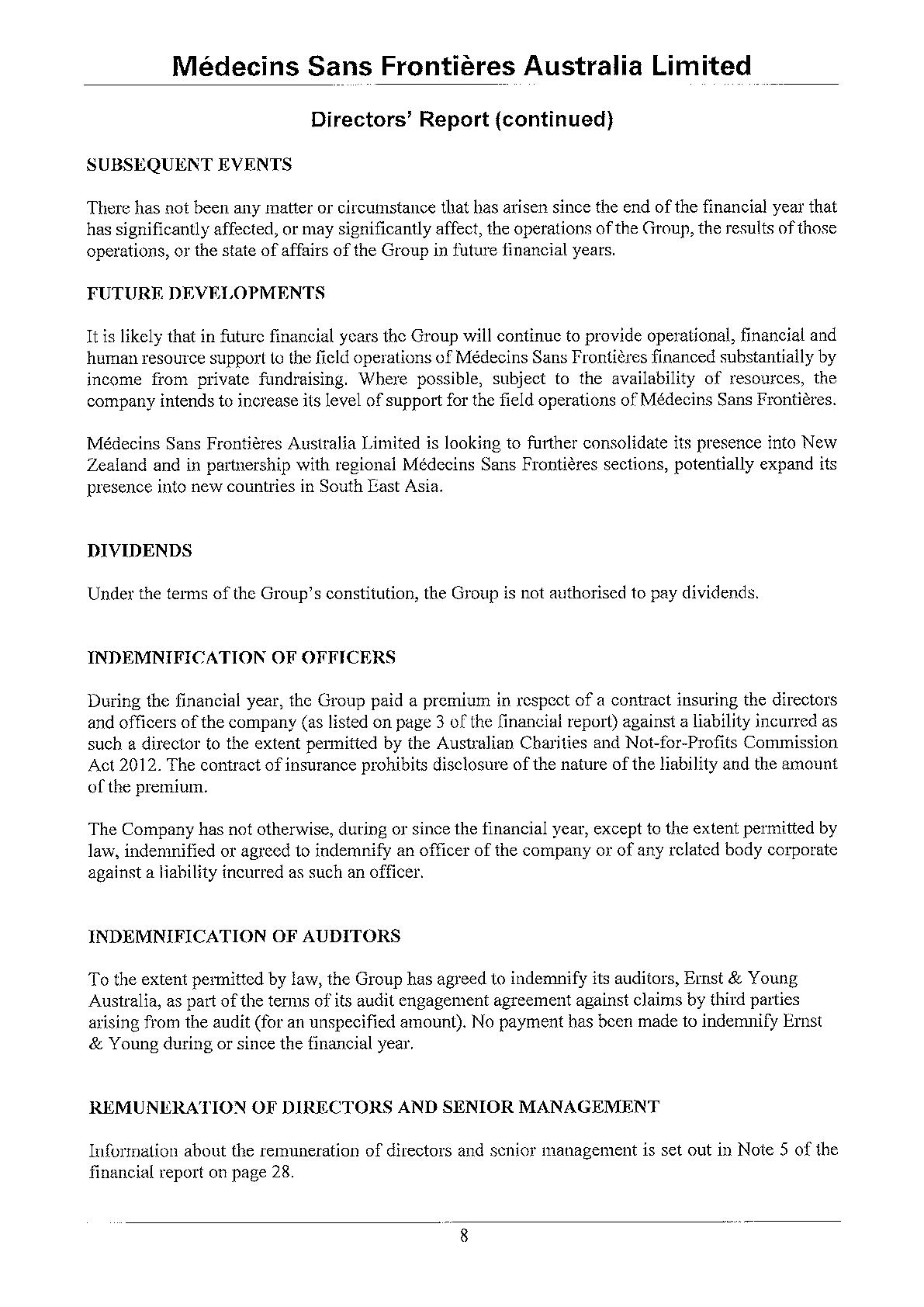
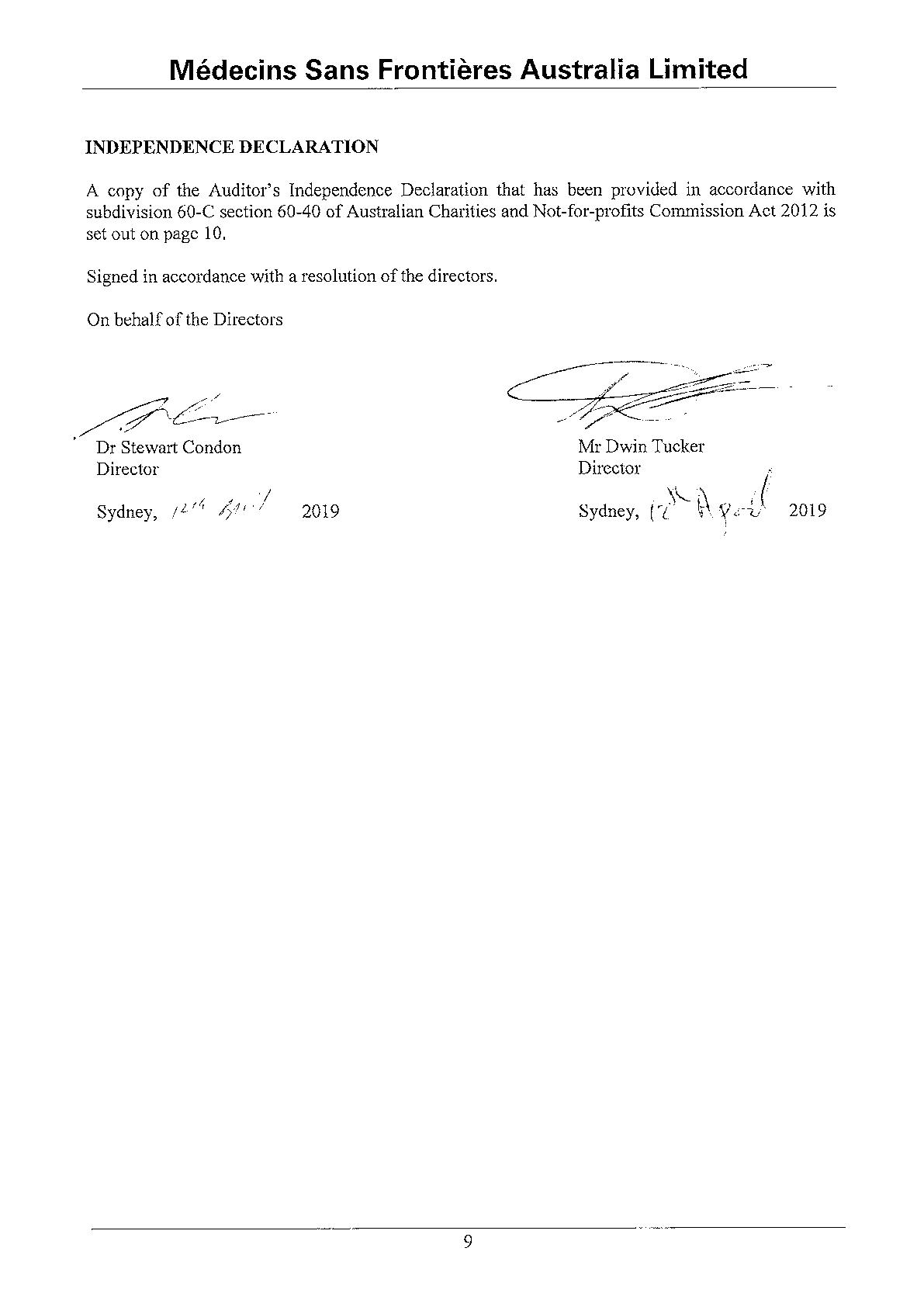
Tel: +61 2 9248 5555
Fax: +61 2 9248 5959 ey.com/au


In relation to our audit of the financial report of Médecins Sans Frontières Australia Limited for the financial year ended 31 December 2018, and in accordance with the requirements of Subdivision 60 -C of the Australian Charities and Not-for profits Commission Act 2012, to the best of my knowledge and belief, there have been no contraventions of the auditor independence requirements of any applicable code of professional conduct.
Ernst & Young Anton Ivanyi Partner12 April 2019
We have audited the financial report of Médecins Sans Frontières Australia Limited (the Company) and its subsidiaries (collectively the Group), which comprises the consolidated statement of financial position as at 31 December 2018, the consolidated statement of comprehensive income, consolidated statement of changes in equity and consolidated statement of cash flows for the year then ended, notes to the financial statements, including a summary of significant accounting policies, and the directors' declaration.
In our opinion, the accompanying financial report of the Group is in accordance with the Australian Charities and Notfor-Profits Commission Act 2012 , including:
a) giving a true and fair view of the consolidated financial position of the Group as at 31 December 201 8 and of its consolidated financial performance for the year ended on that date; and
b) complying with Australian Accounting Standards – Reduced Disclosure Requirements and the Australian Charities and Not-for-Profits Commission Regulation 2013
We conducted our audit in accor dance with Australian Auditing Standards. Our responsibilities under those standards are further described in the Auditor’s Responsibilities for the Audit of the Financial Report section of our report. We are independent of the Group in accordance with the ethical requirements of the Accounting Professional and Ethical Standards Board’s APES 110 Code of Ethics for Professional Accountants (the Code) that are relevant to our audit of the financial report in Australia. We have also fulf illed our other ethical responsibilities in accordance with the Code.
We believe that the audit evidence we have obtained is sufficient and appropriate to provide a basis for our opinion.
The directors are responsible for the other information. The other information is the directors’ report accompanying the financial report.
Our opinion on the financial report does not cover the other information and accordingly we do not express any form of assurance conclusion thereon.
In connection with our audit of the financial report, our responsibility is to read the other information and, in doing so, consider whether the other information is materially inconsistent with the financial report or our knowledge obtained in the audit or otherwise appears to be materially misstated.
If, based on the work we have performed, we conclude that there is a material misstatement of this other information, we are required to report that fact. We have nothing to report in this regard.
The directors of the Company are responsible for the prep aration of the financial report that gives a true and fair view in accordance with Australian Accounting Standards – Reduced Disclosure Requirements and the Australian Charities and Not-for-Profits Commission Act 2012 and for such internal control as the directors determine is necessary to enable the preparation of the financial report that gives a true and fair view and is free from material misstatement, whether due to fraud or error.
In preparing the financial report, the d irectors are responsible for assessing the Group’s ability to continue as a going concern, disclosing, as applicable, matters relating to going concern and using the going concern basis of accounting unless the directors either intend to liquidate the Group or to cease operations, or have no realistic alternative but to do so.
Our objectives are to obtain reasonable assurance about whether the financial report as a whole is free from material misstatement, whether due to fraud or error, and to issue an auditor’s report that includes our opinion. Reasonable assurance is a high level of assurance, but is not a guarantee that an audit conducted in accordance with the Australian Auditing Standards will always detect a material misstatement when it exists. Misstatements can arise from fraud or error and are considered material if, individually or in the aggregate, they could reasonably be expected to influence the economic decisions of users taken on the basis of this financial report.
As part of an audit in accordance with the Australian Auditing Standards, we exercise professional judgment and maintain professional scepticism throughout the audit. We also:
• Identify and assess the risks of material misstatement of the financial report, whether due to fraud or error, design and perform audit procedures responsive to those risks, and obtain audit evidence that is sufficient and appropriate to provide a basis for our opinion. The risk of not detecting a material misstatement resulting from fraud is higher than for one resulting from error, as fraud may involve collusion, forgery, intentional omissions, misrepresentations, or the override of internal control.
• Obtain an understanding of internal control r elevant to the audit in order to design audit procedures that are appropriate in the circumstances, but not for the purpose of expressing an opinion on the effectiveness of the Group’s internal control.
• Evaluate the appropriateness of accounting policies used and the reasonableness of accounting estimates and related disclosures made by the directors.
• Conclude on the appropriateness of the directors’ use of the going concern basis of accounting and, based on the audit evidence obtained, whether a materi al uncertainty exists related to events or conditions that may cast significant doubt on the Group’s ability to continue as a going concern. If we conclude that a material uncertainty exists, we are required to draw attention in our auditor’s report to the related disclosures in the financial report or, if such disclosures are inadequate, to modify our opinion. Our conclusions are based on the audit evidence obtained up to the date of our auditor’s report. However, future events or conditions may cause the Group to cease to continue as a going concern.
• Evaluate the overall presentation, structure and content of the financial report, including the disclosures, and whether the financial report represents the underlying transactions and events in a manner tha t achieves fair presentation.
• Obtain sufficient appropriate audit evidence regarding the financial information of the entities or business activities within the Group to express an opinion on the financial report. We are responsible for the direction, supervision and performance of the Group audit. We remain solely responsible for our audit opinion.
We communicate with the directors regarding, among other matters, the planned scope and timing of the audit and significant audit findings, including any significant deficiencies in internal control that we identify during our audit.
We have audited the financial report as required by Section 24(2) of the NSW Charitable Fundraising Act 1991 and the WA Charitable Collections Act (1946). Our procedures included obtaining an understanding of the internal control structure for fundraising appeal activities and examination, on a test basis, of evidence supporting compliance with the accounting and associated record keeping requirements for fundraising appeal activities pursuant to the NSW Charitable Fundraising Act 1991 and the NSW Charitable Fundraising Regulations 2015 and the WA Charitable Collections Act (1946) and the WA Charitable Collections Regulations (1947)
Because of the inherent limitations of any assurance engagement, it is possible that fraud, error or non -compliance may occur and not be detected. An audit is not designed to detect all instances of non -compliance with the requirements described in the above -mentioned Act(s) and Regulations as an audit is not performed continuously throughout the period and the audit procedures performed in respect of compliance with these requirements are undertaken on a test basis. The audit opinion expressed in this report has been for med on the above basis.
In our opinion:
a) the financial report of the Company has been properly drawn up and associated records have been properly kept during the financial year ended 31 December 2018, in all material respects, in accordance with:
i. sections 20(1), 22(1 -2), 24(1-3) of the NSW Charitable Fundraising Act 1991;
ii. sections 10(6) and 11 of the NSW Charitable Fundraising Regulations 2015;
iii. the WA Charitable Collections Act (1946); and

iv. the WA Charitable Collections Regulations (1947).
b) the money received as a result of fundraising appeals conducted by the Company during the financial year ended 31 December 201 8 has been properly accounted for and applied, in all material respects, in accordance with the above mentioned Act(s) and Regulations.
Ernst & Young Anton Ivanyi Partner Sydney 12 April 2019
Anton Ivanyi Partner Sydney 12 April 2019
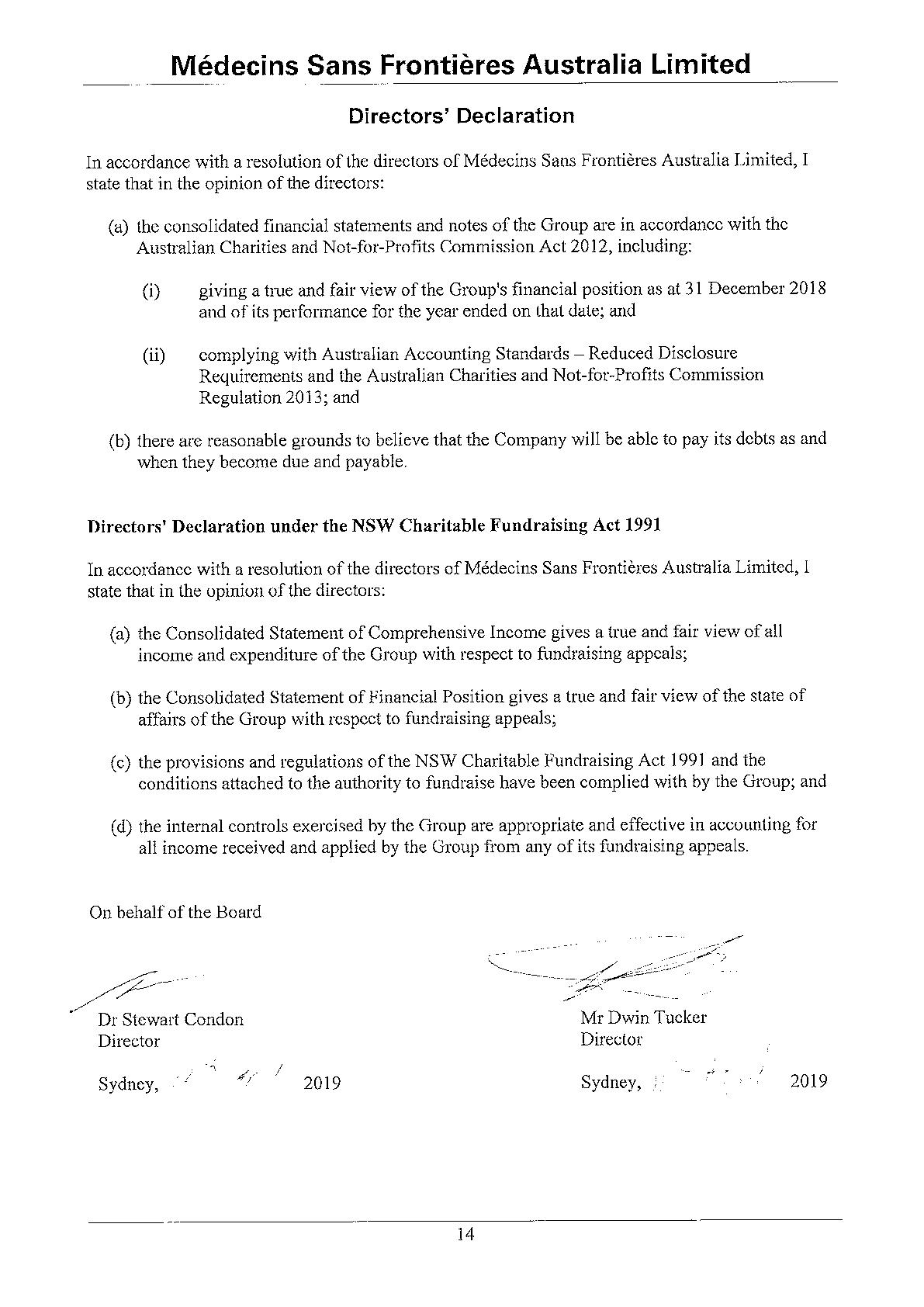
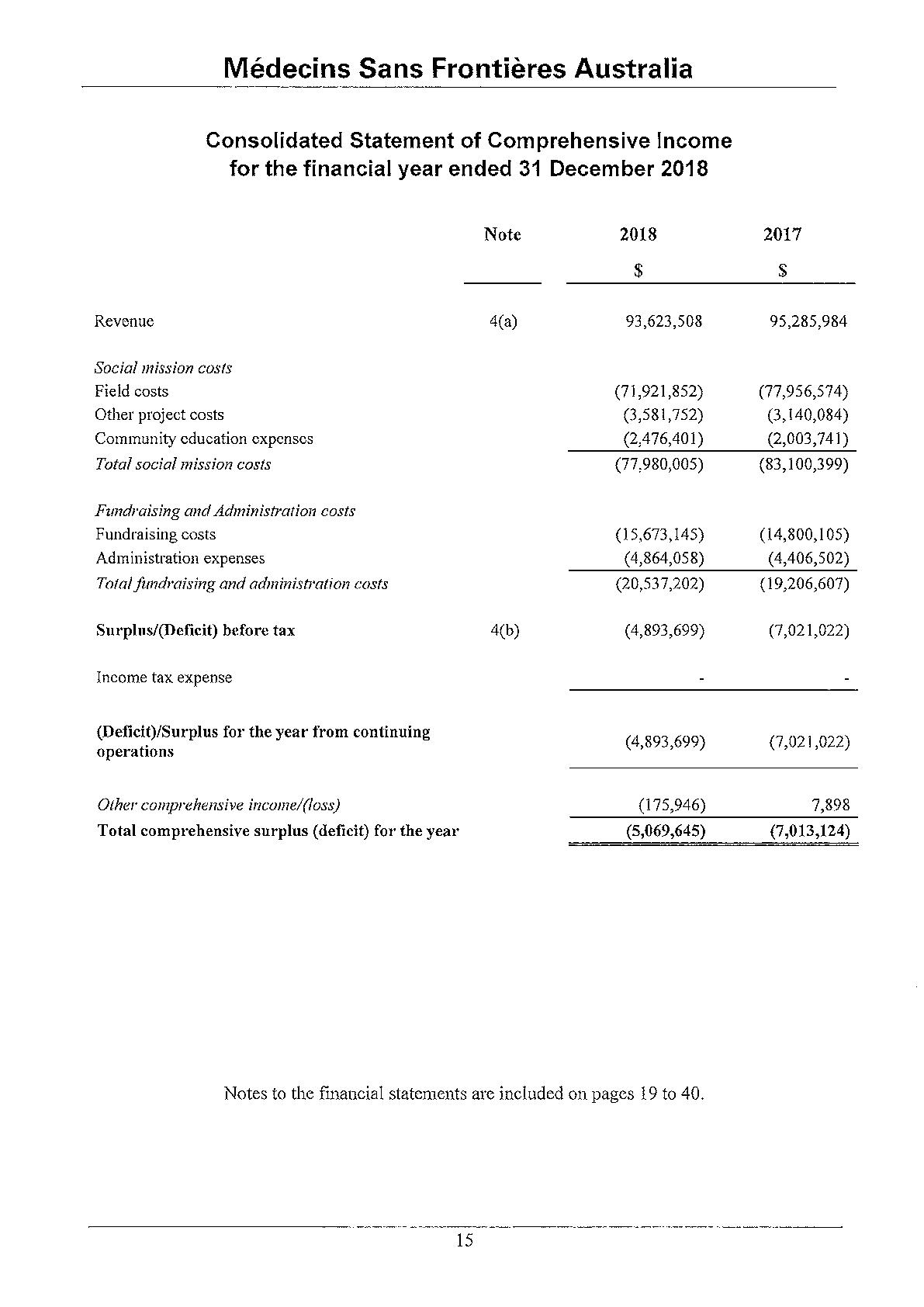
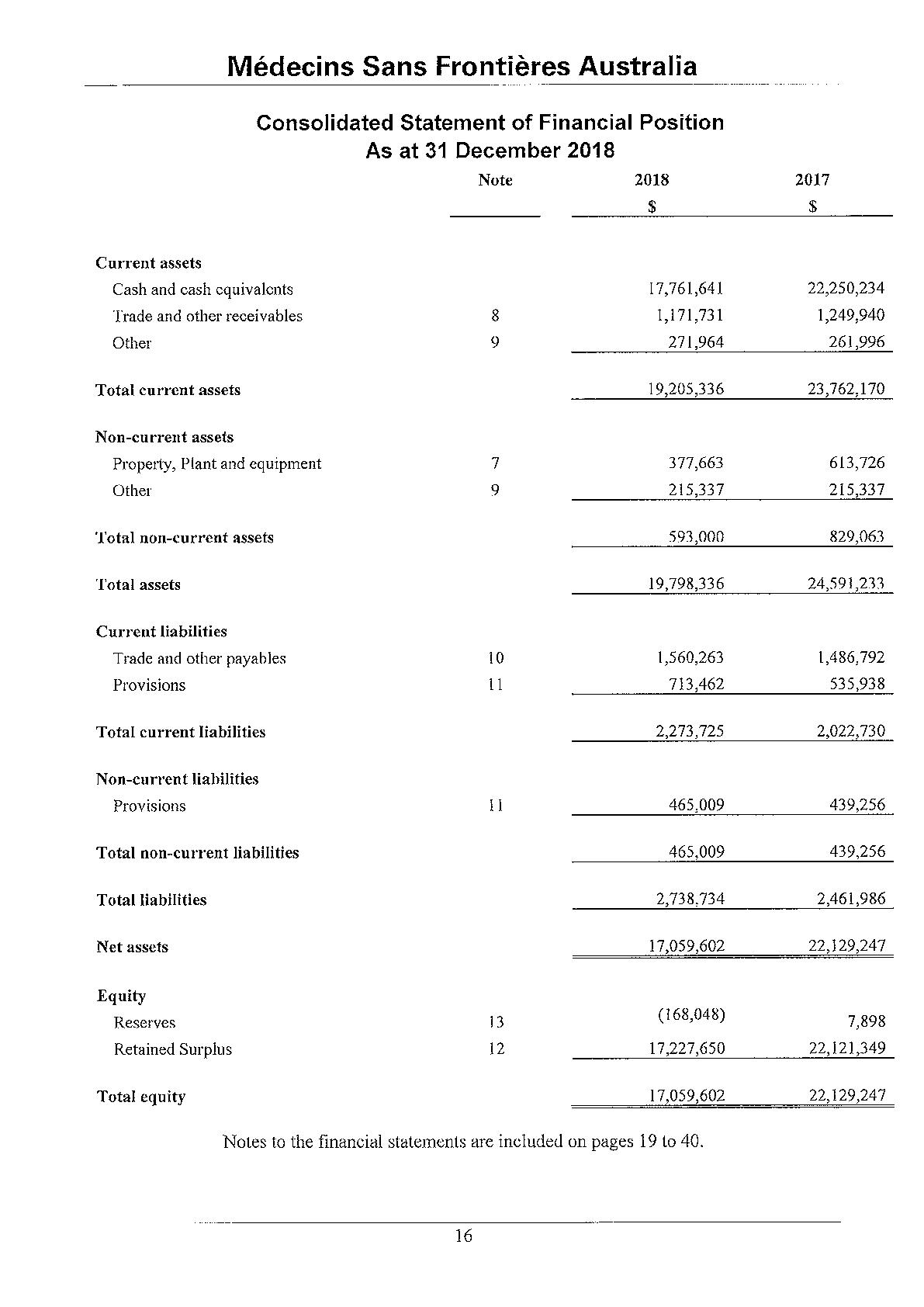
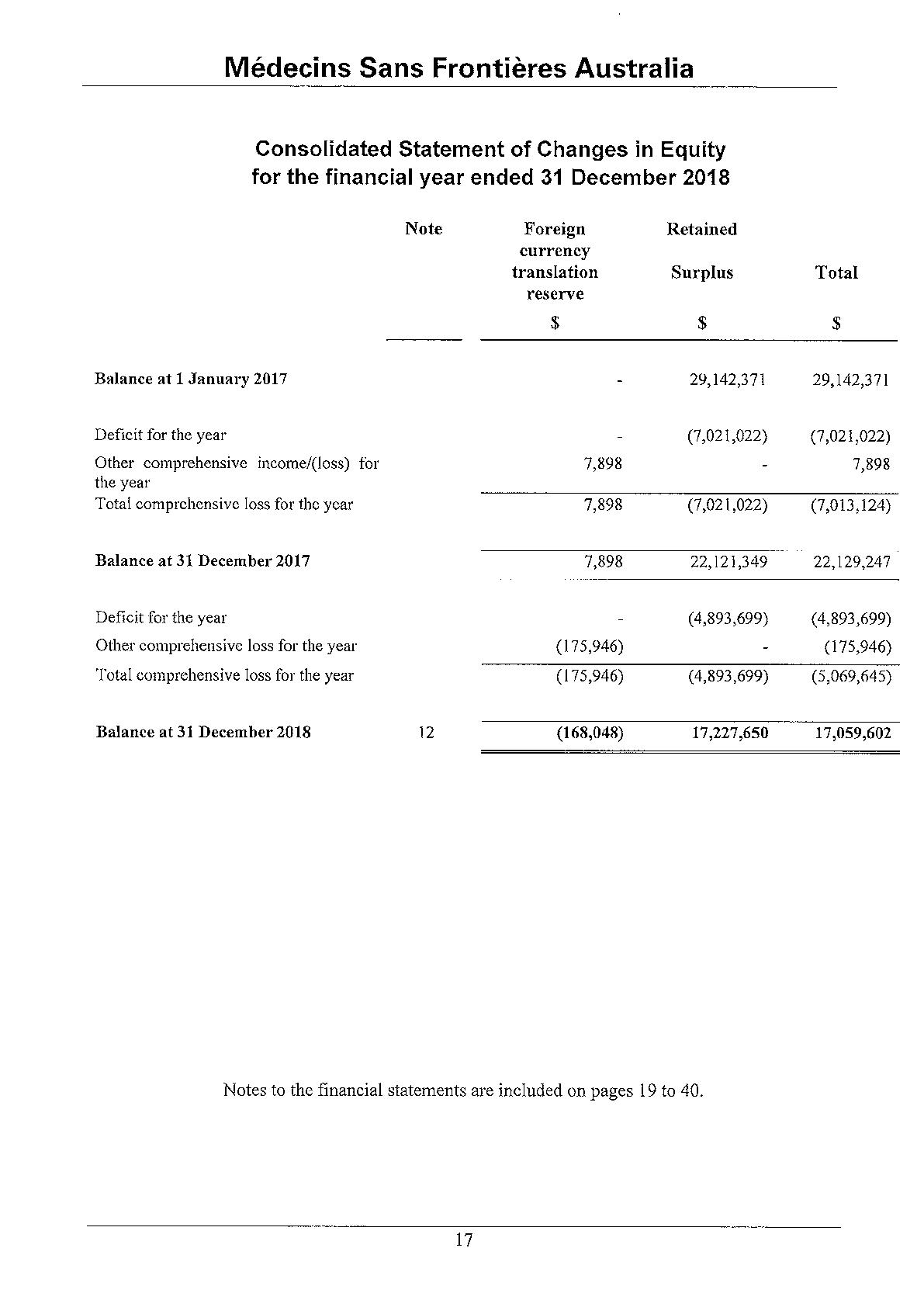
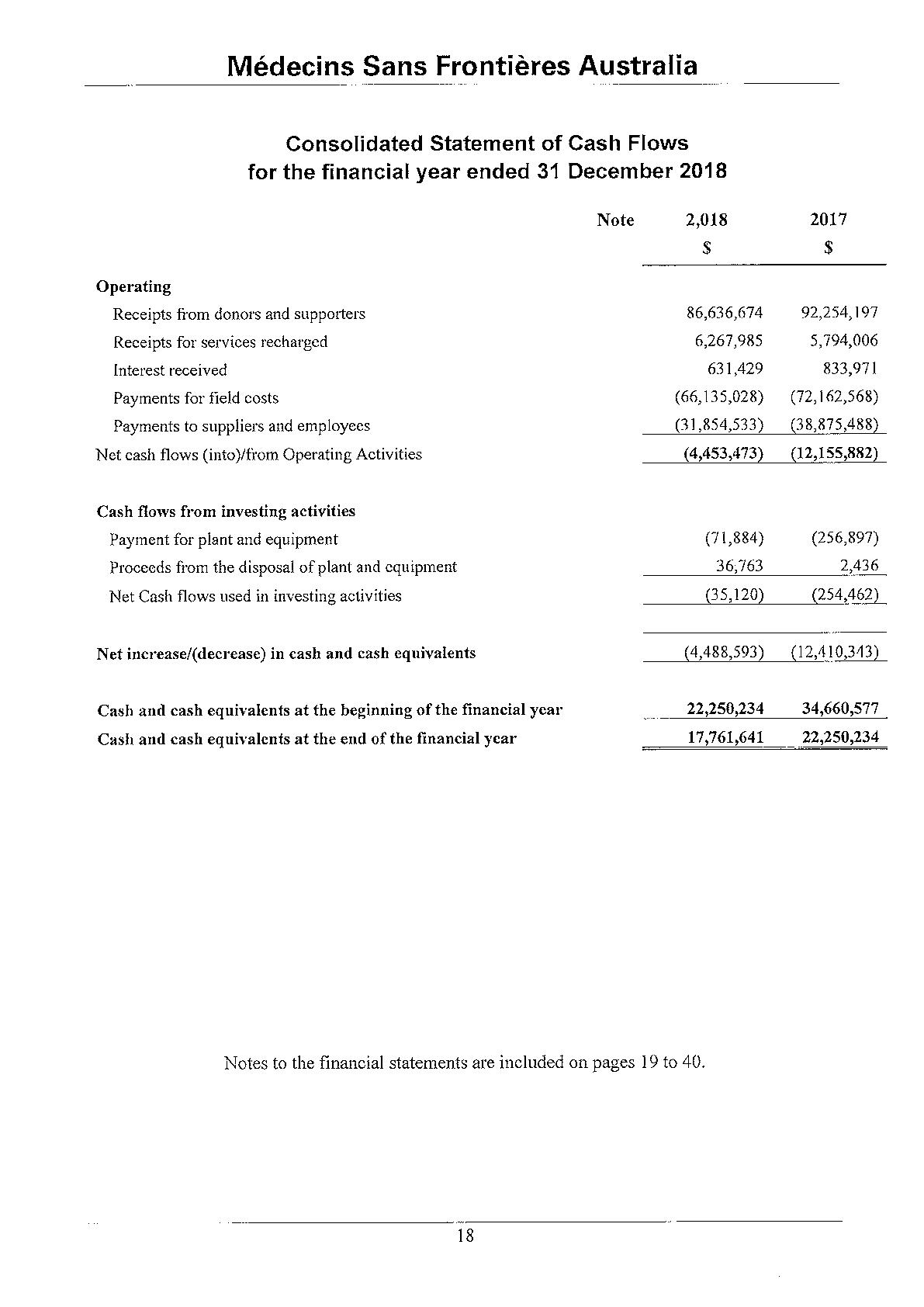
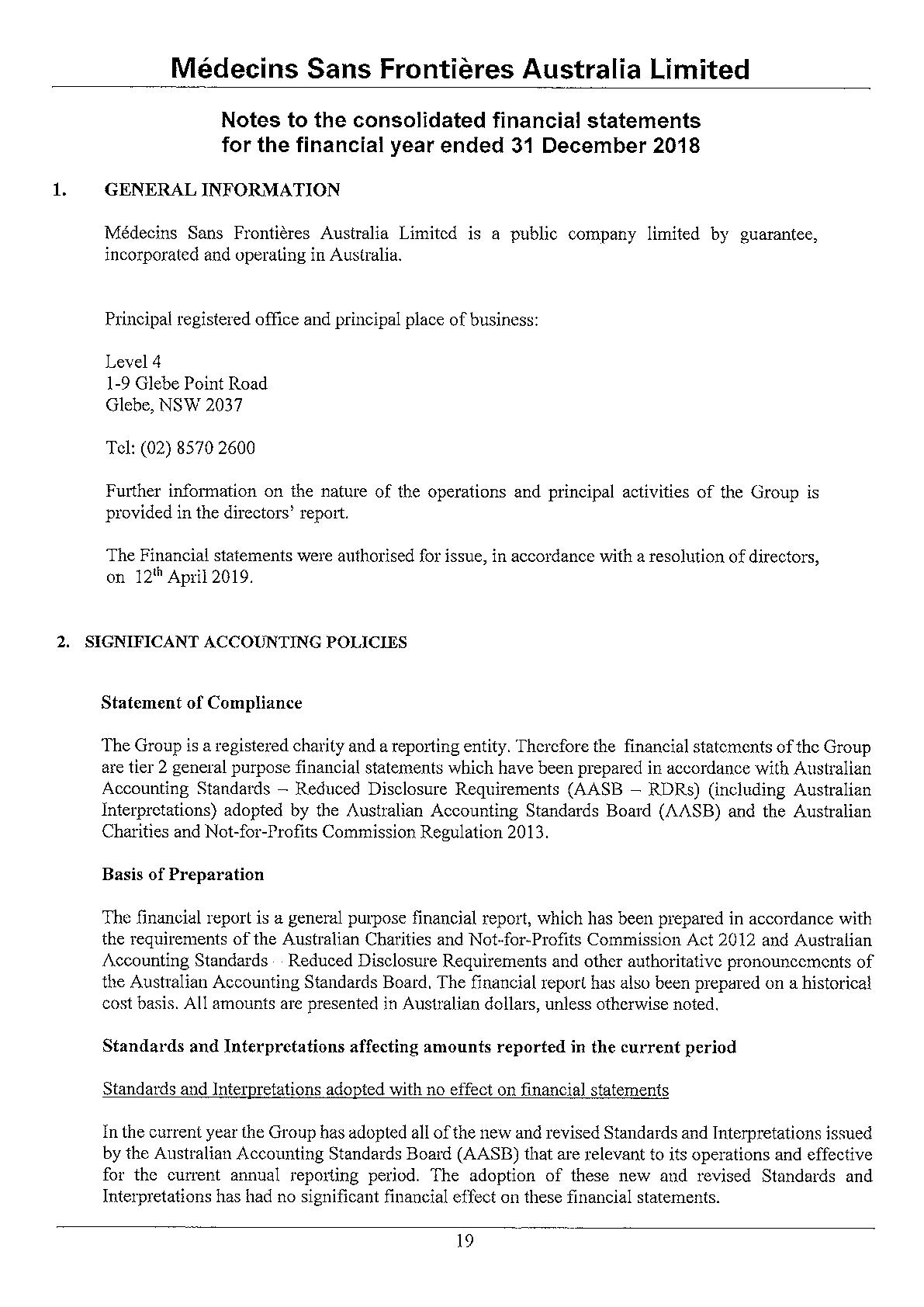
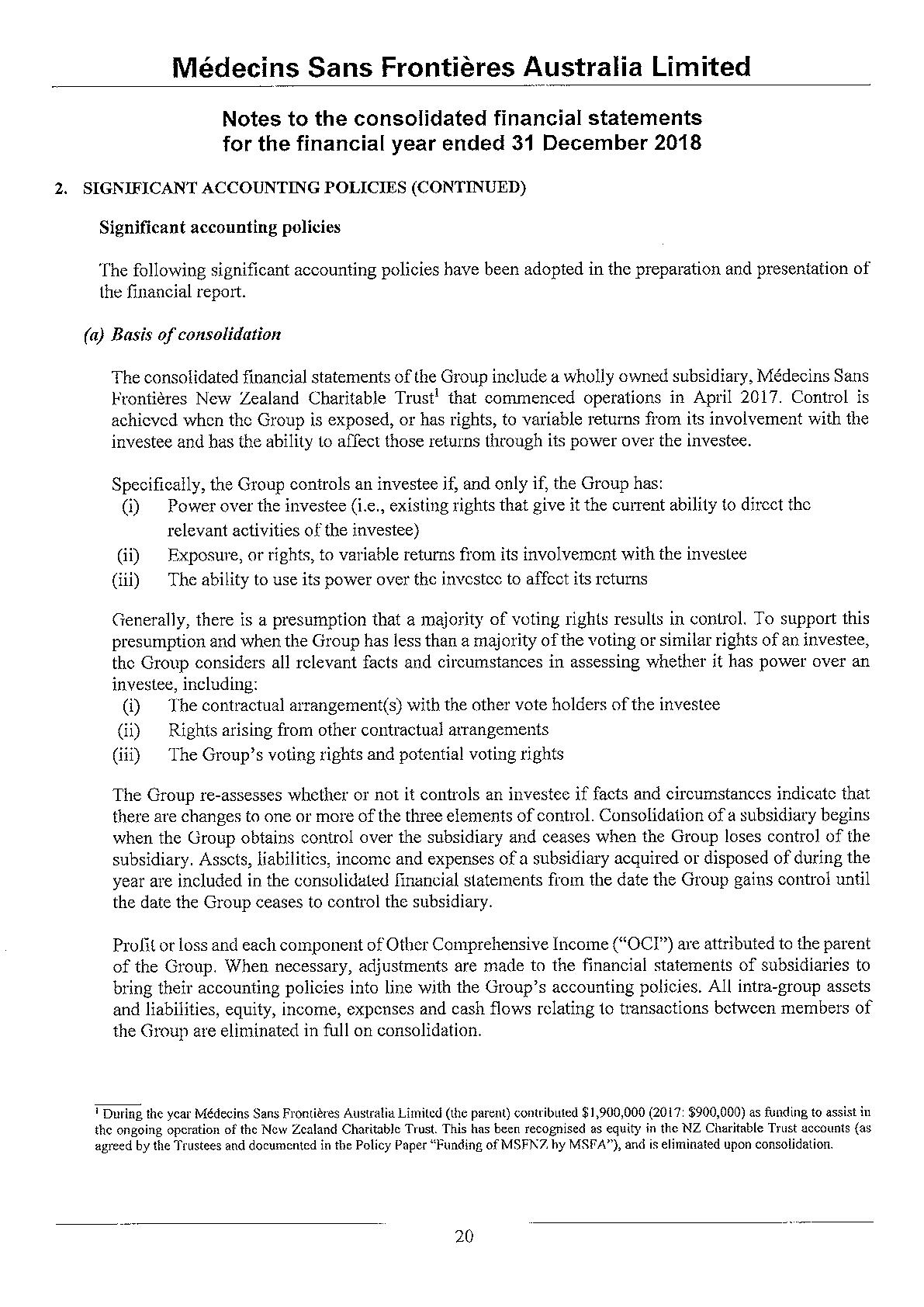
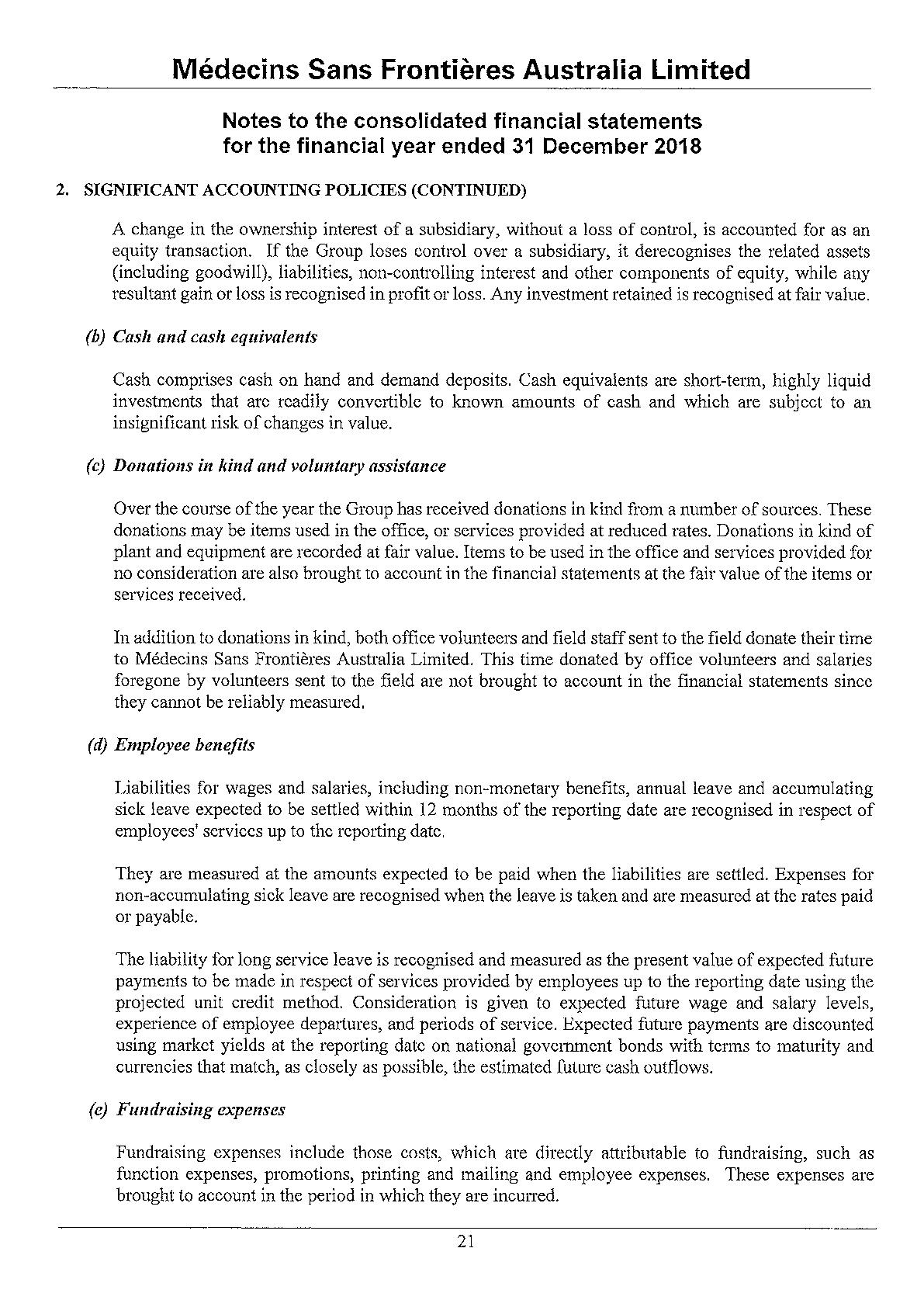
Field costs include expenses associated with remitting funds to our operational centres and the costs of deploying and paying our field staff.
Trade and other receivables, which comprise amounts due from Medecins Sans Frontieres International entities, GST recoverable and others, are recognised and can-ied at original invoice amount. The carrying amount of the receivable is deemed to reflect fair value. These receivables are non-interest bearing.
An allowance for doubtful debts is made when there is objective evidence that the Group will not be able to collect the debts. Bad debts are written off when identified.
The net amount of GST recoverable from, or payable to, the taxation authority is included as part of liabilities as a receivable.
Revenues, expenses and assets are recognised net of the amount of goods and services tax (GST), except:
1. where the amount of GST incu11'ed is not recoverable from the taxation authority, it is recognised as part of the cost of acquisition of an asset or as part of an item of expense; or
11. for receivables and payables which are recognised inclusive of GST.
Cash flows are included in the cash flow statement on a gross basis. The GST component of cash flows arising from investing and financing activities which is recoverable from, or payable to, the taxation authority is classified as operating cash flows.
Section 50-5 of the Income Tax Assessment Act provides that ce1iain bodies will be exempt from income tax. The Group is exempt from income tax in accordance with the Act; accordingly no provision for income tax has been recorded.
Leases are classified as finance leases when the terms of the lease transfer substantially all the risks and rewards incidental to ownership of the leased asset to the lessee. All other leases are classified as operating leases.
Operating lease payments are recognised as an expense on a straight-line basis over the lease term, except where another systematic basis is more representative of the time pattern in which economic benefits from the leased asset are consumed.
Lease incentives are received to enter into operating leases; such incentives are recognised as a liability. The aggregate benefits of incentives are recognised as a reduction of rental expense on a straight-line basis, except where another systematic basis is more representative of the time pattern in which economic benefits from the leased asset are consumed.
Trade payables and other accounts payable are recognised when the Group becomes obliged to make future payments resulting from the purchase of goods and services.
Plant and equipment and leasehold improvements are stated at cost less accumulated depreciation and impairment. Cost includes expenditure that is directly attributable to the acquisition of the item.
Depreciation is provided on plant and equipment and is calculated on a straight-line basis so as to write off the net cost of each asset over its expected useful life. Leasehold improvements are depreciated over the period of the lease or estimated useful life, whichever is the shorter, using the straight-line method. The estimated useful lives, residual values and depreciation method are reviewed at the end of each annual reporting period, with the effect of any changes recognised on a prospective basis.
The cmTying values of plant and equipment are reviewed for impairment at each reporting date, with recoverable amount being estimated when events or changes in circumstances indicate that the canying value may be impaired.
An item of plant and equipment is derecognised upon disposal, when the item is no longer used in the operations of the Group or when it has no sale value. Any gain or loss arising on derecognition of the asset (calculated as the difference between the net disposal proceeds and the canying amount of the asset) is included in profit or loss in the year the asset is derecognised.
Provisions are recognised when the Group has a present obligation (legal or constructive) as a result of a past event, it is probable that the Group will be required to settle the obligation, and a reliable estimate can be made of the amount of provision.
The amount recognised as a provision is the best estimate of the consideration required to settle the present obligation at reporting date, taking into account the risks and unceiiainties surrounding the obligation. Where a provision is measured using the cash flows estimated to settle the present obligation, its cmTying amount is the present value of those cash flows.
Revenue is measured at the fair value of consideration received or receivable. Revenue is recognised net of the amounts of goods and services tax (GST) payable to the Australia Taxation Office.
Donations collected, including cash and goods for resale, are recognised as revenue when the Group gains control, economic benefits are probable and the amount of the donation can be measured reliably.
Legacies and bequests are recognised when received.
Investment income mainly comprises interest income. Interest income is recognised as it accrues, using the effective interest method.
The gain or loss on disposal of all non-current assets is determined as the difference between the carrying amount of the asset at the time of disposal and the net proceeds on disposal.
The Group's consolidated financial statements are presented in Australian dollars, which is also the parent company's functional currency. For each entity, the Group dete1mines the functional currency and items included in the financial statements of each entity are measured using that functional cmTency. The Group uses the direct method of consolidation and on disposal of a foreign operation, the gain or loss that is reclassified to profit or loss reflects the amount that arises from using this method.
Transactions in foreign currencies are initially recorded by the Group's entities at their respective functional cmTency spot rates at the date the transaction first qualifies for recognition.
Monetary assets and liabilities denominated in foreign currencies are translated at the functional cmTency spot rates of exchange at the reporting date.
Differences arising on settlement or translation of monetary items are recognised in profit or loss with the exception of monetary items that are designated as part of the hedge of the Group's net investment in a foreign operation. These are recognised in OCI until the net investment is disposed of, at which time, the cumulative amount is reclassified to profit or loss. Tax charges and credits attributable to exchange differences on those monetary items are also recorded in OCI.
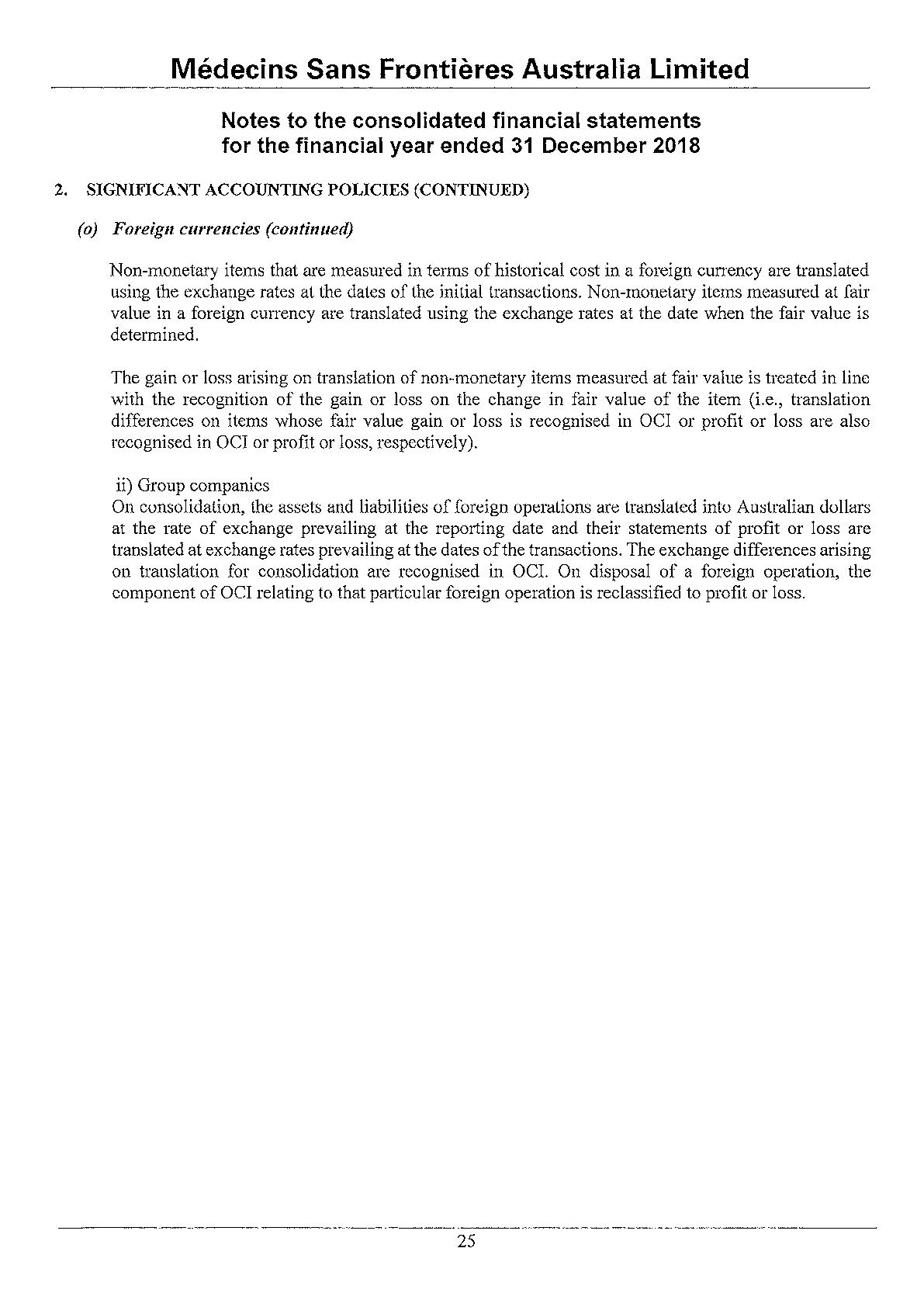
The application of Australian Accounting Standards requires making judgments, estimates and assumptions to be made about catTying values of assets and liabilities that are not readily apparent from other sources. The estimates and associated assumptions are based on historical experience and various other factors that are believed to be reasonable under the circumstance, the results of which form the basis of making the judgments. Actual results may differ from these estimates.
The estimates and underlying assumptions are reviewed on an ongoing basis. Revisions to accounting estimates are recognised in the period in which the estimate is revised if the revision affects only that period, or in the period of the revision and future periods if the revision affects both cmTent and future periods.
The following are the critical judgements that management has made that have the most significant effect on the amounts recognised in the financial statements:
1. Provisions for employee benefits - Management judgement is applied in determining the future increase in wages and salaries, future on cost rates and experience of employee departures and expected period of service. Refer to Note 11 for further details.
11. Make good provisions - Provisions for future costs to retum ce1iain leased premises to their original condition are based on the Group's past experience with similar premises and estimates of likely restoration costs. These estimates may vary from the actual costs incutTed as a result of conditions existing at the date the premises are vacated.
The above judgements are considered to have a significant effect on the accounts and the basis of estimation are included within Note 2.
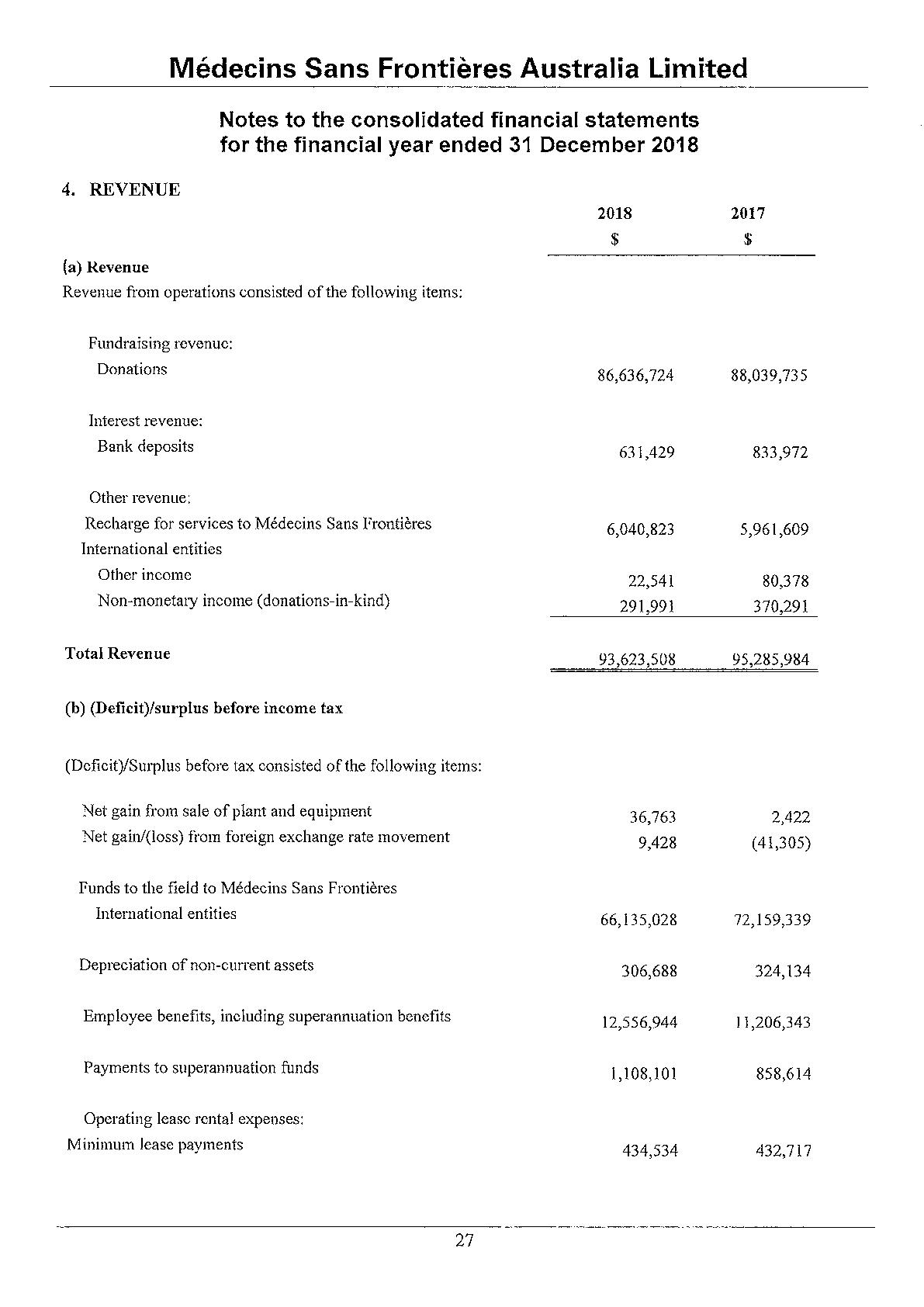
The directors and other members of key management personnel of Medecins Sans Frontieres Australia Limited during the year were
D r Stewart Condon (President non-executive)
Mr Dwin Tucker (Treasurer, non-executive)
Ms Beth Hilton Thorp (non-executive)
Ms Katrina Penney (non-executive)
Mr Anthony Flynn (non-executive)
Dr Chatu Yapa (non-executive), Elected 25 May 2018
Mr Emmanuel Lavieuville (non-executive), Elected 25 May 2018
Dr Meguerditch Tarazian (non-executive)
Dr Matthew Reid (non-executive), Resigned 25 May2018
Dr Philip Humphris (non-executive), Resigned 25 May 2018
Dr Jacqueline Hewitt (non-executive)
Ms Patricia Schwerdtle (non-executive)
Mr Paul McPhun (Executive Director and Company Secretaty)
Mr Wan-ick Saunders (Head ofFundraising)
Dr Myrta Schaefer (Head of Medical Unit)
Mr Robin Sands (Head ofField Human Resources)
Ms Melanie Triffitt (Head ofFinance & Administration and Company Secretaty)
Ms Shereena-Lee Van De Berkt (Head of Domestic Human Resources)
Mr Jonathan Edwards (Head of Advocacy)
Mr Jean-Christophe Nougaret (Head of Communications)
Besides the President, the directors provide their services on a voluntaty basis. During the course of their duties, business expenses incurred by the directors were reimbursed (Note 15). The aggregate compensation of the key management personnel of the Group is set out below:
Key Management Remunerations (excluding the Board President)
President of the Board Remuneration
The auditor of the Group is Ernst & Young Australia .
Amounts received or due and receivable by Ernst & Young Australia for:
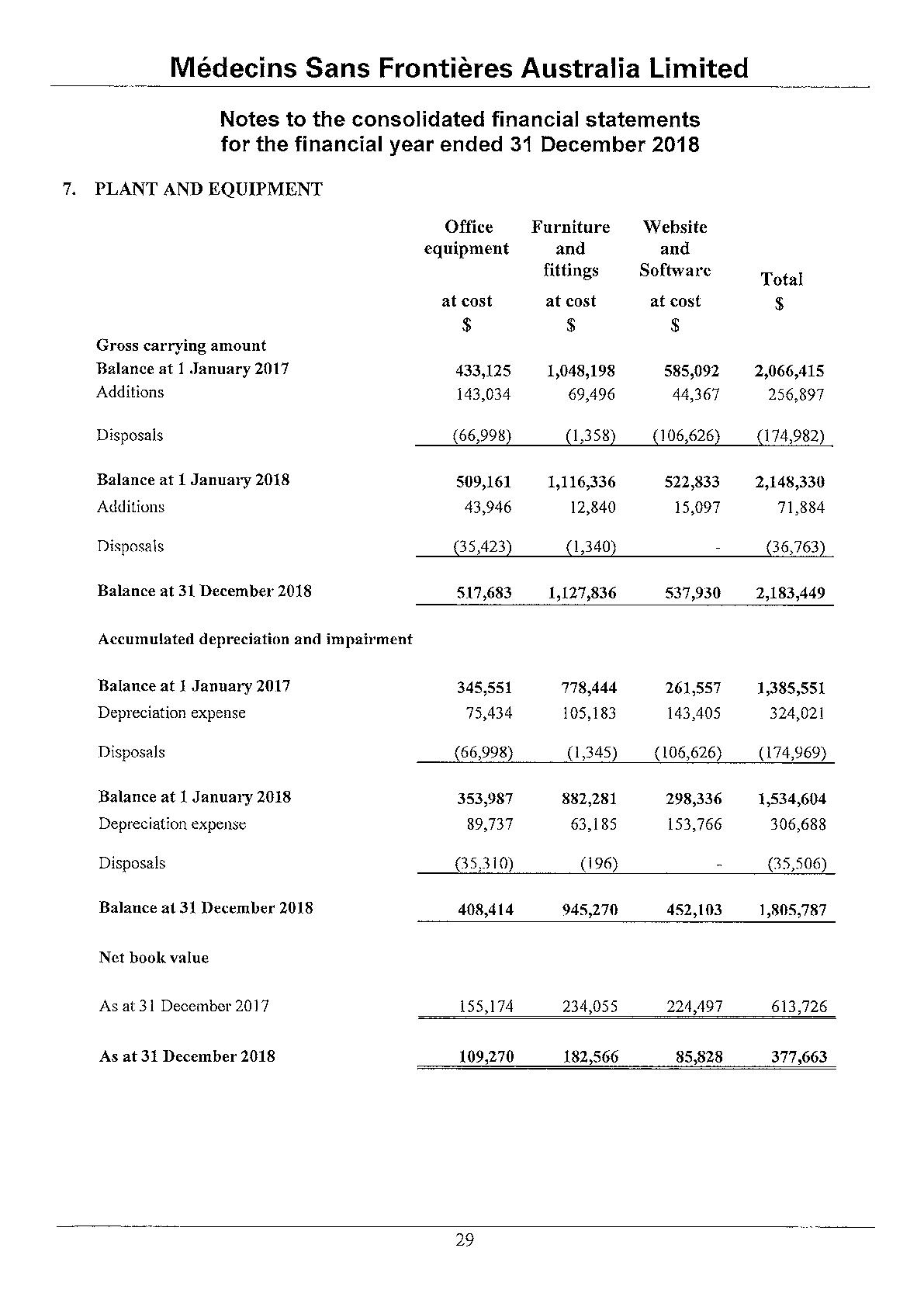
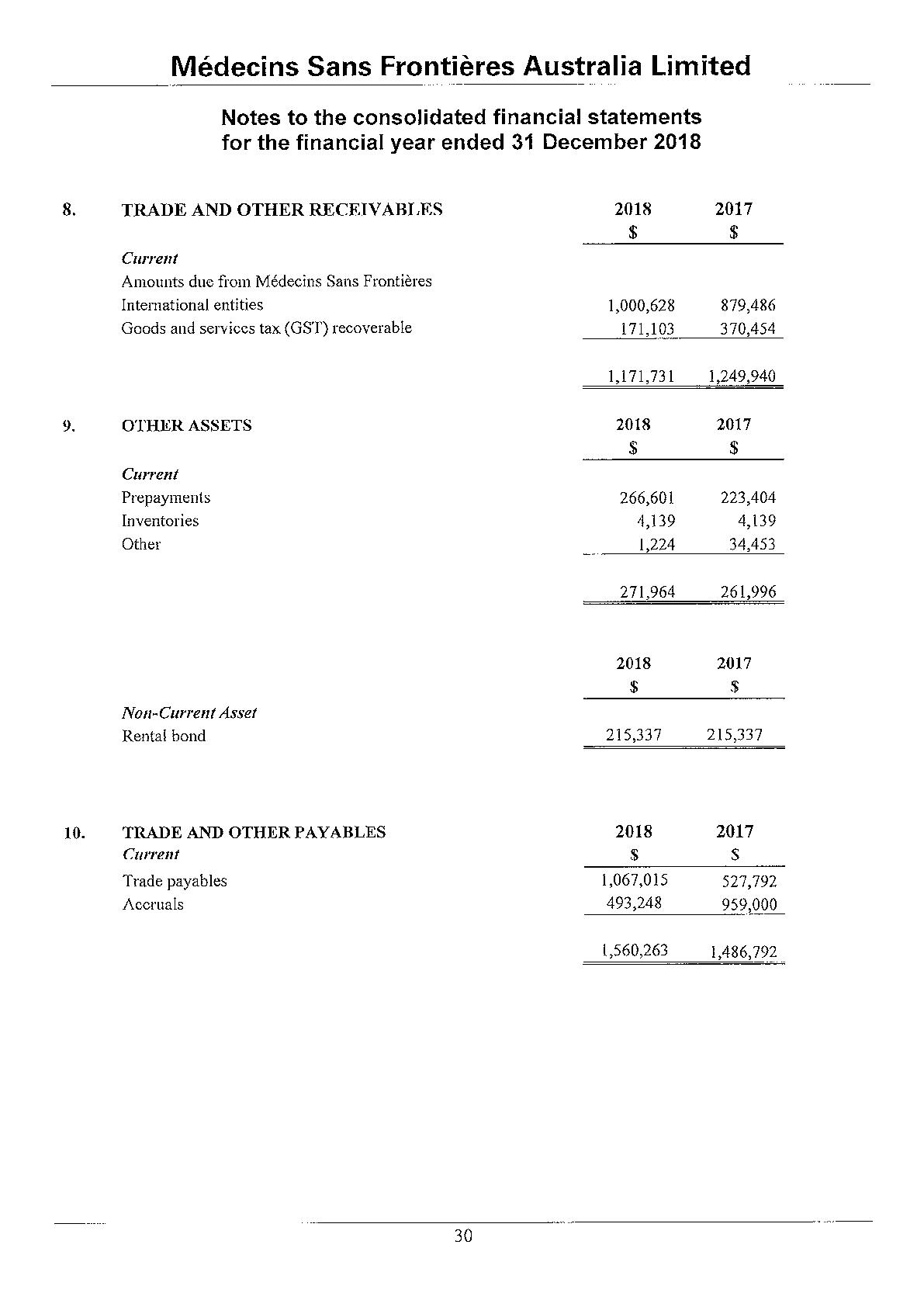
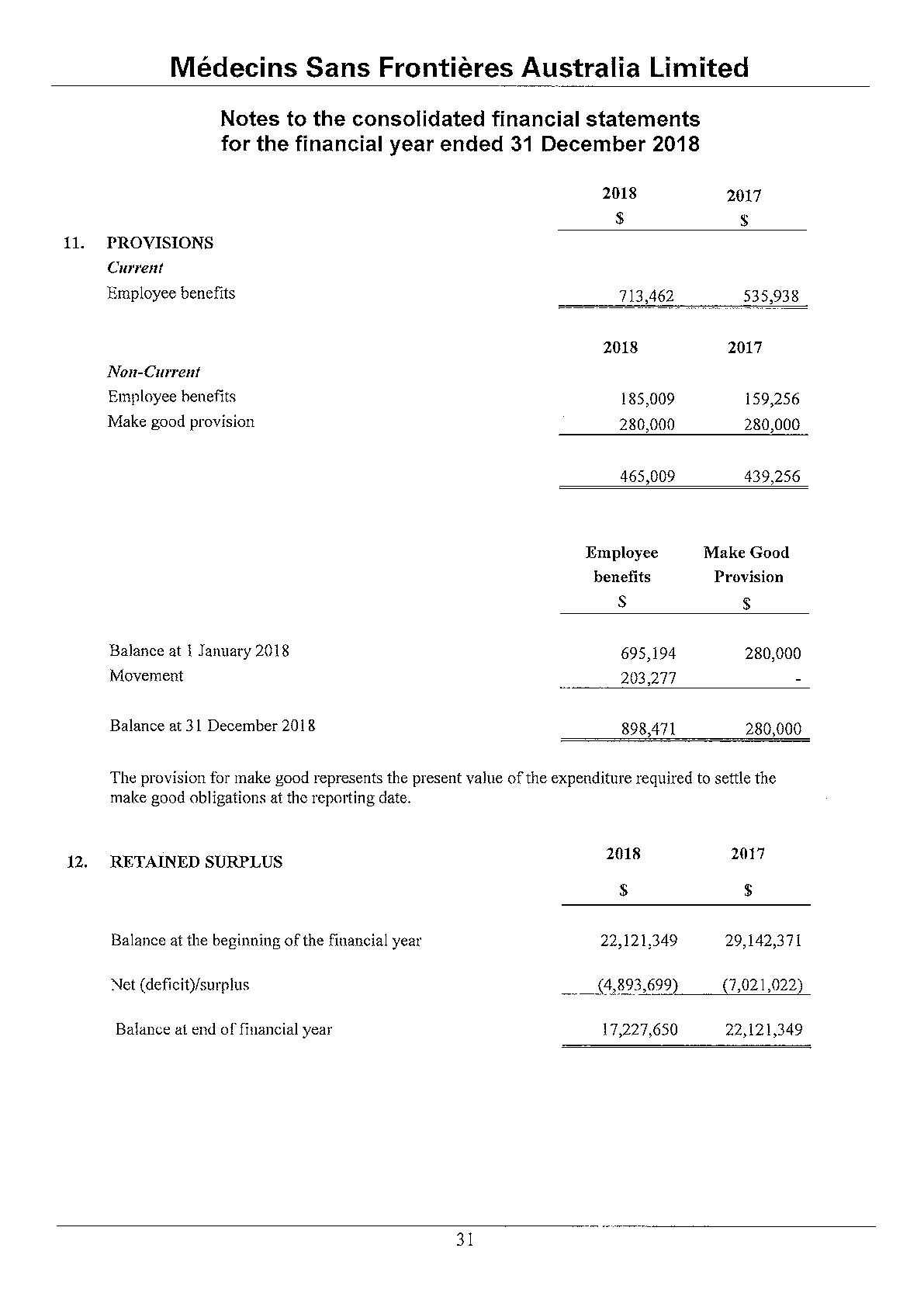
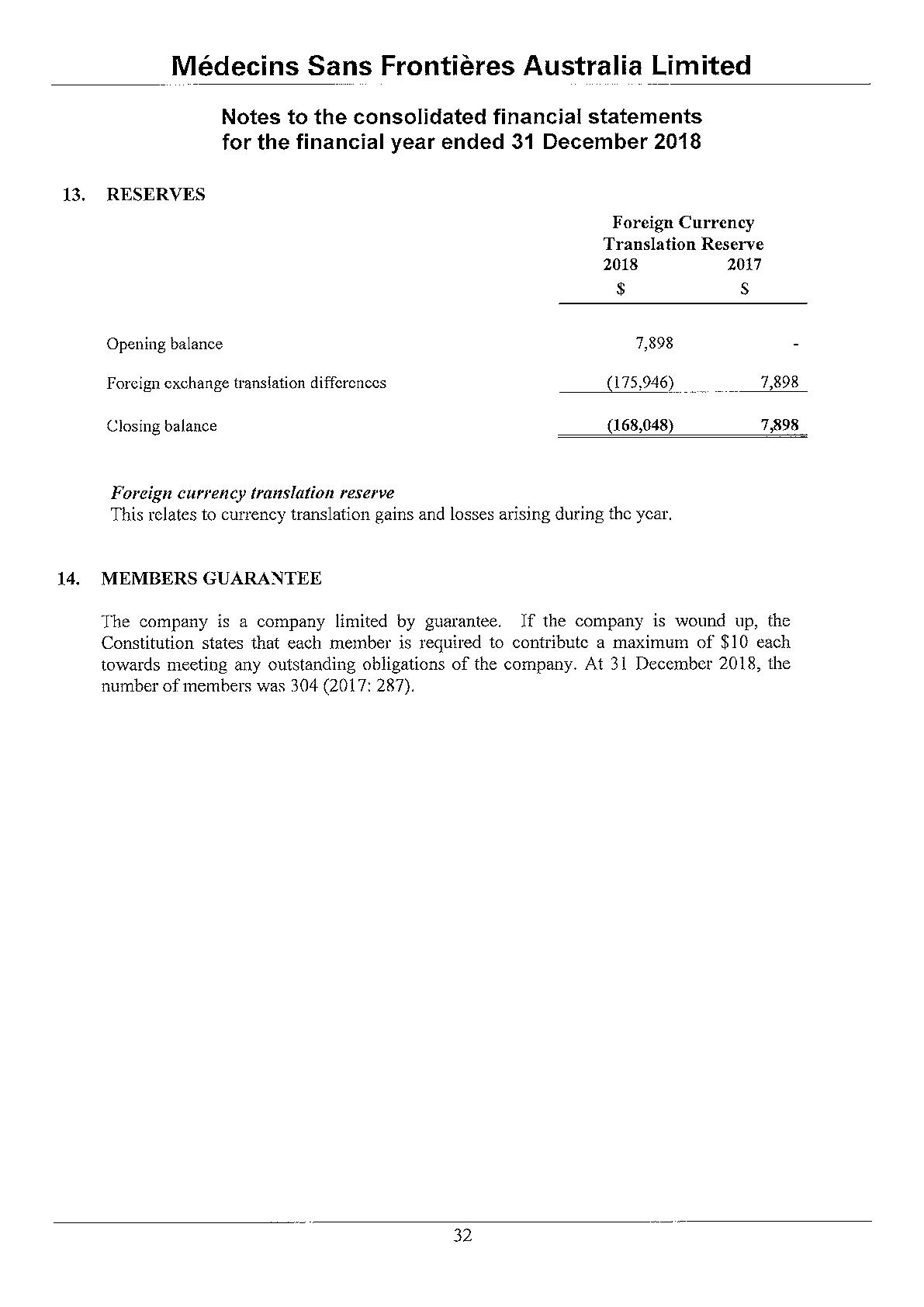
Group Information
The consolidated financial statements of the Group include Medecins Sans Frontieres New Zealand Charitable Trust which is deemed controlled by the Company that commenced operations in April 2017.
Medecins Sans Frontieres Australia Limited provides services to and receives services from Medecins Sans Frontieres International entities.
The board of Medecins Sans Frontieres Australia Limited approved the reimbursement of the following business expenses incurred by the directors of the company in the course of their duties as a Director during the year.
There has not been any matter or circumstance that has arisen since the end of the financial year that has significantly affected, or may significantly affect, the operations of the Group, the results of those operations, or the state of affairs of the Group in future financial years.
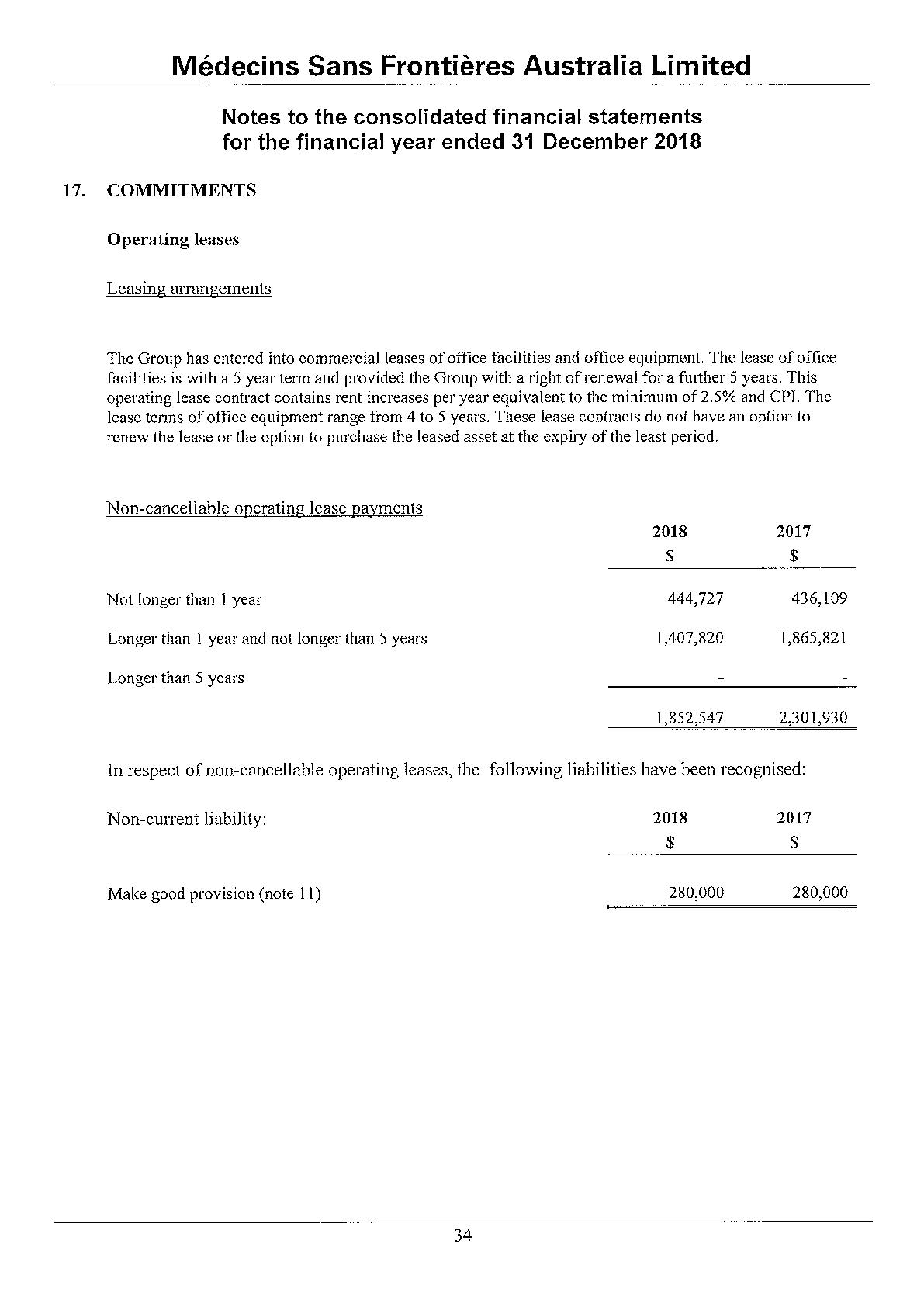
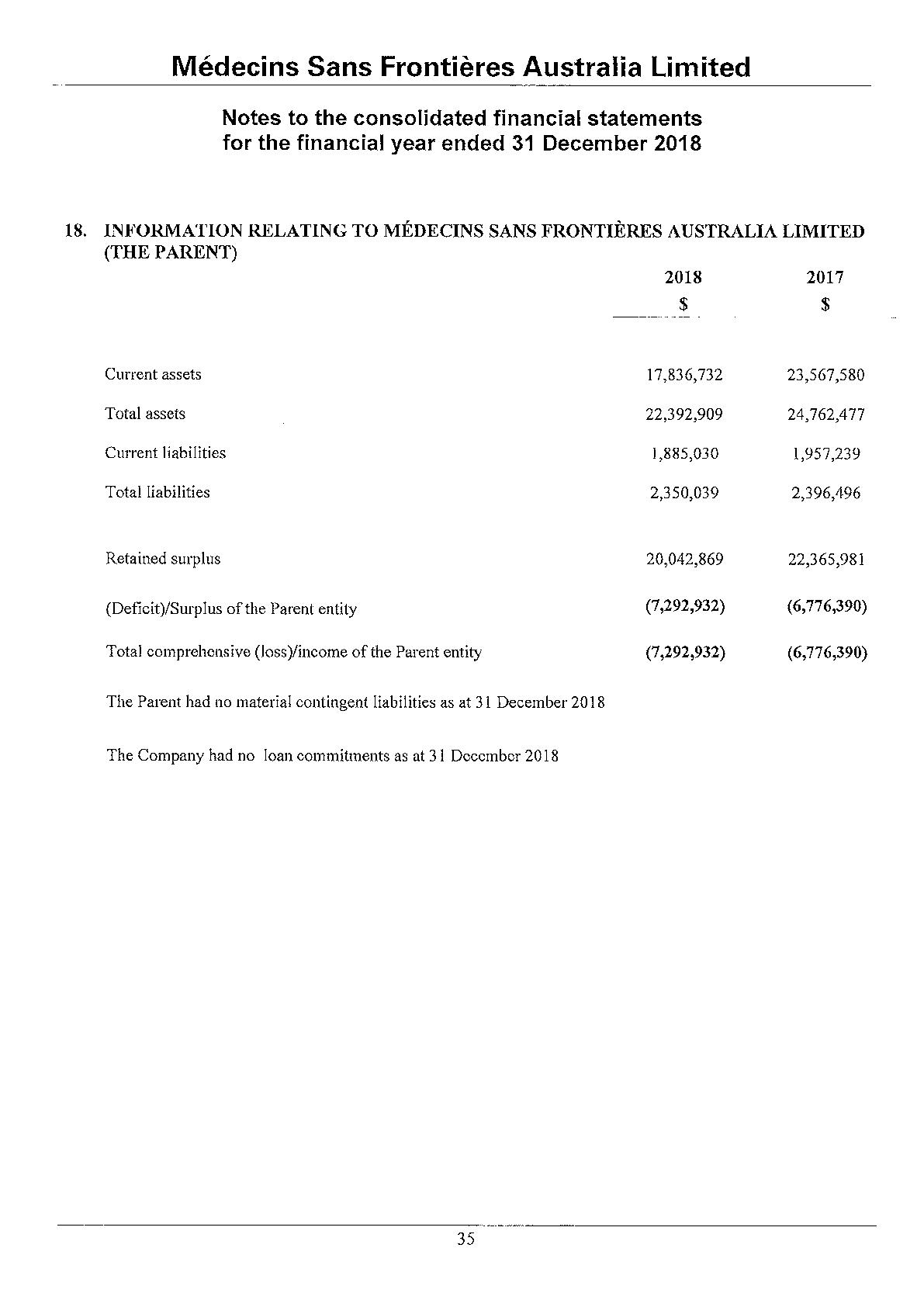

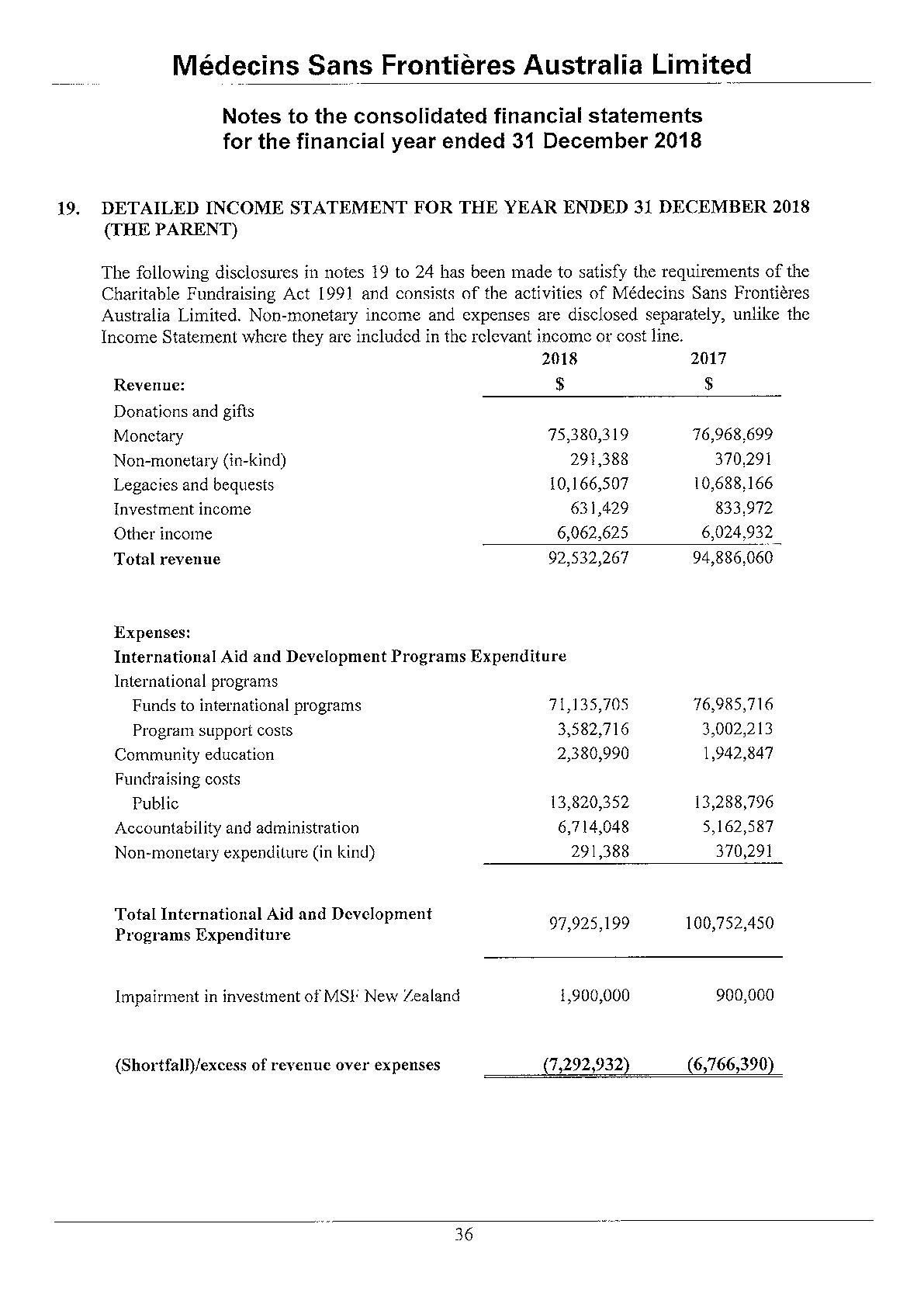
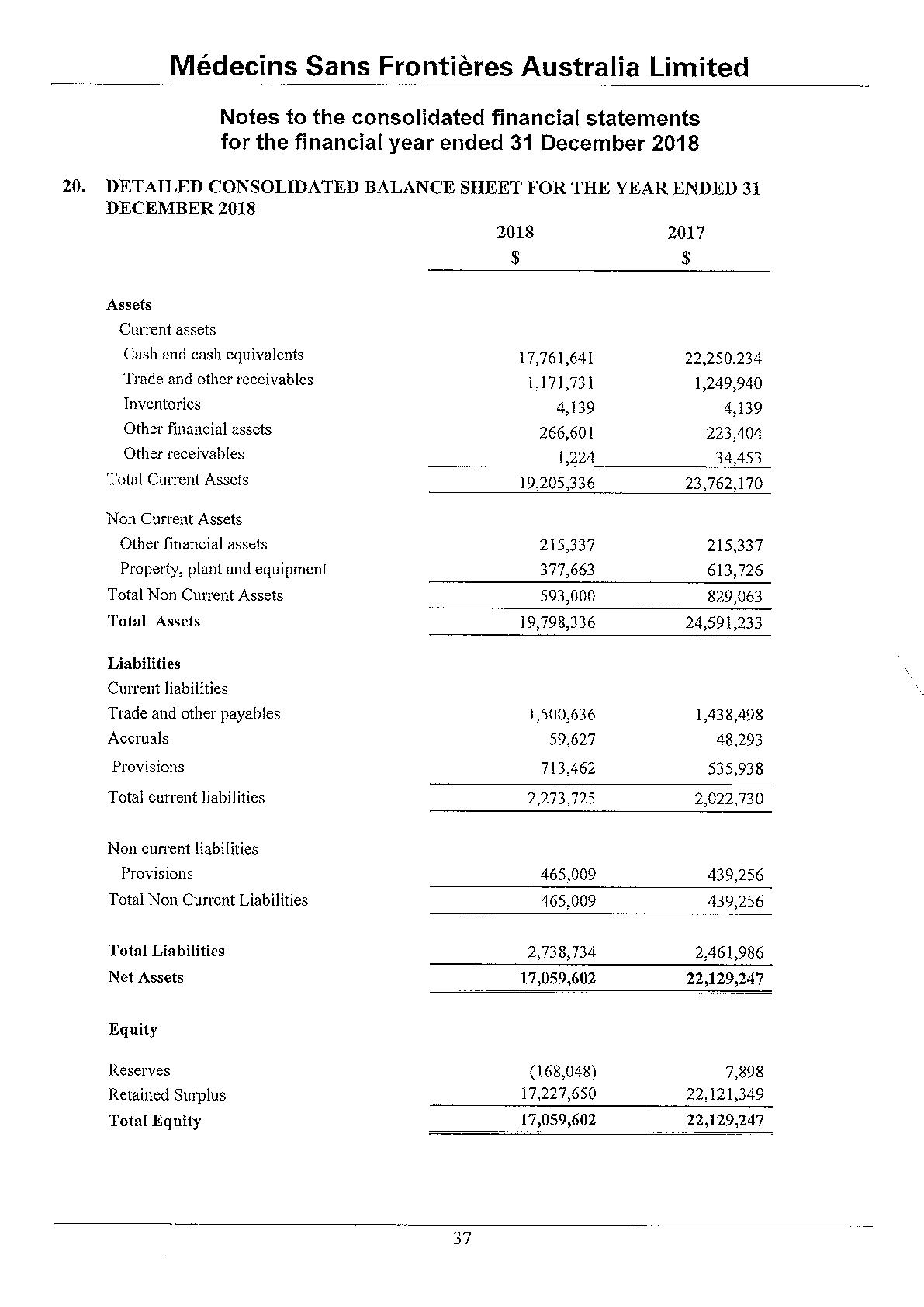
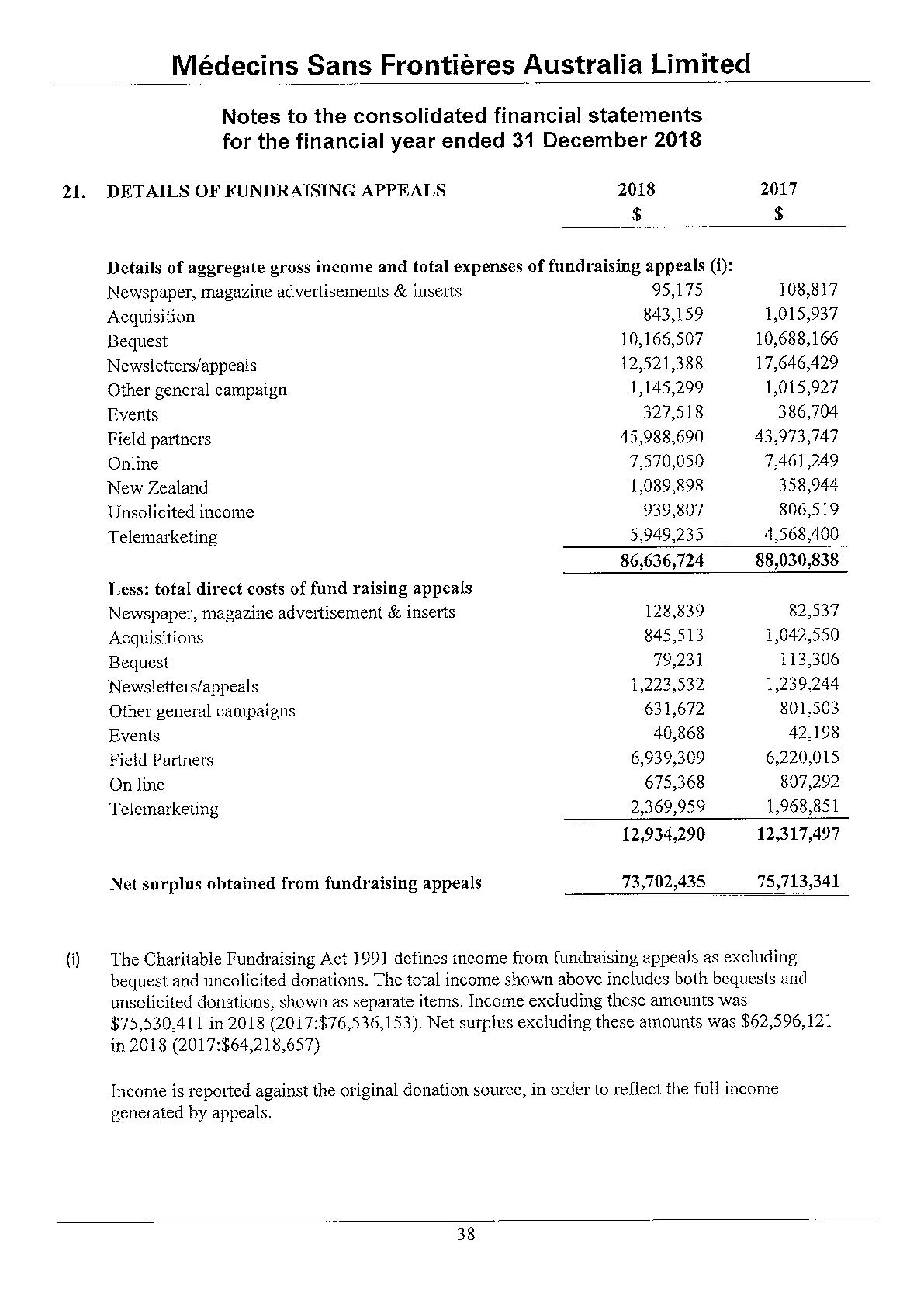
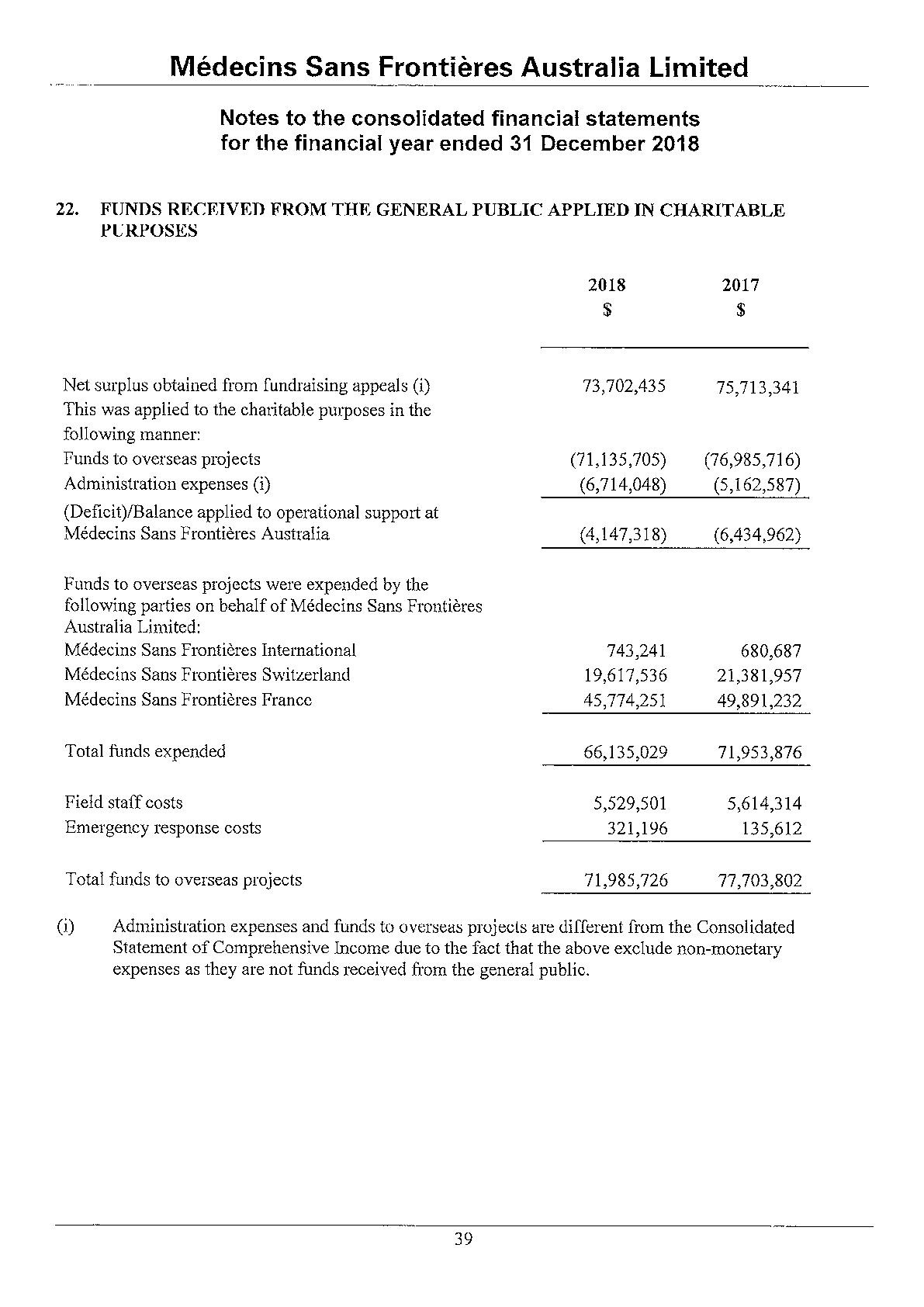
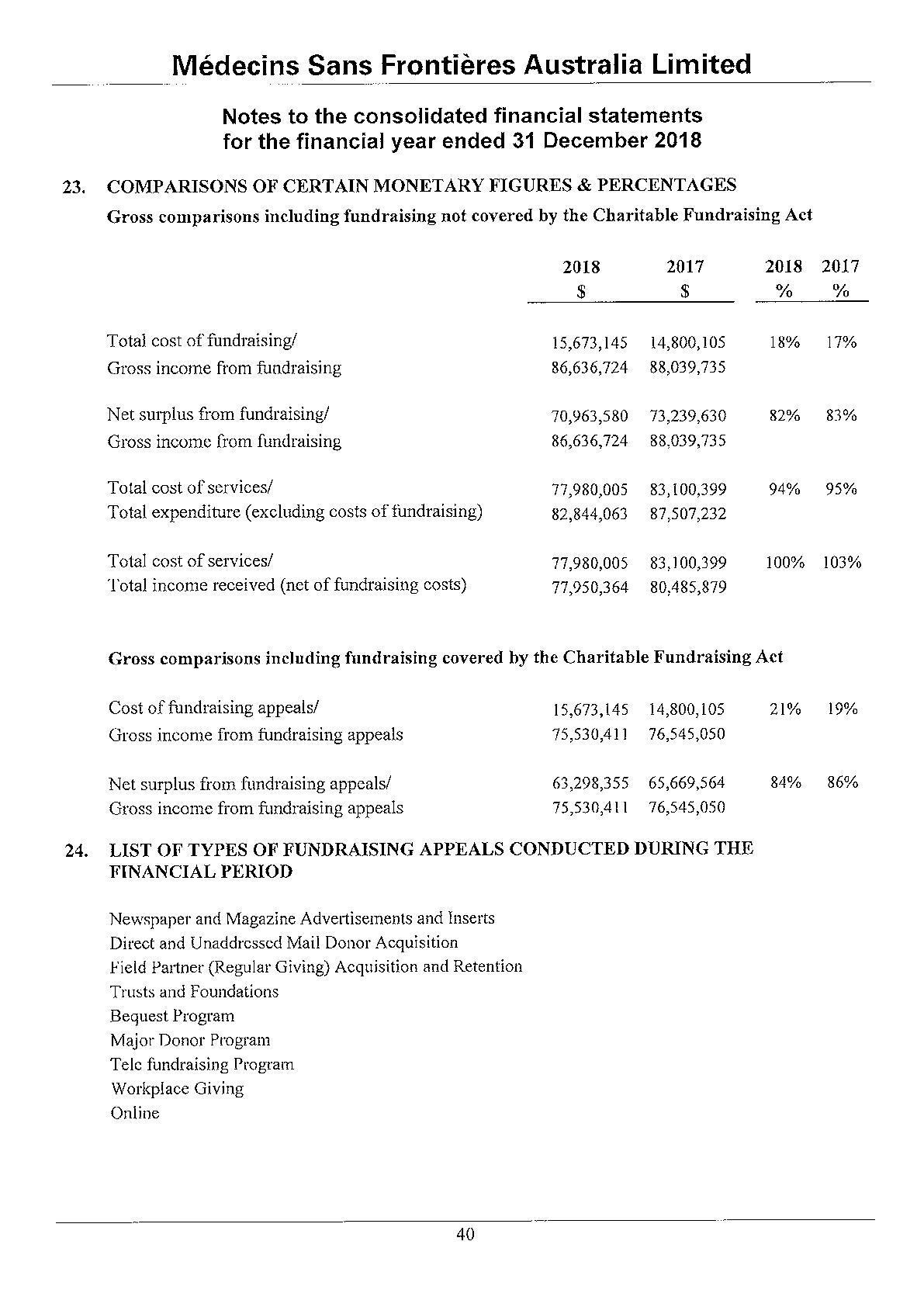
Médecins Sans Frontières Australia
ABN 74 068 758 654
PO Box 847, Broadway NSW 2007, Australia
Phone: +61 2 8570 2600 1300 136 061
Fax: +61 2 8570 2699
Email: office@sydney.msf.org
© 2019 Médecins Sans Frontières Australia
www.msf.org.au